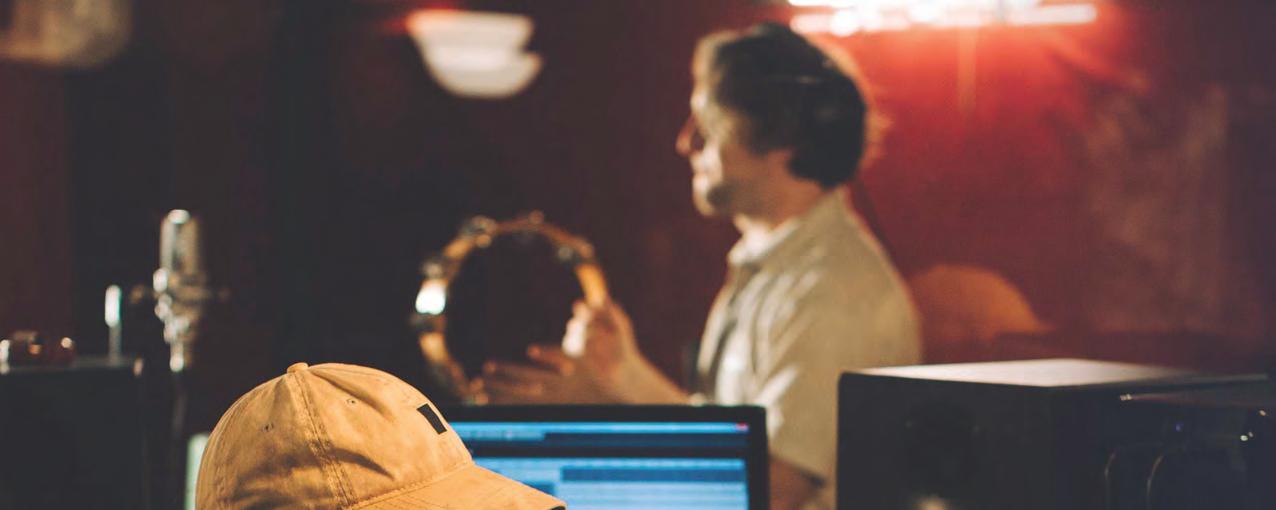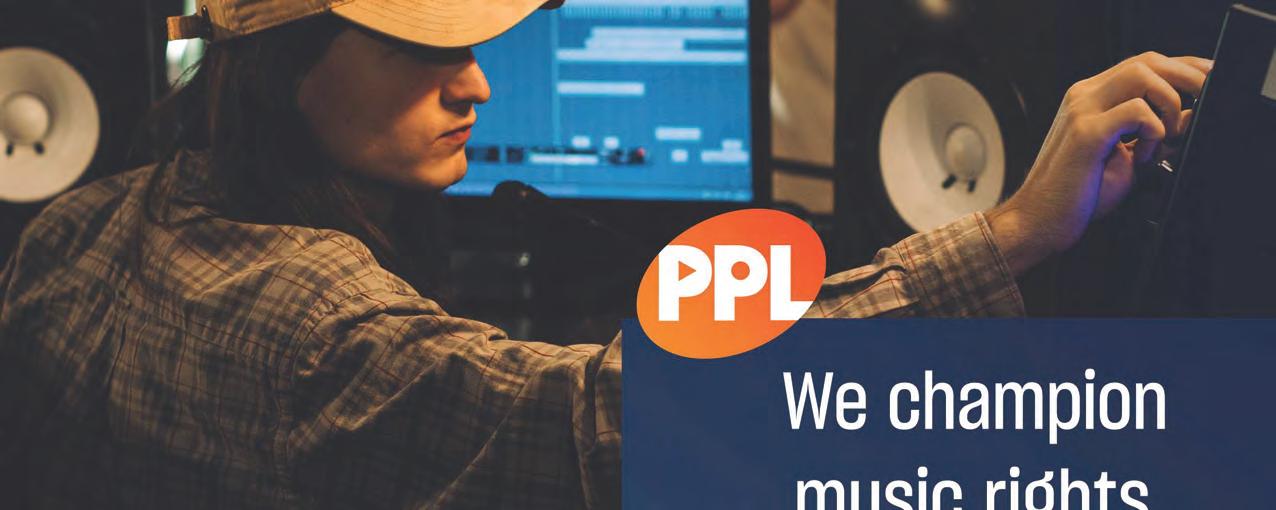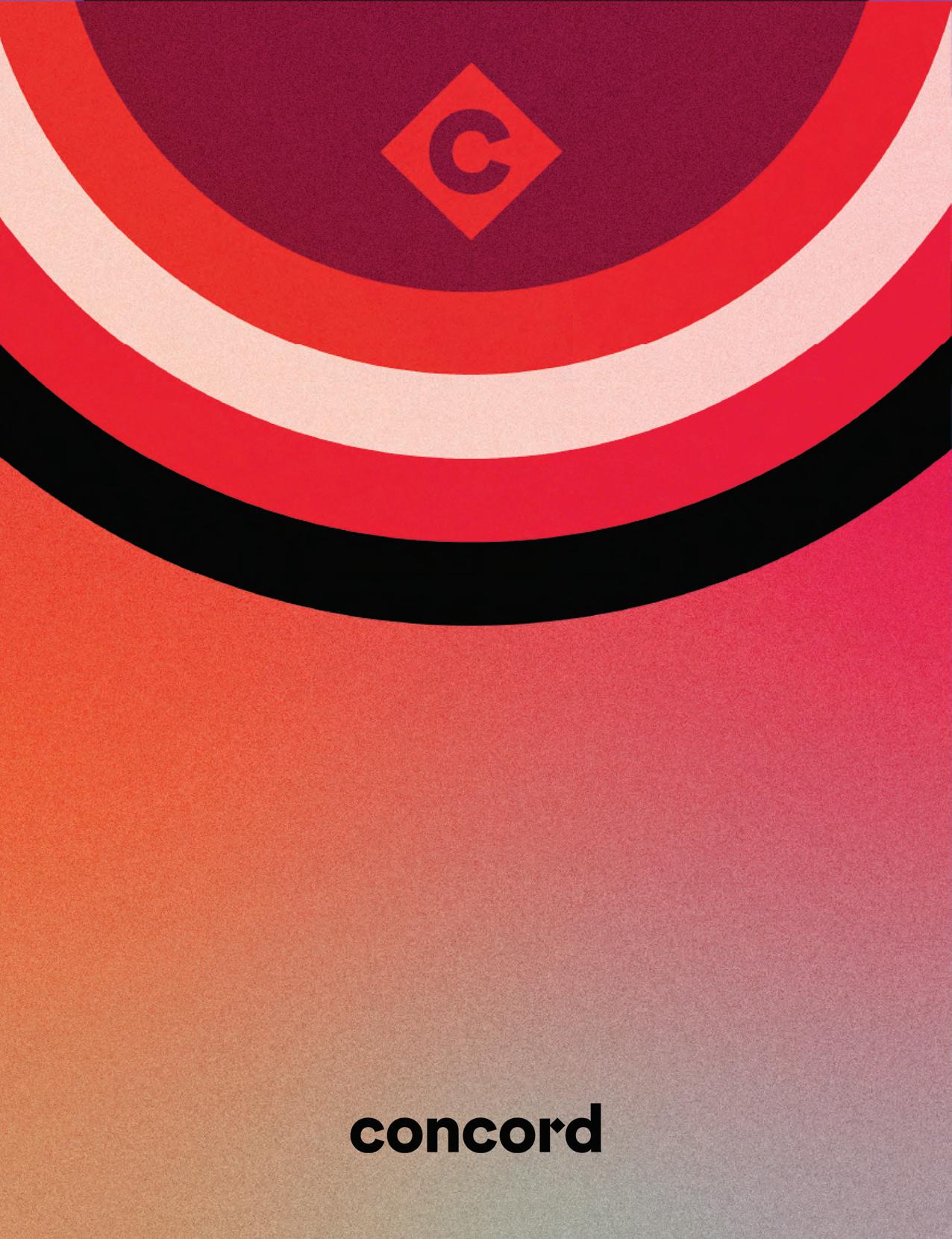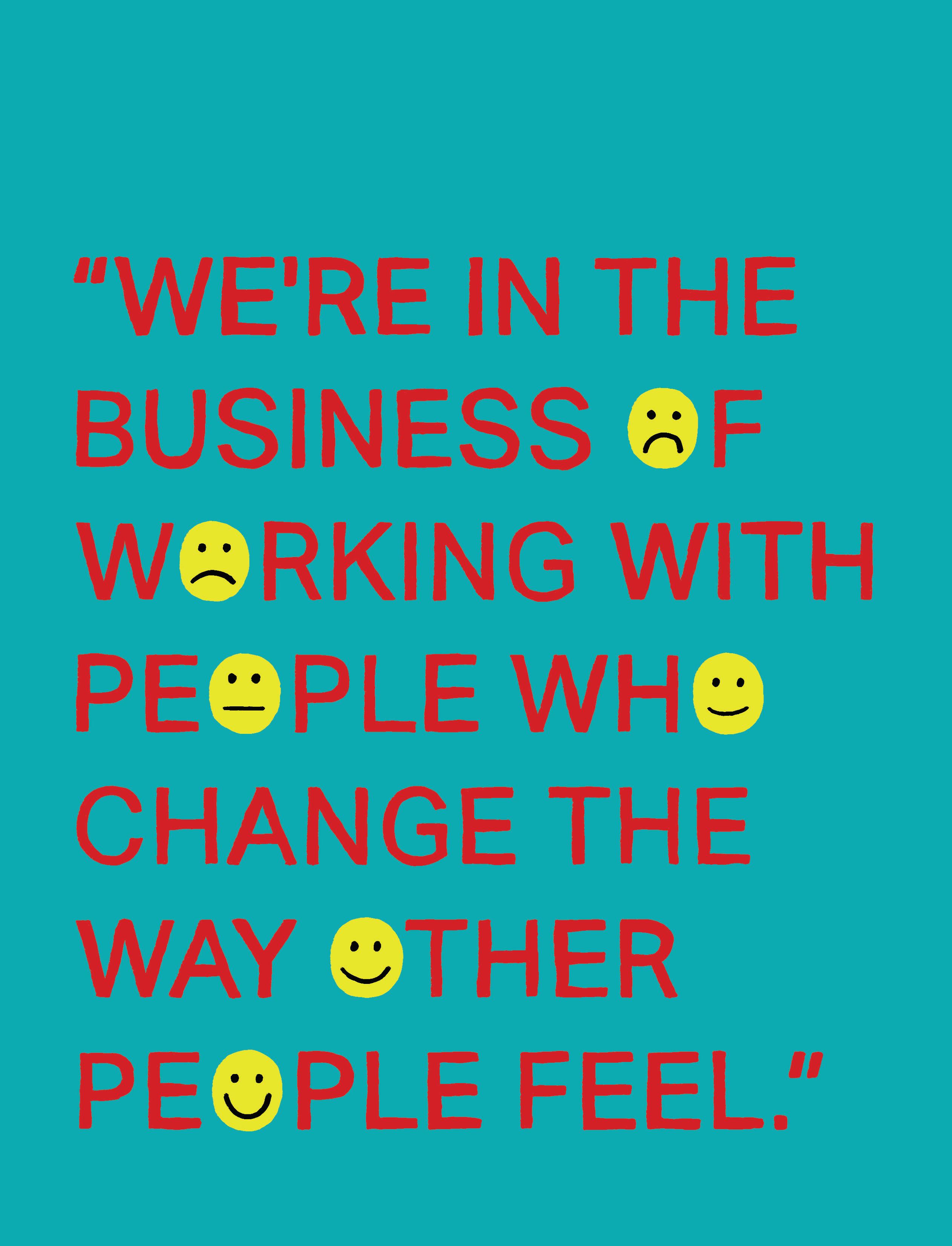

OZZY FOREVER.
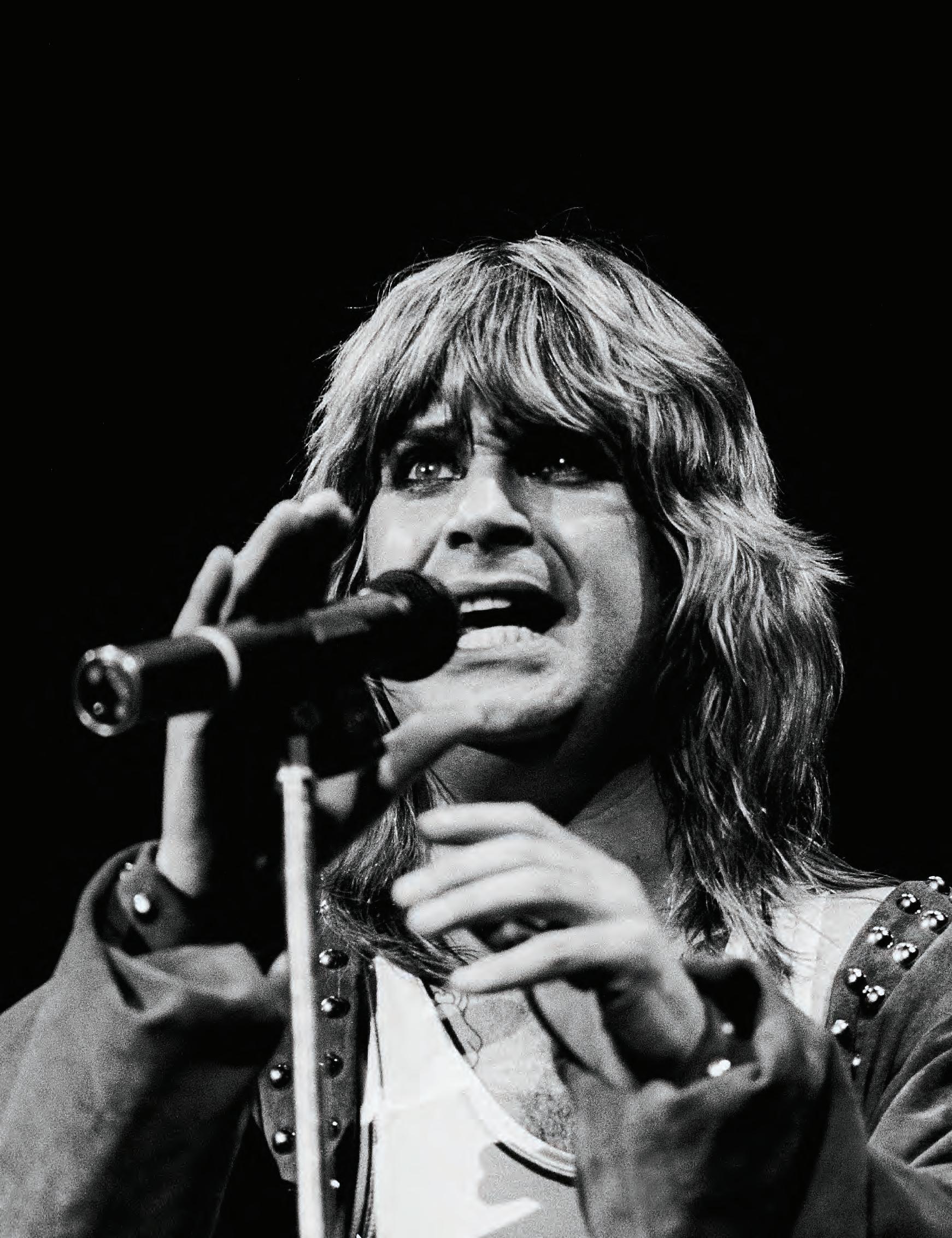

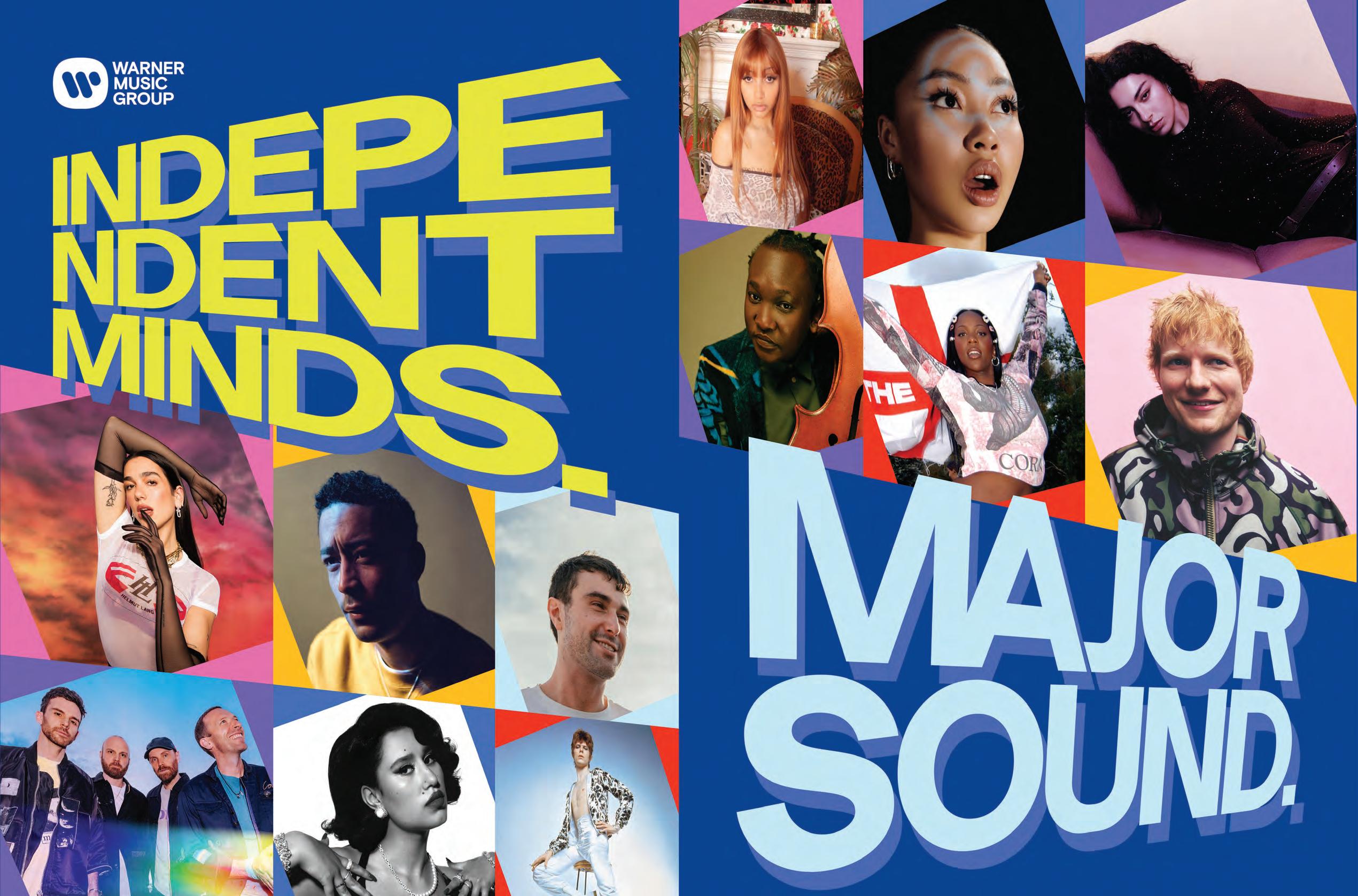




CELEBRATE
BLACK HISTORY MONTH
CHAMPIONING BLACK VOICES ALL YEAR ROUND


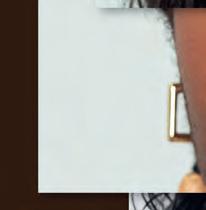




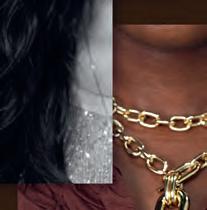










WE HONOUR THE LEGACY WE CREATE THE CHANGE WE MOVE THE CULTURE
Contributors
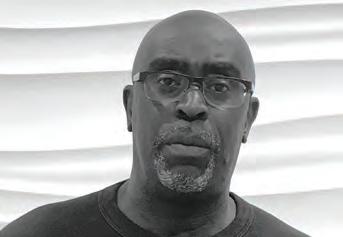
Adrian Sykes is a widely-respected UK music industry veteran who, amongst many other things, founded Decisive Management – which steered Emeli Sandé to the peak of her success. In this issue he speaks to Ammo Talwar, a key figure in the Birmingham music scene and the Chair of UK Music’s Diversity taskforce.

Mark Sutherland has been covering the music business for over 25 years. He is a Variety columnist and writes for publications including Rolling Stone and Kerrang!. He was previously Editor of UK trade title Music Week. In this issue, he talks to Sleep Token manager Ryan Richards as well as Martin Goldschmidt and Rob Collins at Cooking Vinyl.

Alex Robbins is a renowned British illustrator whose work has previously appeared on the likes of the New Yorker, Time Out, Wired, TIME and i-D. Oh, and Music Business UK. He has once again created our cover image. For this issue of MBUK he visualises some wise words from the subject of our lead interview, Peter Edge.

Murray Stassen is the Editor of Music Business Worldwide and a regular contributor to Music Business UK. Stassen, has previously written for the likes of VICE, The Line Of Best Fit, Music Week, and Long Live Vinyl. In this issue, Stassen takes a deep dive into five numbers behind the biggest stories and trends of the past quarter.

MBUK columnist Eamonn Forde has been writing about the music business since 2001. He contributes to The Guardian, Music Business Worldwide, IQ and The Quietus among other titles. His new book, 1999: The Year The Record Industry Lost Control, is out now. This month he muses on the possibility of mediation preventing band break-ups.

MBUK’s newest columnist Sammy Andrews is a leading figure in the global music industry, renowned for her expertise and vision across digital strategy, marketing and technology. In her latest column she takes a fresh look at AI, suggesting that whilst it is of course sending seismic tremors through the industry it is also exposing some pretty severe fault lines that already existed.
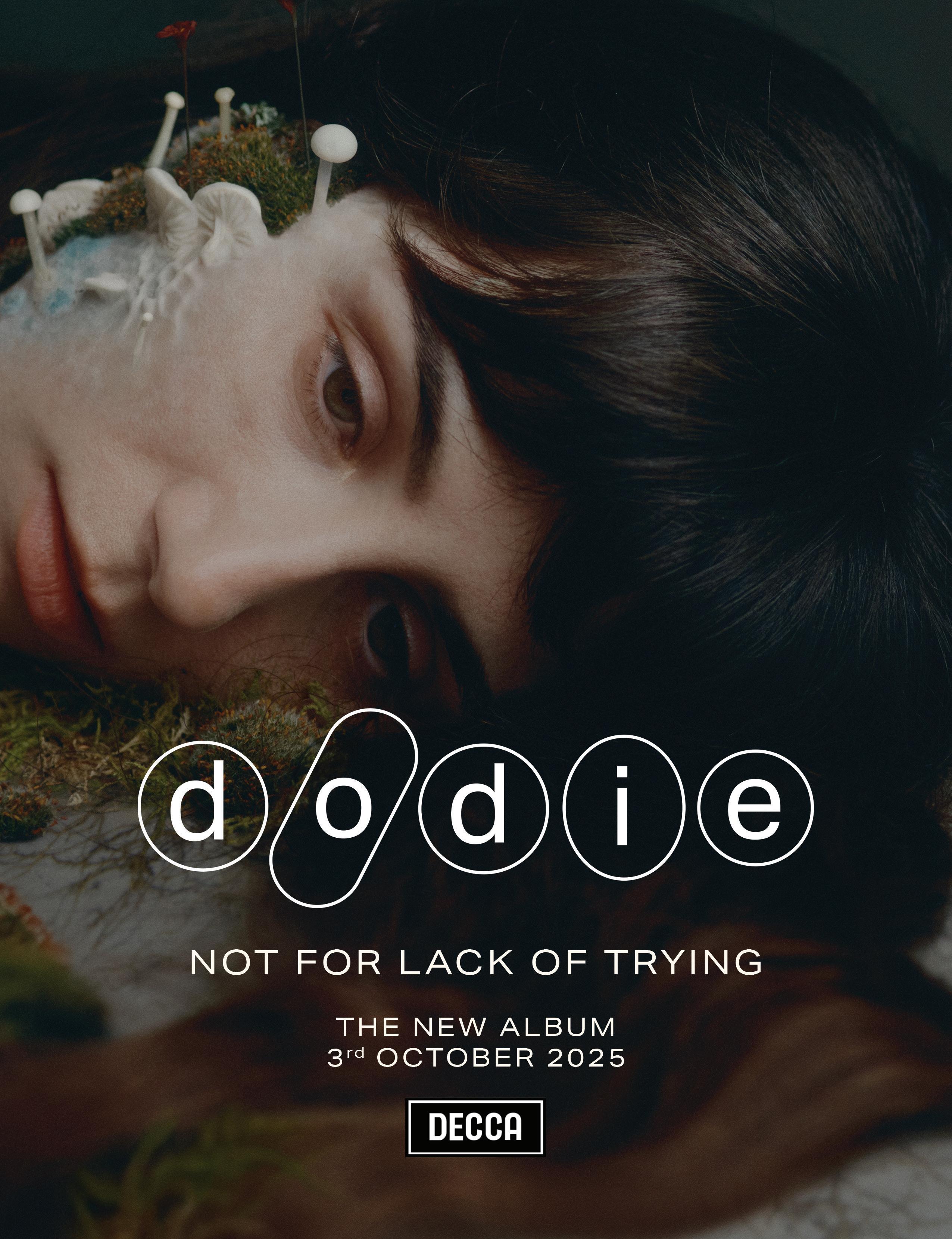
FOUNDER’S LETTER
There’s a thread running through this issue of Music Business UK that cuts straight to the heart of what makes music still matter in 2025. It’s about the stubborn refusal to chase the obvious – and how that contrarian instinct is quietly reshaping the industry.
Take Sleep Token. Streaming consultants might tell you that metal bands need to pick a lane: be heavy or be melodic, not both. That the algorithm doesn’t do sonic mongrels. Yet manager Ryan Richards describes a band that deliberately defies categorization: “There’s as much pop, R&B, electronic and piano-led music as there is heavy guitar” in their sound. The result? A Billboard 200 No.1 and the biggest US streaming week for a hard rock band ever. “It’s not a metal band: it’s just an artist painting with many colours,” Richards explains.
Peter Edge at RCA has built his entire philosophy around this principle. While others chase algo-pleasing obviousness, Edge leans into that element of surprise. “I’ve always been attracted to things that seem unlikely,” he says. “Music is changing, and I think this current generation is much more open to combinations [of genre] that people might once have thought wouldn’t work.”
RCA’s roster proves his point – from Sleep Token’s genre-fluid mystique to SZA’s uncategorizable artistry. “We’re not in the business of making widgets,” Edge adds. “We’re in the business of working with people who change the way other people feel.”
The pattern repeats across different corners of the industry. Sarah Boorman at Universal Music UK doesn’t spend her days pursuing the industry’s teenage obsession. Instead, she’s focused on under-13s – a demographic traditionally abandoned to Disney.
Her insight is beautifully simple: “It’s easy to spark a lifelong passion – if you create the spark
Tim Ingham

“Some of the most successful individuals in the music biz are ignoring what algorithms would suggest.”
in the first place.” While much of the industry optimizes for viral moments, Boorman is building actual infrastructure for the first flushes of musical discovery.
Jon McClure can always be relied upon to embody a contrarian spirit. When conventional wisdom says nightclubs are dying, McClure’s Day Fever moves the party to daytime. When industry logic suggests premium pricing, he charges £11. When everyone else chases the youth market, he targets people in their thirties and forties.
McClure’s philosophy cuts to the heart of how creativity thrives precisely where conventional business logic fails: “In that void where commerce and industry have fallen, culture is like the weeds that grow around the margins.”
What’s striking amongst these different perspectives is how often the contrarian bet pays off precisely because it’s contrarian.
Sleep Token’s mystique works because anonymity is rare in our oversharing age. RCA’s artist-first philosophy succeeds because most labels treat musicians like data points. Day Fever thrives because it offers what nobody else is providing. Boorman’s youth strategy works because the industry is too often happy to let would-be young music fans drift into the arms of the gaming industry or – that fourth circle of parental hell – social media.
We might be living in the age of algorithmic optimization, but some of the most successful music industry figures are systematically ignoring what algorithms would suggest.
They’re betting on timeless human truths: that mystery creates meaning, that authenticity resonates more than perfection, and that sometimes the smartest business move is refusing to treat art like a product.
The algorithms can optimize themselves. Creating the unexpected is back in vogue.
Contact: Enquiries@musicbizworldwide.com
Advertise: Rebecca@musicbizworldwide.com



In association with


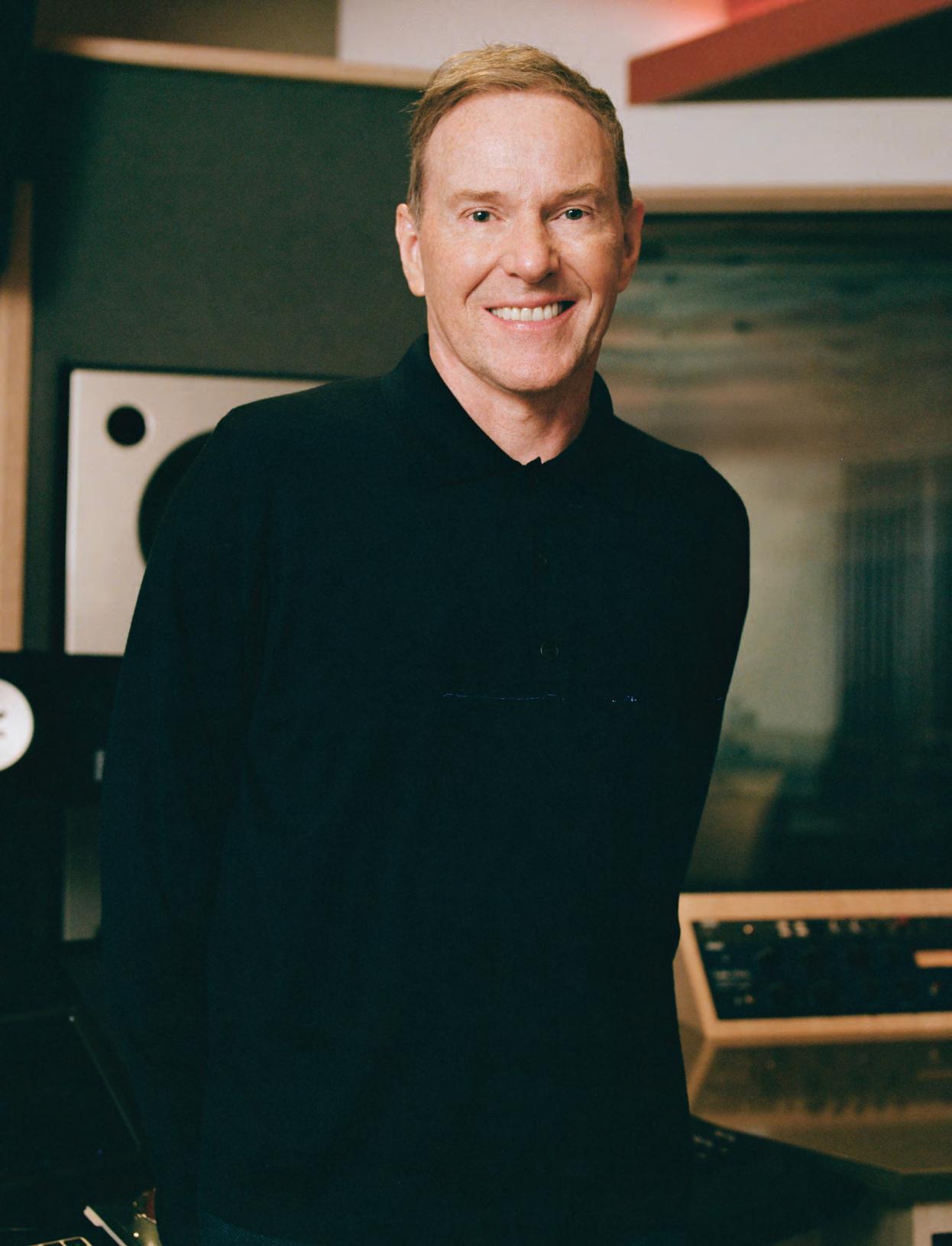
‘WE’RE IN THE BUSINESS OF WORKING WITH PEOPLE WHO CHANGE THE WAY OTHER PEOPLE FEEL.’
In November, Peter Edge will receive the Sir George Martin Award at MBW’s Music Business UK Awards in London. We sit down with the British-born, Los Angeles-based RCA boss to discuss artistry, major record companies, and the value of human creation...
RCA Records operates on a philosophy that prioritizes artistic vision – and consistently proves that patience pays off.
Peter Edge, the label’s Los Angeles-based CEO, has spent the better part of two decades building what he describes as a “premium content” philosophy.
Edge’s achievements will be formally recognized in November, when he receives the Sir George Martin Award at Music Business Worldwide’s Music Business UK Awards in London.
It’s an honor that, appropriately, celebrates executives who combine commercial success with unwavering support for artistic vision.
2025 has been a year that perfectly encapsulates Edge’s approach. Sleep Token, the mysterious British metal outsiders, mesmerized audiences both in the US and around the world, with stunning results – including their latest album topping the Billboard 200 in May.
Elsewhere, Tate McRae’s pop evolution reached new heights; her latest album, So Close to What, also became a Billboard 200 No.1 in February.
during the pandemic years, when the industry pivoted toward viral content and instant gratification.
The label maintained its long-term vision, focused on building lasting careers rather than chasing fleeting moments. That strategy continues to pay dividends: the label now boasts some of the most culturally significant artists of the streaming age, each defying easy categorization.
“We’re not in the business of making widgets,” Edge notes, referencing a commodified A&R approach he’s spent his career rejecting. “We’re in the business of working with people who change the way other people feel.”
Tellingly, as AI encroaches into the music business more and more, Edge remains confident in art with a soul. He notes: “Perhaps the thing that is going to be most valuable in music is the human part – the part that isn’t copyable… the part that isn’t based on some kind of predisposed formula.”
“We’re not interested in telling artists to compromise. We don’t believe ‘it’s all been done before’.”
Meanwhile, Tyler Childers continued his genre-defying artistry, LISA’s solo venture stretched K-Pop convention, Doja Cat roared back with the ‘80s-inspired Vie, and the likes of Myles Smith and Wolf Alice demonstrated a slick collaboration between Edge’s US-based label and Sony Music’s UK operation.
Then, of course, there’s SZA. The past 12 months have seen a triumphant LANA deluxe re-issue for her huge SOS album, while she also found time to top the Billboard Hot 100 with Kendrick Lamar on Luther
At the same time, SOS has continued to cement its place as a global modern staple; according to Sony Corp data, it was Sony Music’s biggest global record for the firm’s past two fiscal years.
“I’ve always been attracted to things that seem unlikely,” Edge explains from RCA’s offices, reflecting on the label’s eclectic roster. “Music is changing, and I think this current generation is much more open to combinations [of genre] that people might once have thought wouldn’t work.”
RCA’s ‘gradual road to greatness’ philosophy was naturally tested
Below, MBUK speaks with Edge about building careers in an age of shortened attention spans, why “premium” artists are winning in a crowded marketplace, and how RCA became the anti-algorithm major label…
When Music Business Worldwide last interviewed you in 2019, you likened your approach to HBO: “Premium content for a subscription audience.” How has that philosophy evolved in the streaming age?
Creatively, RCA has the same mindset as a large independent. Artists’ constant ability to play with genre and reinvent themselves really excites us; we’re not interested in telling them to compromise, and we don’t believe ‘it’s all been done before’.
Even if something strongly takes a cue from another era, you can marry it with a contemporary point of view.
We combine that artistic appreciation with an understanding and expertise around data and reaching global audiences.
On the data and marketing side, what’s changed from a few years ago?
Things are way more complex than they ever used to be.
It’s a very subtle process to influence what people are open to
connecting to. There’s no ‘one thing’ you can do to open that door.
We focus on audience perceptions and influences, putting things in the space around people and allowing them to gestate to become meaningful cultural moments.
Look at what the RCA team put together with Sleep Token –this incredible long-lead campaign ran for six months, bringing the fan into a world completely created for this album. It’s mysterious, intriguing, and compelling. It meant you were glued to what’s going on.
It shows what you can do with long-term planning and trying out things that are not necessarily the tried-and-tested ‘this is how you release a record’.
Sleep Token is a key example of genre fluidity on RCA from the past year. How did that signing happen?
We’d been observing them building an incredible fanbase from the records they’d released previously. Kudos to Dan Chertoff and Daniel Schulz on our A&R team for realizing and spotting what was going on with them very early.
It was a curious one, as started listening to their music deeper I kept hearing real references from other genres, in particular R&B. I realized this artist was drawing from references that are hardly ever drawn on in music broadly defined in that way [as hard rock/metal].
It speaks to what I was saying earlier: this current generation is much more open to hearing combinations of things that people might have previously thought would be unlikely to work.
I notice you keep talking about the artists… I’m going to have to trick you into talking about yourself at some point. The artists are why we’re here. I’ve never wanted to be known for anything other than supporting artists, partnering with artists, and helping them achieve their goals.
It’s hard for them to be out front, to put themselves out there and take the risk that people may or may not appreciate what they’re trying to do. Playing a supporting role to them is a great privilege.
During the pandemic, the industry pivoted toward viral hits. How did RCA maintain its long-term philosophy?
In 2020, amongst everything else going on – socially, politically, this extraordinarily strange time that nobody could ever imagine – it all felt a bit like, ‘What is this music about?’
Most of the time [listening to new popular music at the time], it didn’t feel like people were going to look back on that period and go, ‘Oh my, these songs are forever songs.’ To use the current parlance, they were ‘moments’. We actually benefited from some of that: Doja Cat had some huge ‘moments’ in 2020 and 2021, but we knew she was never just a ‘moment’ – we’ve worked with her for a long time.
“I’ve never wanted to be known for anything other than supporting artists.”
I’ve always been attracted to that idea. The idea that something so different and eclectic [as Sleep Token] could work on RCA, to me, was never in question.
Tyler Childers also fits into this conversation: he’s a country artist, but also far from ‘just’ a country artist.
Tyler is completely his own thing. He’s become this generation’s North Star for artistry in so many ways.
He’s a remarkable guy because his views about life, his interests, and influences, are completely unpredictable.
Now I think about it… SZA is R&B, but she’s also not R&B. This is becoming a theme.
SZA is… as SZA does! She’s whatever she feels and wants to do, and there’s no box you can put her in. She’s very sure about that.
Credit to our partners at TDE, Top and Punch, for seeing that years ago and just believing in her artistry.
Her music is raw and emotional yet beautifully melodic, like some of the great artists of the past decades.
SZA is just so real. If I wasn’t working with her, she’d still be one of my favorite artists.
She’s an artist who’s entirely unpredictable and fascinating, and has a long career ahead of her, as you’re seeing now as she enters her Vie era.
That raises a broader question about artist development. There’s a narrative that majors just don’t do it anymore.
I would argue that RCA kind of disproves that. Tate McRae is a great example. We signed her when she was 15 or 16, building from the platforms she’d created on YouTube as a dancer and songwriter.
We’ve built her career together from a very small beginning into somebody who’s become one of the breakout artists of this year. Her album and everything associated with it are remarkable.
What do you look for when signing artists?
What is unique about this artist? What do they do that nobody else is quite doing the way they do it? What are they about that’s not duplicated elsewhere?
I think of Steve Lacy. This is a guy who defined his own destiny – whether making amazing songs in his bedroom at 16 or 17 or now, forging something so specific.
People like that are very exciting to me because their vision and their ability to make something really singular and unique, creatively their own thing, is remarkable.
It’s interesting that you focus a lot on the people you’re signing, their character, not just their music. It leads to a philosophical

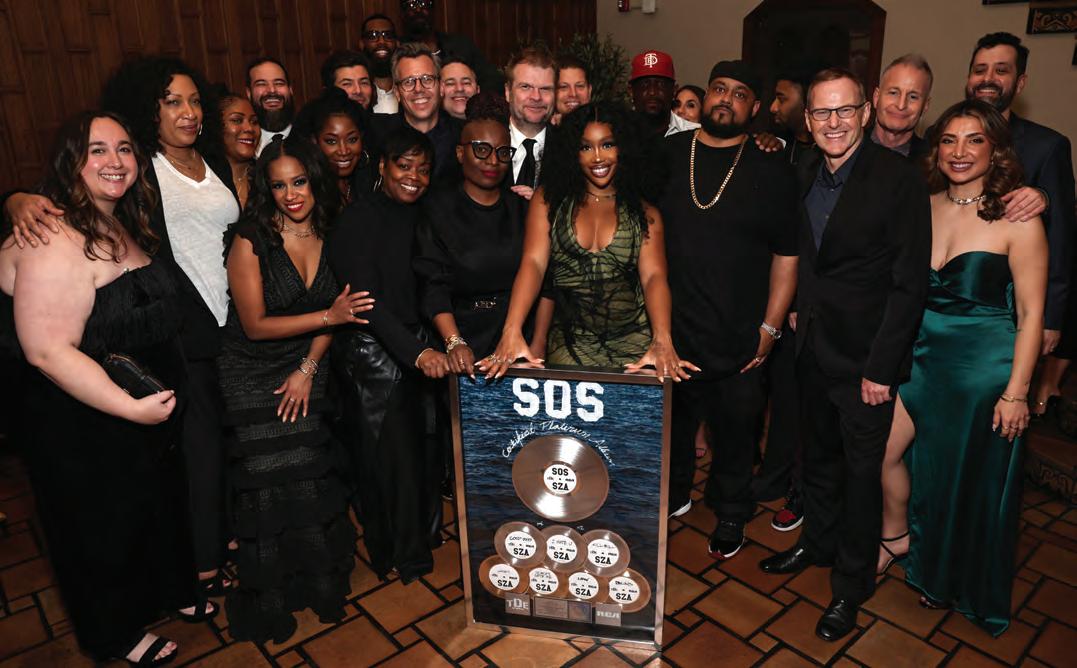
conversation about human authenticity versus artificial intelligence.
With everything going on with AI and music, perhaps the thing that’s going to be most valuable is the human part – the part that isn’t copyable… the part that isn’t based on some kind of predisposed formula. How heartfelt, how authentic, how unusual is this piece of expression? That’s always been one of the most interesting things about music.
I was speaking to a young DJ recently and he said his peers have a very sharp eye for authenticity: ‘That person is not being real, that’s a commercial ploy, this content is not actually authentic.’
The antennae for what’s real amongst Gen Z has been tested over and over by the digital age, and maybe they’ve had enough. That could have a big impact on artistry.
It used to be the case that the industry had ‘majors’ and ‘indies’, with a strict dividing line. That’s changed a lot, especially thanks to the deals that get done, with more artists owning rights and licensing to the majors. But culturally, too, there’s no great issue with ‘signing to a major’ from the indie ecosystem. I’ve just seen you’ve signed two artists from the ‘indie’ world – Alex G and Blood Orange.
“Artists are not widgets. It’s fun to work with people who don’t compromise what they want to say.”
Throughout my career, what’s frustrated me has been seeing the ‘we make them like this’ approach – changing [an artist’s sound] so they fit a preconceived notion of what audiences will like.
Artists are not widgets. I love it when great artists in the ‘margins’ of [culture] get popular. It’s fun to work with people who get to grow their audience without compromising what they want to say.
Artists can come here and our philosophy is like, ‘No, we don’t want to alter your vision – we want to make your vision bigger.’
I love that. It’s the antithesis of ‘we make them like this’ thing.
I suppose Blood Orange and Alex G are both prominent artists in what we might have once called ‘alternative’ or ‘indie’ music. But everything’s broken down now; those labels are disappearing.
You’ve been at Sony/RCA for over two decades, following your successes at J Records working with Clive Davis. Why does Sony’s structure support your artistic vision?
To develop artists and see them through, you have to stay in one place for a long period of time. That comes with the territory.

I’ve been fortunate that [Sony Music Group Chairman] Rob Stringer shares that vision of artist development – he’s been involved with many artists’ careers over a long period of time.
Rob’s also a music guy. Not only does he believe in artist development, but he’s also a big fan of music.
And then I look to the people around me. To name just one, John Fleckenstein is such a major part of RCA – he’s in the center of everything. He’s creative, but he’s also extremely solution-oriented and practical. He has a really good way of translating philosophical thoughts into practical application. That’s invaluable.
Over the past few years, the industry has seen the rise of catalog music dominating consumption on streaming services. How do you view that challenge?
From a business perspective, obviously frontline labels face challenges when everyone listens to music from other decades. But on a creative level, it’s actually a really good thing.
I love the idea of a ‘collapsed timeline’. I grew up through the ‘90s listening to music from all over, which is a very British thing to do. There was a whole culture of absorbing music from different times and places. Now [because of streaming], we’re seeing younger artists are influenced by a much broader range of music.
I think about some new projects we have at RCA that are imminent. Look at The Red Clay Strays, who just go from strength to strength in terms of being a band that blends country,
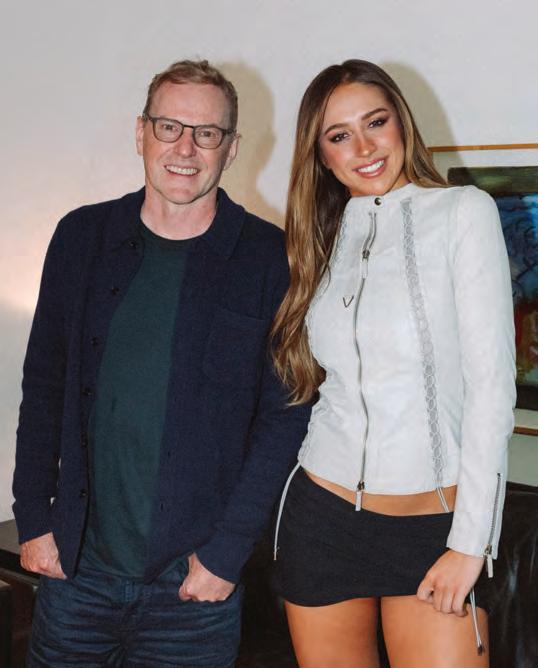
Americana, and rock. They’re a very unique prospect, playing larger and larger venues, with a new album on the way next year. Their time is coming.
Tems has been such an important voice coming out of the new Afrobeat scene in Nigeria, but frankly she’s gone beyond any genre and any borders. She has that very special and unique voice and writing skill. I’m very excited to see her fulfill all of her potential.
Other artists we’re excited about include Victoria Monét who won Best New Artist at the Grammys last year [2024] –there’s lots of anticipation around her next record. And I’ve just been listening to kwn from the UK, who’s creating a whole new take on what ‘R&B’ could be, from a different viewpoint we’ve seen before.
Do you ever worry that the transitory nature of media consumption amongst young audiences – short-form video, plus all that choice of catalog music – is going to kill fandom of new artists?
No. The thing that’s so potent with younger artists is that they’re here now, playing live to crowds of people directly like them.
With all the [screen time] we experience in our lives, headphones in, people are really craving experiences in real life. And for us as a label, the live arena is really great as an artist development tool - it tells you much more than listening to a recording or even an inperson meeting can. n
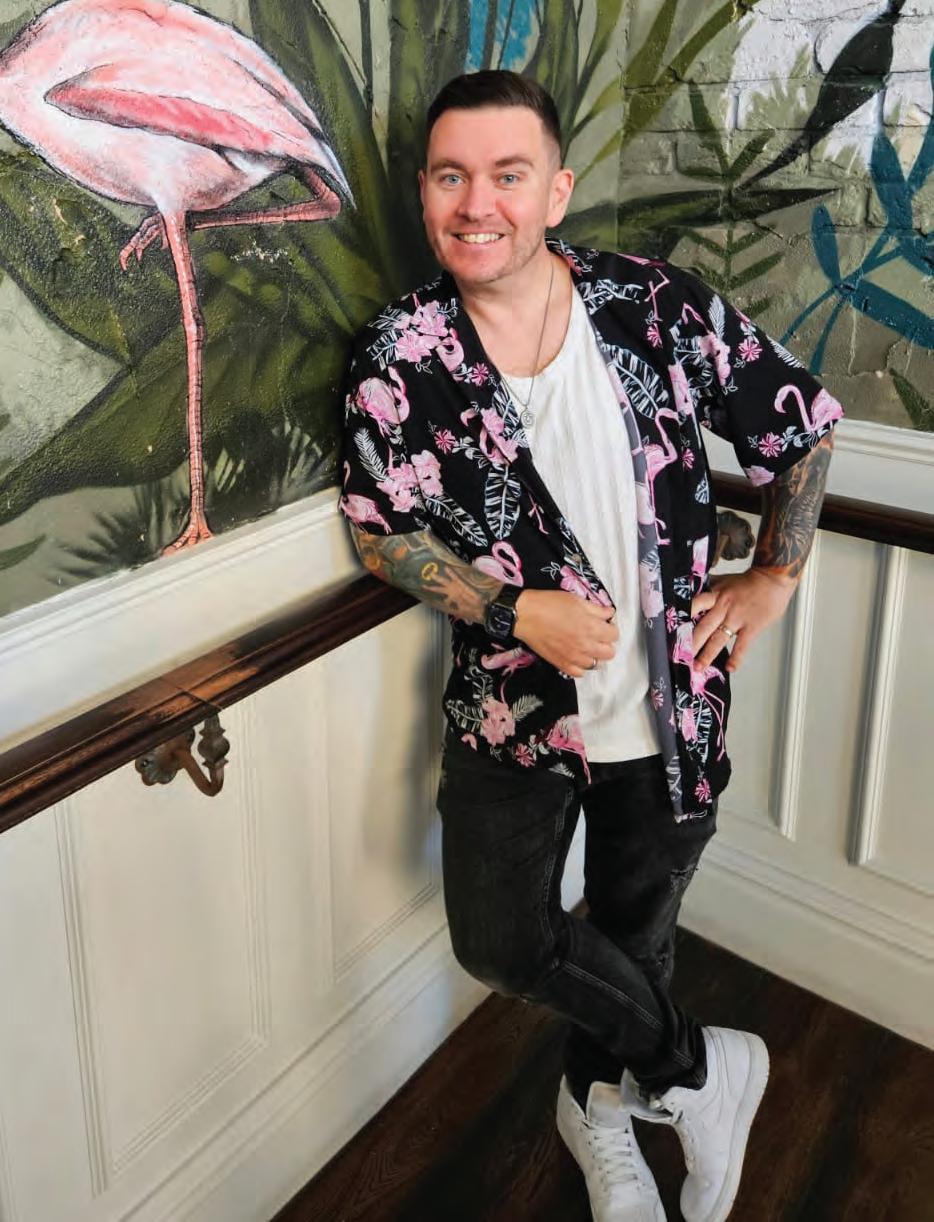
‘I DON’T SEE ANY CEILING – THE SKY’S THE LIMIT’
Ryan Richards enjoyed some pretty serious success as the drummer in Funeral For A Friend. But as the manager of Sleep Token, he’s heading to a whole new level…
Ryan Richards looked like he was on top of the world. He was the drummer/scream vocalist in Welsh post-hardcore legends Funeral For A Friend, one of the most successful UK rock bands of their generation, touring the world and playing to thousands of adoring fans.
After five albums and hundreds of gigs, however, in 2011 Richards found himself getting his thrills elsewhere. No, not in the sex-and-drugs-and-rock’n’roll lifestyle that has distracted so many drummers over the years, but in the little wins achieved by the local bands back in his native South Wales that he was advising and helping out.
It was that, combined with a desire to spend more time with his young family back in the Valleys, that saw him sit down for a chat with the band’s manager, Craig Jennings of Raw Power Management.
“I said, ‘I think my touring days are numbered’,” Richards recalls. “‘This management thing is where my passion is and where I see my future going forward’.
“A few days later, Craig rang me up and said, ‘If you’ve made up your mind to do that, why not come and work with us at Raw Power and learn there?’ It was a massive learning experience, and so helpful to my development as a manager. It was the perfect next step.”
Nor is it likely to be a one-off. Richards has cultivated a roster of fast-rising rock acts, including the likes of Those Damn Crows, Holding Absence, Bambie Thug, President, Zetra and Dead Pony.
They’re the sort of bands Richards would have loved in his own South Wales youth, when he was encouraged in his musical abilities by his family, at first playing piano/keyboards before settling on the drums when his musical tastes – initially shaped by a babysitter who would play him Bon Jovi and Guns N’Roses –became too heavy for tickling the ivories to be involved.
He played in a number of local bands before joining Funeral For A Friend. He realised the band was going places when they scored a Kerrang! feature that tagged them, ‘The most exciting new band on the planet’.
“Then it was like, ‘Right, I guess we’d better get serious’,” he chuckles. The band signed to Atlantic Records UK and Sanctuary Artist Management (after Rod Smallwood saw them play at the Kerrang! Weekender in Camber Sands) and Richards settled into the unofficial role of liaison between band and industry advisors on their unstoppable rise to rock stardom, marking him out as a future exec in the making.
“Not to self-aggrandise, but I always thought that this is where it would end up.”
Fourteen years on, Richards has his own management company, Future History, and is himself one of the most successful rock managers on the planet. In a UK industry starved of breakthroughs, the huge success of Sleep Token – one of three bands he had on his roster when he left Raw Power to set up Future History in 2018 – has been remarkable.
The mysterious, masked UK rockers have headlined Download Festival, signed to RCA in America and scored a No.1 record with their fourth album, Even In Arcadia, on both sides of the Atlantic. More to the point, their pop sensibilities, hyper-engaged fanbase and savvy use of online marketing have taken them to places other rock and metal bands can no longer reach: Hot 100 hits, latenight TV appearances and the biggest US streaming week for a hard rock band ever. That’s ever.
This is uncharted territory for a rock band in 2025, but Richards is taking it all in his stride.
“Not to self-aggrandise, but I always thought from the start that this is where it would end up,” he chuckles. “I was always a true believer.”
When Sanctuary dissolved, Funeral stayed under Craig Jennings’ wing at Raw Power (“I still consider Craig a mentor,” he says), while Richards started helping out local bands by passing on contacts and helping them secure gigs.
He joined Raw Power when he went full-time with such management concerns, working his way up before leaving when he found himself again spending too much time away from Bridgend (“Wales keeps drawing me back: the green, green grass of home that Tom Jones sang about really is that magnetic,” he laughs).
Initially, he worked alone from his home office, meaning he and his artists could weather the Covid shutdown due to his low overheads, but Future History is now expanding rapidly, with Download Festival boss Andy Copping joining as a director.
Accordingly, Richards – who spent the summer back in the reformed Funeral For A Friend, playing the band’s biggest ever gigs, including a headline at Cardiff Castle – fizzes with plans for the likes of Bambie Thug (who just signed a publishing deal with Universal), President (“Out of any band I’ve ever worked with, that’s been the quickest out of the traps,” he declares) and the reviving rock genre in general.
“It’s hard work being a rock band,” he says in his mellifluous Welsh tones. “Climbing up that hill can be a slippery and steep
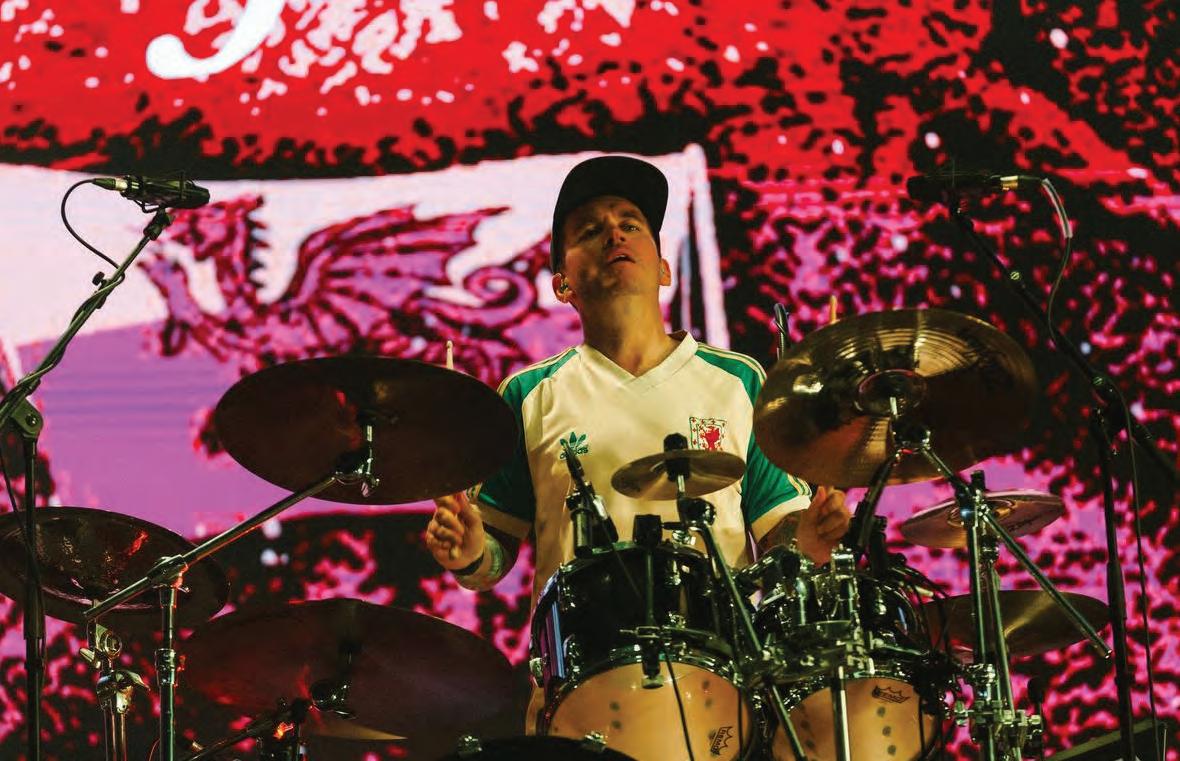
slope. But, with rock being such a growing genre, I’d like to think it might empower the scene to have more leverage or influence. We’ll certainly keep trying…”
Before that, however, he sits down with MBUK in his Bridgend home office on a classically rainy South Wales morning to talk streaming, mystique and why Sleep Token aren’t actually a metal band…
Unusually for a band in 2025, Sleep Token have mystique. How big a part has that played in their rise?
I love that stuff. I was listening to a music industry podcast recently and the topic of conversation was social media and how it’s changed the dynamic between band and fans, and how it’s a shame you can’t do things in the way you used to, when you had that mystique.
Because the band is operating the way it does, in terms of the anonymity and not connecting in the conventional ways with social media, interviews and press, it’s about putting everything around that and giving more substance to the whole story.
You go to a Sleep Token show and, even though the band doesn’t speak in words, there is that unspoken connection and dialogue between the band and the fanbase which is really special, quite unique and very powerful.
“There is an unspoken connection between band and fanbase which is really special.”
And I was thinking to myself, ‘Well, surely you can if you choose to?’ And that’s what it’s been. It’s about wanting to find that magic again, that deeper connection between fan and artist, which conversely comes from that separation, it engenders that deeper connection.
Will you be able to keep all that up, or will there be a ‘Kiss without the make-up’ moment?
The difference there is, it doesn’t feel like anyone – certainly not the fanbase – wants that. They’re not trying to peek behind the curtain, dissect it and invade upon what the band is doing, or to break that fourth wall.
It’s not just about respecting it, but really indulging in it, buying into it and enjoying it for what it is. It was different back in the day with Kiss, and maybe even Slipknot, where it was like, ‘Oh, I wonder what they look like and who they are?’ Now, maybe because the dawn of the internet means information is always at your fingertips, people value having that mystique and separation.
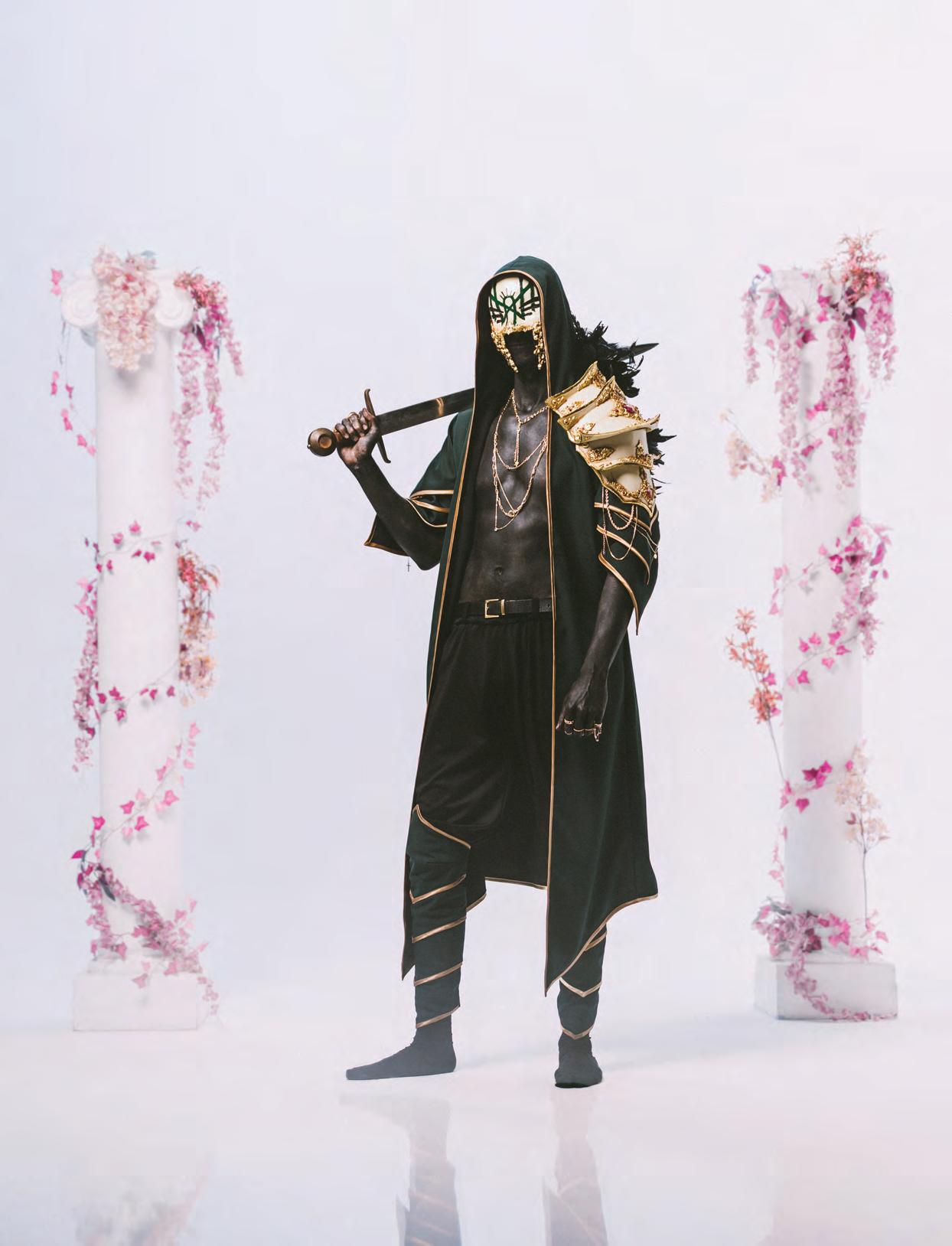
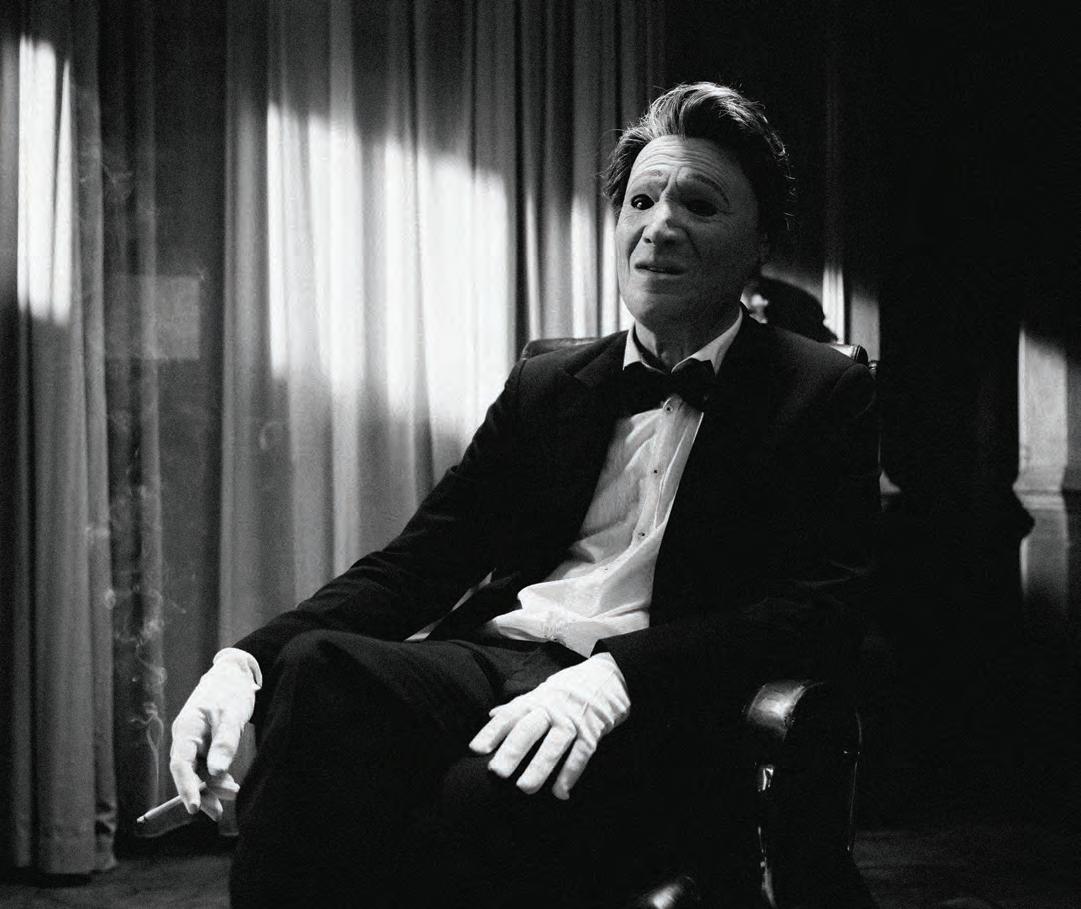
With any movie or TV show that comes out, before you watch it, you can go online and find out the ending. You can spoil it for yourself – but why would you do that? I don’t see anything positive or helpful in that and it seems like people feel the same.
Conventional industry wisdom suggests rock music doesn’t work on streaming. How have you bucked that trend? One of the big things is the understanding of where rock is now. A lot of the listening public have had a skewed vision or perception of what rock/metal/hard rock is and sounds like, informed by music from the past or what they define in their heads as rock or metal.
If you’re a person that never listens to metal, but you’ve heard Metallica, Iron Maiden, Judas Priest or any of the big, heritage metal acts and you don’t like any of those bands, and you’re seeing
a band like Sleep Token described as metal, you’re probably not going to go and check it out.
It’s like, ‘I don’t like Iron Maiden, I probably won’t like Sleep Token’ – which is to completely miss the point. When Sleep Token get put into the metal genre, it’s because that’s the most extreme touchpoint of what the band does.
But there’s as much pop, R&B, electronic and piano-led music as there is heavy guitar; there’s perhaps even more of those other things.
But now the band has had more mainstream exposure and people have heard it by accident or been recommended it, they’re like, ‘That’s not metal’.
There are elements of it throughout the record, but it’s not a metal band: it’s just an artist painting with many colours to portray many different feelings and emotions, and that’s just one of them.
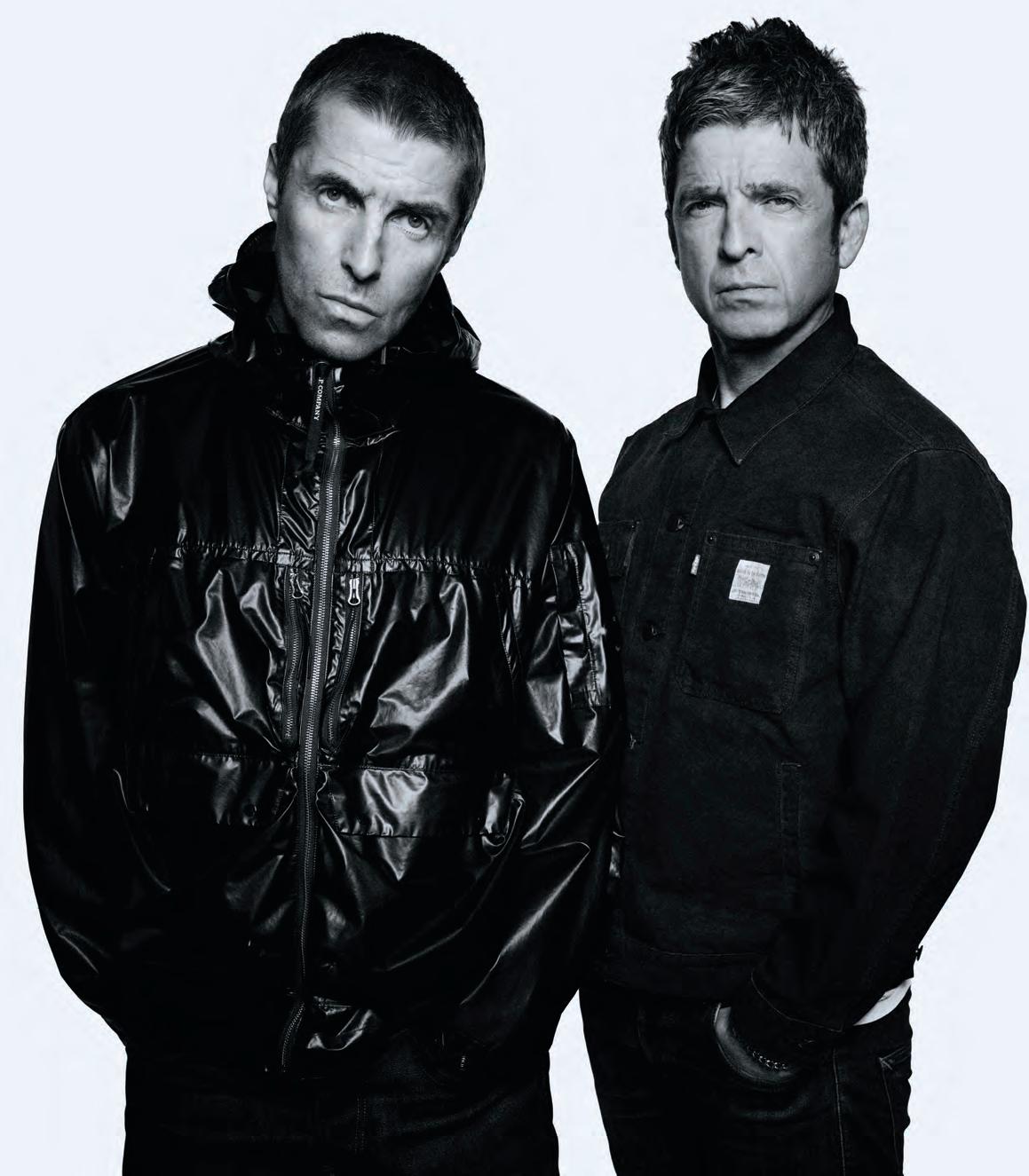
We keep hearing about how few British breakthroughs there are these days. Are Sleep Token getting the industry respect they deserve for their success?
There’s been this wave of optimism and positivity at the place that rock is in, where it’s going and the trajectory it’s on, so it’ll be interesting to see if that’s just in our little circle, or if it permeates into the outer reaches of the industry.
But I’ve been in this industry long enough to know it’s always been this really vibrant and exciting part of music culture and always will be. It never goes away, it never dies, that’s why it circles round to every generation – it remains to be seen if that’s what this is.
It’s not something that I really concern myself with, but it’ll be interesting to see when it comes to the next more mainstream awards. But the response from the fanbase is what it’s all about.
When you joined Funeral For A Friend, did you expect them to become so big?
Well, the difference then was, we measured success as ending up on a covermount CD for an independent music magazine. We were like, ‘We’ve done that, we’ve done a demo and we got to play London – we’ve made it!’ There was no grand plan.
So, we were like, ‘Maybe we could get signed to an indie label or have a booking agent and do some shows with bands we like’, and that was it. But it quickly escalated!
Has going through the ups and downs of being in a band helped you as a manager?
Just having someone with the level of experience, knowledge, respect, contacts and everything else that Andy has, as well as being such a good friend to me and my family, just felt really right. He’s been a really important addition to the company with everything he brings to the table, it’s been a big factor in the successes we’ve had.
If you could change one thing about the music industry, right here and now, what would it be?
I’m sure I wouldn’t be the first person hoping for streaming compensation to be a little more attractive! Particularly for artists that are coming through.
It can be a real lifeblood and a real boost for new artists, being able to actually earn a decent income as they start, just to give them that freedom to remain independent as long as they need to, and give them that structure of being able to develop as an artist.
It’s a shame when you come across a really good artist that has signed away recording or publishing rights on a deal that’s just not good for them, but they’ve been left with almost no choice because they weren’t getting paid any other way. They needed that cash injection, so they signed whatever was in front of them, just so they wouldn’t have to pack it in.
“There’s as much pop, R&B, electronic and piano-led music as there is heavy guitar.”
Absolutely. It’s been the biggest contributor to any success I’ve had in management.
It’s important that I make the distinction to the bands I work with. I say to them, ‘If I’m giving you advice on something, or steering you in a particular direction, it’s not because I’m a knowit-all, have this unique perspective, or have all the answers. I’ve learned as much or more from the wrong steps I’ve taken as a band member or as a manager’. You learn so much from your mistakes. They give you the knowledge.
I always say to them, ‘I’ll never ask you to do something that I haven’t done’ – and that’s pretty accurate really.
Andy Copping has joined Future History – what will he bring to the company?
He’s someone I’ve been close with for many years, and he’s always been a big supporter. When I was coming through with Funeral, he always believed in us, he always gave us really good opportunities through Download or other tours.
And, on a personal level, he’s always been a big supporter of mine. When I left Raw Power to start Future History, he was one of the first people on the phone to say, ‘Hey, if you ever need anything, I’m just a phone call away’.
Then they get stuck in those deals, they get a little further down the line, they’ve spent their advance and they’re back to square one without any commodities to sell and they’re screwed. That’s not all the fault of royalties from DSPs, but that would help.
Is there a difference between Ryan Richards the rock star and Ryan Richards the manager?
[Laughs] No! When it comes to Funeral For A Friend, I’m quite happily back in that position where I’m the one arranging bits and pieces, getting stuff ready, liaising with promoters and booking agents – I don’t think there’s much of a distinction there.
If anything, it’s helped with being able to handle the band side of it in the right way. I certainly appreciate it more; it’s a nice treat to get out there, slip those drumming shoes back on, reconnect with the guys in the band and their families. It’s a nice thing to have on tap when the right opportunities come along, it’s nice that it’s still there.
There are no plans for anything else – perhaps there will be, perhaps there won’t but, if there isn’t, that [Cardiff Castle headline show] would a good one to sign off on.
And how big can Sleep Token get?
I don’t see any ceiling. Fundamentally, across any genre at the moment, you’re looking at one of the best songwriters and one of the most interesting and exciting live acts out there.
And, when you have those two things, then the sky’s the limit. n
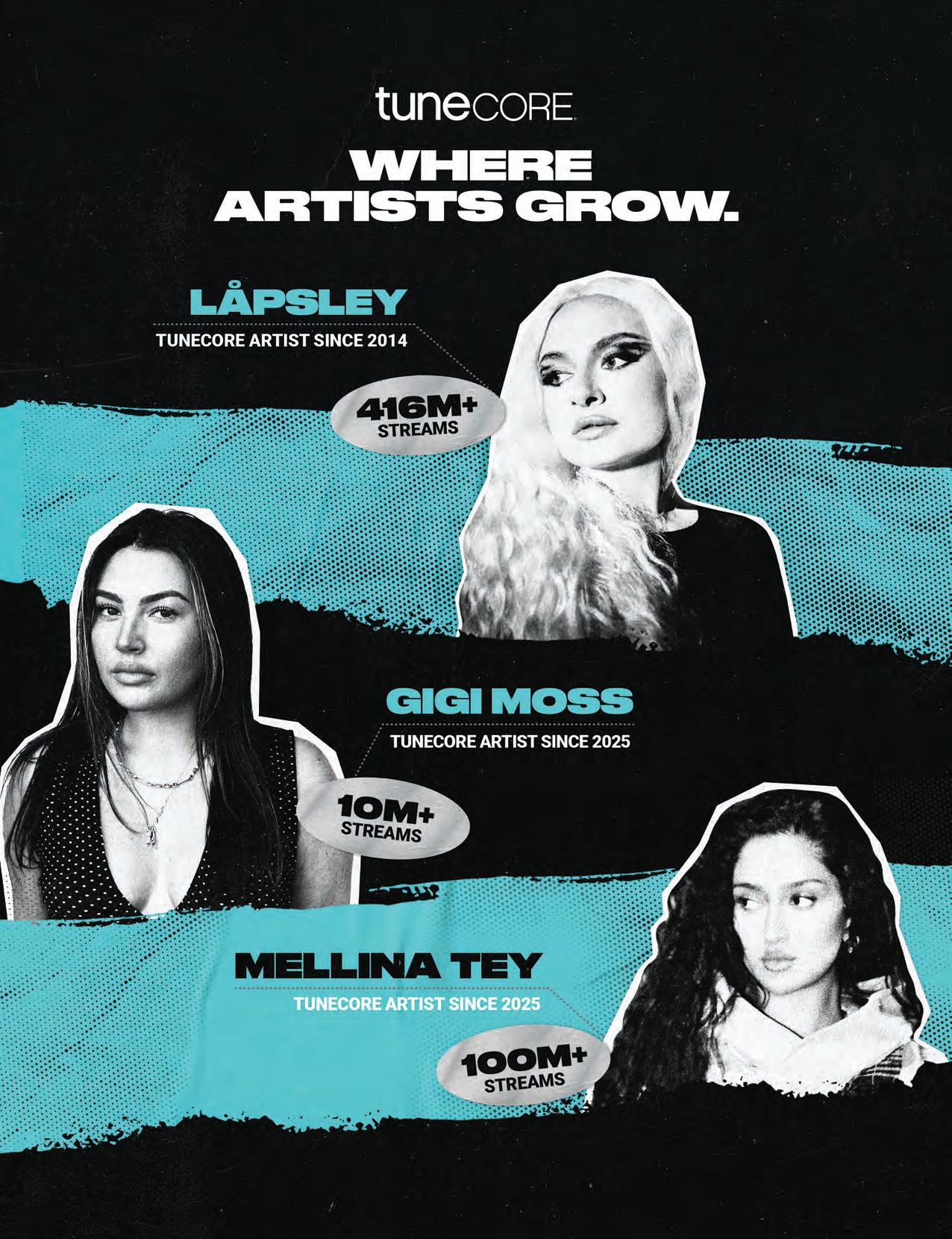
‘THERE IS LITTLE MORE IMPORTANT TO ME THAN GIVING CHILDREN THE MUSIC THEY DESERVE THAT WILL STAY WITH THEM FOR LIFE’
From raving in Ibiza with Ministry of Sound to heading up Universal Music UK’s youth strategy – via The Powerpuff Girls and Amy Winehouse – Sarah Boorman discusses her life in music and a job that’s also a vocation…
There’s a danger that the idea of a department dedicated to selling music to children could come across as cynical – but not after listening to Sarah Boorman for more than five minutes.
For a start, she is genuinely enthusiastic and evangelical, driven by a desire to get generation-after-generation passionate about music – proselytising an artform rather than pushing a product.
There’s also that word ‘department’. “I always smile when I hear that”, says Boorman. “It’s just me at the moment. But I plug into amazing teams in the UK and around the world. I sit in Rebecca Allen’s Audience, Media & Strategy team, in Kate Wyn Jones’ Audience stream, building partnerships and initiatives with the labels. And I work closely with David Hawkes, Chief Commercial Officer [UMUK].
ambition to be part of the business. “I remember being in primary school and imagining what it would be like to work with the artists I loved. I’d wonder how you even got to do that. It was a childhood dream that I honestly didn’t think could become reality.
“I studied psychology and economics, but my real passion was always music: listening, playing, dancing, singing, going to gigs. All my hobbies involved it. Where
think I slept properly for four years. It was fast-paced and wild, so much fun, but eventually I started to wonder where it was all heading.
“My friends were getting serious about their careers – finishing law school, PhDs – while I was jumping around Ibiza having the best time, but always skint. I couldn’t ignore the feeling that I needed to focus more.”
That feeling led to a career-defining move that took her away from music, only to eventually deliver her back, this time with a very distinct focus.
“I was in at the deep end. It was the ultimate initiation by fire, and I absolutely loved it.”
“I also work within a global UMG Committee focused on younger audiences. A highlight has been partnering with Bree Bowles at Republic Kids in New York. She’s phenomenal, and we’ve built a great relationship.
“I try to keep things fluid with the labels. I add the most value by building wider opportunities and partnerships that artists can tap into. But if a label ever wants me to lean in on a specific campaign, I do. Breaking and developing artists is the most important thing we do as a company, and I’m always there when needed.”
Boorman’s love of music goes back, appropriately enough, to childhood. Perhaps more unusually, so does her
it all came together was music marketing. It makes sense now, but the universe still had to shift in just the right ways for me to get here.
The first sign of movement came when Boorman was President of her University Students’ Union and suddenly had to deliver a Freshers’ Week event with almost no notice. She recalls: “Ministry of Sound came to the rescue. I met the team, we clicked, and before I knew it I had abandoned my Master’s plans and joined Ministry of Sound in a super entry level role.
“I was thrown straight into the deep end – everything from compilation licensing to guestlists. It was the ultimate initiation of fire, and I absolutely loved it. I don’t
“I became Marketing Manager at Cartoon Network, working on what we then called new media strategies for characters like Tom And Jerry and Johnny Bravo. It was fun in a totally different way – sometimes it felt like living inside a cartoon, with creatives bouncing jokes around and chucking jelly beans across the office.
“It was a brilliant time, not least because it was the only point in my life where work actually stopped at 6pm. But I really missed music, and I knew I had to find a way back. That’s where the luck came in.”
It wasn’t all luck, of course. And it’s certainly much more than luck that has seen Boorman carve out a career that now sees her working with artists and teams across the world, finding and talking to the music industry’s audience of the future...
How did you get back into the industry and end up at Universal?
Our biggest property at Cartoon Network, The Powerpuff Girls, were releasing their first feature-length film, and the studio
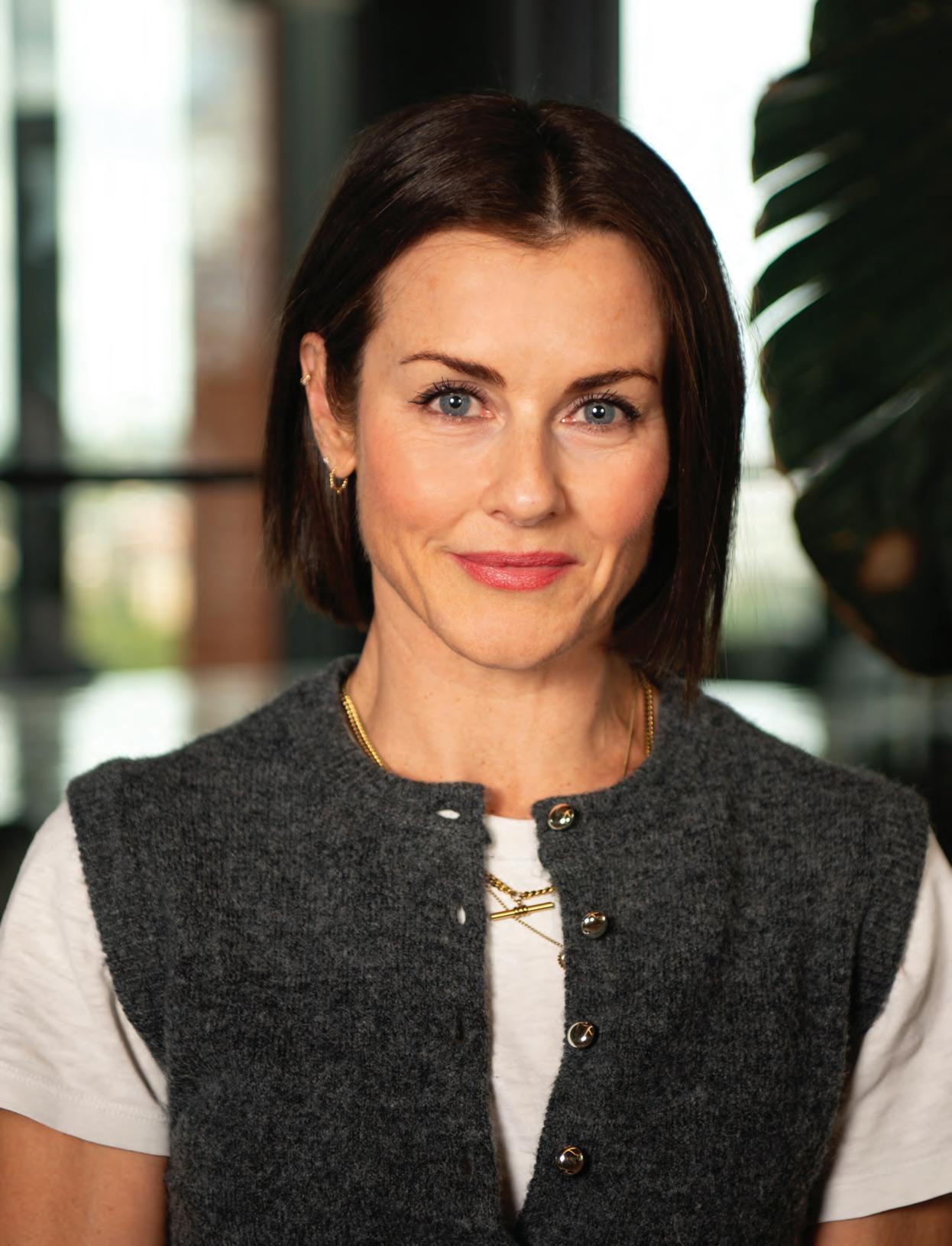
was looking for marketing ideas that would take them beyond their very young female TV audience.
One day on the tube home, I was reading a review of the Sugababes’ new single Freak Like Me. I loved that band – they’d got me with Overload and Run For Cover – and suddenly thought, The Powerpuff Girls are the Sugababes in cartoon form!
I’m going to age myself here, but one of the first things I ever Googled was, ‘Who manages Sugababes?’ That led me to Mark Hargreaves at Crown Management, who introduced me to Jon Turner at Island, who then put me in front of Jason Iley – then General Manager of the label – at exactly the right time.
Island was going through some changes, and they needed someone new to join the marketing team. We made a cartoon that became the Sugababes’ video for Angels With Dirty Faces, and a month later I was looking after the band at Island. It was fast and incredible. I couldn’t believe how it had all come together.
What was it like working with the Sugababes?
I joined the Sugababes camp in 2002, just before they released their second single on Island (Round Round), and I stayed with them in some capacity until they parted ways with the label in 2010. A lot happened in those eight years!
They made so many great records — Darcus [Beese, then Co-President of Island Records] and the team were on fire with that band. But it was intense, fast, international, and all before digital made travel and promo and even communications easier.
What were the first and most important lessons you learned when you plunged into the deep end of the music industry?
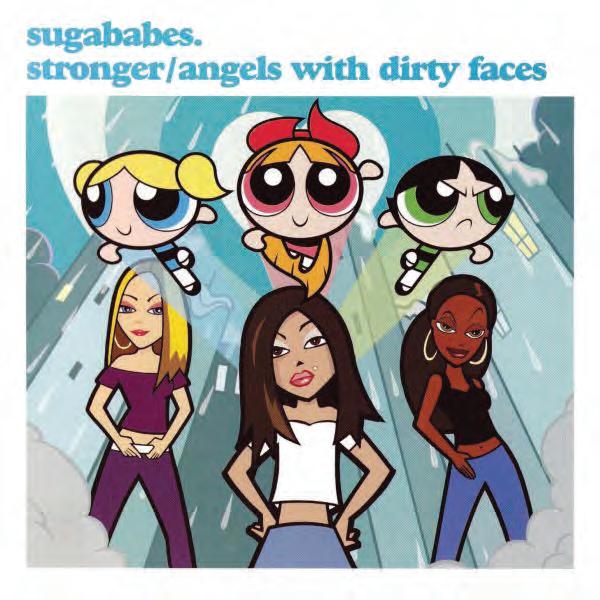
I learned that my role was to be the hub at the centre of a campaign – keeping everything on track, ironing out problems, facilitating communication. Honestly, I often felt out of my depth. I was in my
“To earn respect I had to be on top of everything – but also stay focused and kind.”
For me, the learning curve was steep. I had to get organised – fast. You were juggling production schedules, sales presentations, timelines, budgets, assets, managers and international diaries, all at once. I became studious about my job, but it kept things together in a way that is essential if your band is going to grow fast.
mid-twenties, looking after a superstar act, and I realised quickly that to earn respect I had to be on top of everything – but also stay focused, positive and kind.
Jason and Darcus were my icons at that time. They were totally different in their approaches, but both showed me what
excellence looked like in their respective lanes, so I aimed for somewhere in between, with my style. I remember asking Jason early on, when I was trying to figure out how to prioritise, what really matters to get a hit. He just said, ‘Everything.’ He was right – and that’s always stayed with me.
What were the highlights of your time at Island? And who were your mentors?
Looking back, I can’t believe I was at Island through such a seminal time, and I was lucky to work on campaigns that really got me noticed.
At the beginning, alongside Sugababes, I helped out on Busted, who were having an incredible run. Paul Adam, Louis Bloom, and I worked with Prestige Management to launch McFly, which properly put me on the map in the UK.
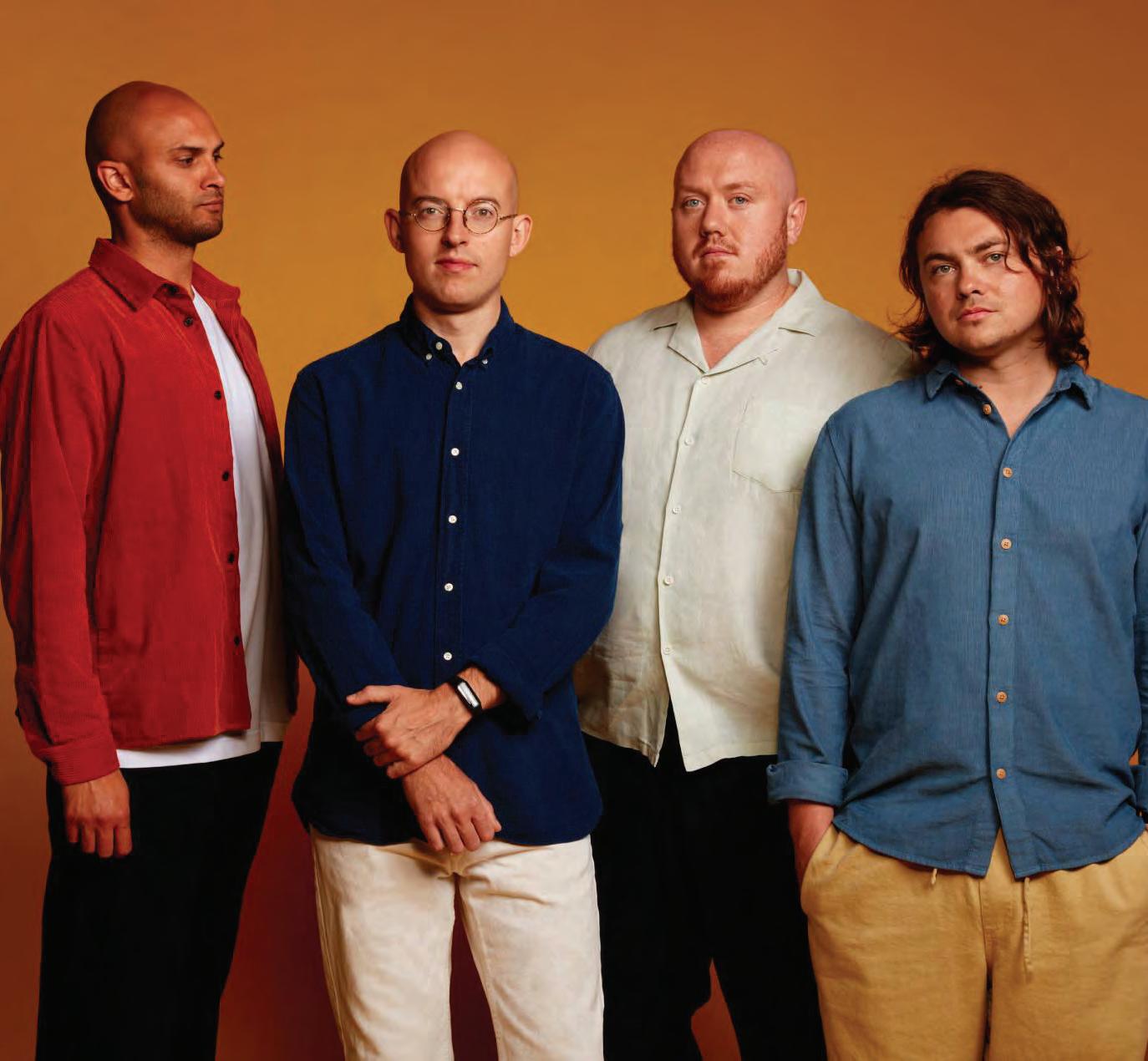
I was there from the very start – I still have a Polaroid from the first band meeting. I loved working with them, they were an absolute joy.
Their energy and positivity were infectious and I still talk to them now.
Honestly, it was seeing the reaction of the young fans that really hit me the hardest. Even now, I’ll still meet executives even now who say to me, ‘You helped launch McFly? They were
my first gig, my first album – they were everything to me!’
Breaking Bombay Bicycle Club meant a lot, because until then I’d never broken an ‘NME band’. They were clever, passionate, and inspiring.
Plus there was Jessie J, Tinchy Stryder, The Wanted, Taio Cruz, The Feeling, Mika, Florence + The Machine. It was an amazing time, and I was only running half the label!
But the ultimate highlight has to be Amy [Winehouse]. I knew her from day one at Island, and because I didn’t work on her record at first, we could just chat as friends. I remember SXSW the year she showcased. She was nervous but, when she delivered her acoustic set, you could hear a pin drop. I have goosebumps just thinking about it. Later, when I did end up marketing her record, it was magic. I’ll never forget Darcus walking into the office with Rehab

on a CD, fresh from New York with Mark Ronson, playing it to us and asking what we thought. We were speechless – it was clearly something special.
By the time I left Island, when my second child was born, I was General Manager. Loads of huge international acts were coming through – The Weeknd, Ariana Grande, Drake. It was incredible, but also relentless – endless promo trips and late-night conference calls (pre-Zoom). With two really young kids at home who needed me, I was ready for the next chapter.
gave me advice, had my back, and pushed my thinking forward.
Ruth, in particular, showed me how to navigate as a woman near the top. She
UMOD (Universal Music On Demand) came out of UMTV, Universal’s compilation label.
“I’ll never forget Darcus walking in with Rehab, fresh from New York. We were speechless.”
Who were your specific mentors at that time?
We didn’t use that word back then. We were all just getting on with the job. But looking back, Ruth Parrish [Director of Promotions] and Darcus were key. They
was my trailblazer. I’m proud to say both Ruth and Darcus are still two of my closest friends today.
From Island, you joined the Curation and Special Projects division. What did that entail?
UMTV had been hugely successful for decades, but once physical albums started to decline, the label needed to evolve. The wane of physical was directly linked to the rise of streaming and, for a while, playlist curation really made a difference to a track’s success. So our team focused on playlists, creating several in-house brands.
But we also explored anything involving curation – in new, creative ways. Compilations still worked, but we pushed boundaries: Pete Tong with the Heritage Orchestra (which gave us multiple No.1 albums), the Trevor Nelson collections, and the UK version of Kidz Bop.
How did the Kidz Bop collaboration come about and what made it so successful?
Kidz Bop were huge in the US, and their label, Razor & Tie, wanted to expand internationally with a UK group.
The idea was simple but powerful: kids singing family-friendly versions of chart hits, which usually wouldn’t get through streaming filters for younger listeners. It felt risky because it had been years since anything ‘for kids’ had really worked outside of Disney, but we decided to go for it.
ITV heard about the project and loved it. They knew the power of family-friendly pop from The X Factor and backed the band. TV was still a massive driver at the time, and we had incredible kids with real star quality (one was even called Twinkle –born for it!). The music sounded way better than anyone expected. Add in a stellar TV campaign and strong playlisting, and we had the magic formula. The result was three Top 10 albums in the UK – a huge achievement by any standard.
Is that what led to becoming General Manager, Youth Strategies? And was that a specially created role?
Yes and no. Kidz Bop was part of a bigger thought process. I’d already had success with youth-driven acts like McFly, and I’d seen how young fandom could start well before teenage years.
daughter, then aged seven, constantly asked for Let It Go. I thought, when I was her age, I bought Madonna’s Like A Virgin. Where’s that experience for her?’
Then one day, my four-year-old son asked Alexa to play Apricots by Bicep after hearing it on BBC Radio 1 – he had it on loop, jumping around like a little raver. That was a eureka moment; the landscape had changed again, children could access streaming via YouTube and smart speakers, they just needed people to talk to them. So, the Youth Strategies role was about recognising all these threads and creating a space in the business focused on under-13 audiences again.
Is that how you define ‘youth’ - under-13? It depends on the project, but broadly yes, I mean Gen Alpha – kids under 13. GDPR-K in the UK/EU and COPPA in the US set strict privacy rules for under13s: no first-party data, no media accounts without parental permission.
They begin to reject ‘child-focused’ content and insist on their own choices. That’s when music fandom starts – and it sticks for life.
What have been your biggest achievements in the role so far?
I’m really proud of the work we’ve done with Yoto, the audio platform for kids. It was the first global partnership of its kind, and they’ve been the perfect collaborators.
We’ve released classics like The Beatles, Elton John, Queen, ABBA, Bob Marley, Spice Girls, plus Disney and Moonbug projects. And now, we’re starting to release new music as part of artist campaigns.
Yoto is chart-qualifying in the UK too, which is an important factor. But for me, the bigger win is connecting with a younger audience in an innovative way, giving them the ability to choose their own music.
“Honestly, the biggest achievement is starting this whole conversation.”
I’m also proud of Activate, our partnership with Joe Wicks and Studio AKA (Hey Duggee), which launched this summer. It’s the first of its kind, an animated fitness series for kids, with short online episodes featuring tracks exclusively from Universal Music UK artists. It’s being used in primary schools around the UK from September.
At the same time, The Greatest Showman soundtrack was unstoppable, and I realised it was kids and families driving that success. The same happened with Frozen and Encanto. Clean, family-safe albums had incredible staying power.
My thinking was that we needed to A&R for this space again. But the industry had lost its youth-facing platforms: no Smash Hits, no TOTP, no CD:UK, no Chart Show. The download era meant that you suddenly needed a device, an account, and a debit card. By the time streaming and social media arrived, the media landscape for kids had completely changed.
On top of this, my own kids were growing up. I felt sad that the only music they knew was what I played them. My
This means social media is effectively off-limits, outside of YouTube Kids. A responsible youth strategy has to build elsewhere. Advertising is also stricter –no direct-to-consumer messaging, and restrictions around products like alcohol, sugar and fast-food.
I break it down further: zero to seven years is mostly music ‘for kids’, where parents and carers are the gatekeepers.
Seven to 12 years is ‘for tweens’, when kids start choosing for themselves. They want contemporary artists, but delivered into the water supply of where they are.
This second group is fascinating. Around age seven, the two hemispheres of the brain start working together, allowing more sophisticated choices. It’s also the age when many kids get access to iPads, Alexas, gaming consoles.
Seeing children turn screen time into active time while enjoying our music is incredible.
But honestly, the biggest achievement is starting this whole conversation – getting people across the company to support ways to inspire young listeners to find their musical tastes. After all, they are essential to the future of the industry.
What are the keys to getting kids interested in music? And how is it different from marketing to adults?
The truth is, kids are naturally interested in music. Play a track, and they’ll almost always react. They’re curious, open, and absorb everything.
Last year I worked with primary school children on Bob Marley’s 80th celebrations, tied to our Young Voices partnership (250,000 kids singing his songs on an arena tour!).
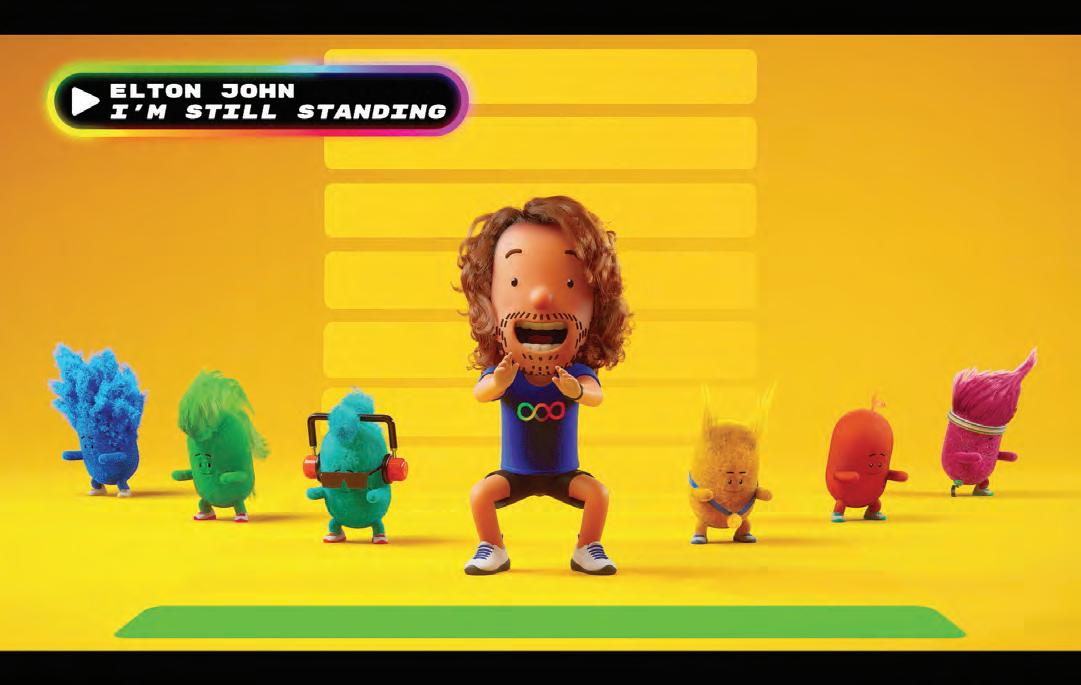
They were fascinated – not just by the music, but by Jamaica, reggae, the lyrics. It showed me again how easy it is to spark a lifelong passion – if you create the spark in the first place.
The big difference is appropriateness. I spend a lot of time on clean edits – both audio and video. Video is especially tricky. It’s not just about removing explicit lyrics; visuals have boundaries too. But it’s worth it, because future audiences are visual-first. We have to get this right.
meet Ofcom standards for youth viewing.
We’re working with the BBFC to classify videos: determining which are fine, which need tweaks, and which need alternates.
And what are the headline goals for 2026 and beyond?
The video channels will be much more populated by the end of this year, so 2026 will be marketing and development phase for those. I’m really excited to get to there, as I know from the research and insight work I’ve done how much children want these services.
“It’s easy to spark a lifelong passion – if you create the spark in the first place.”
Can you tell us about any projects you’re working on at the moment?
Right now, a huge focus is developing youth music video channels across connected TV and YouTube.
Believe it or not, there isn’t currently a music platform where kids can watch ageappropriate videos. Most videos are made with Vevo/YouTube in mind and don’t
We’ve soft-launched two CTV channels with VOD365: Ketchup Music (for younger kids and parents) and YAAAS! (for tweens who want contemporary music videos).
We also launched 4Tunes on YouTube – a safe space for tweens to watch music videos, short-form content, and creator collabs.
We continue to work closely with Yoto and have some exciting plans to deepen our partnership.
We are also looking at collaborations in the gaming space. The world of age-appropriate but relevant and exciting music curation for younger audiences still has a long way to go, but I am keeping my eye firmly on that process.
There is little more important to me than giving children the music they deserve that will stay with them for life, and, in doing so, build future music lovers. n
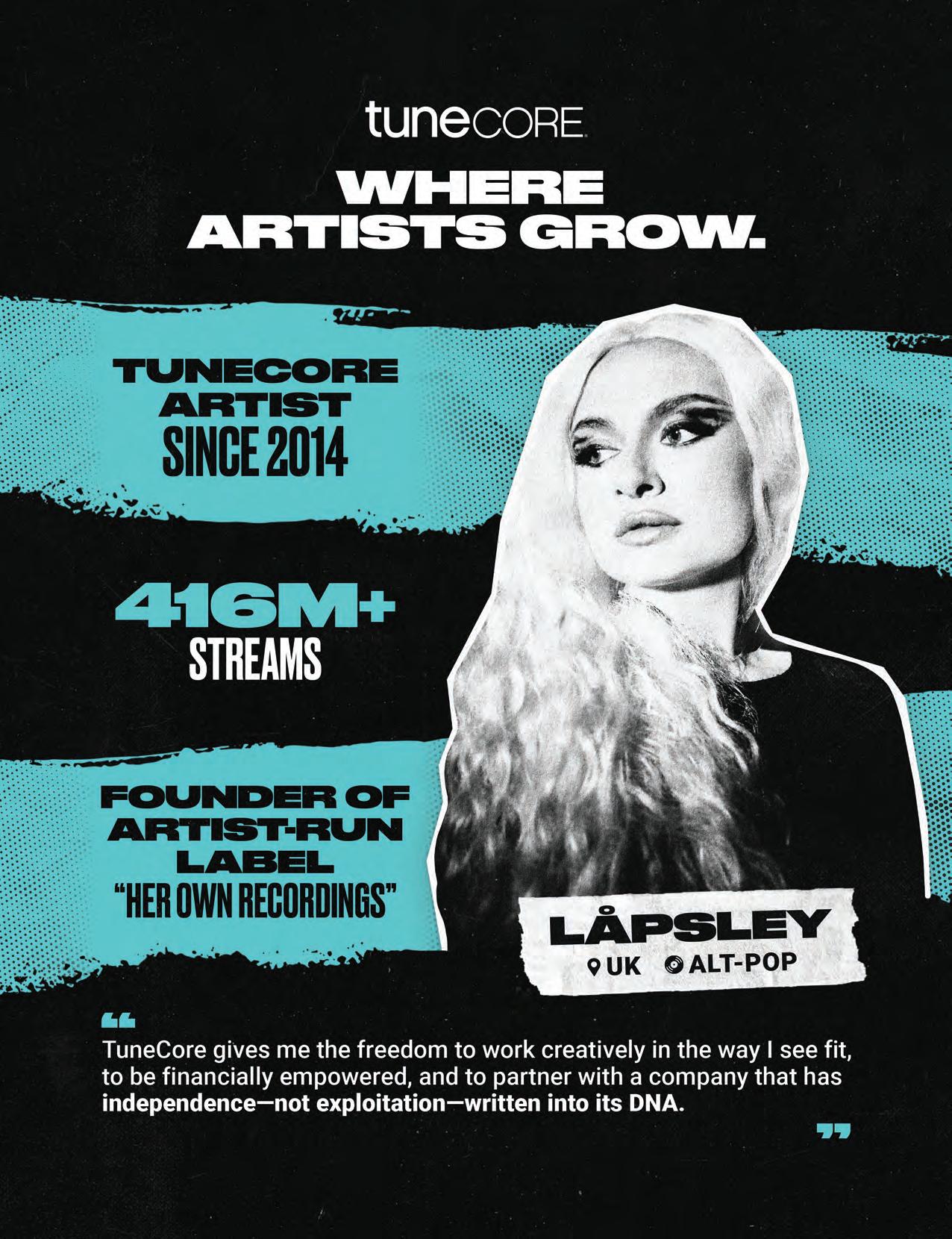
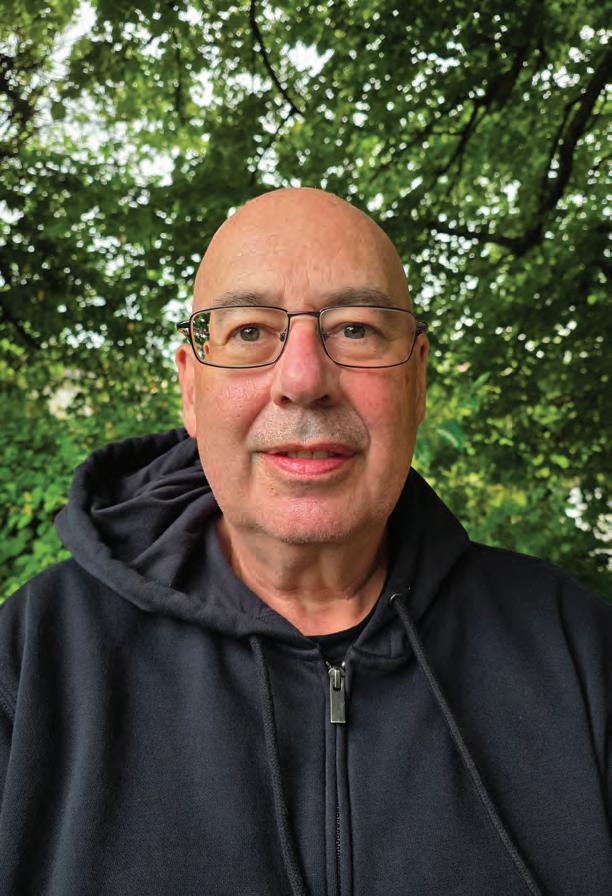

‘IT IS REALLY HARD TO BE A LABEL, I DON’T KNOW HOW WE SURVIVED’
As Cooking Vinyl heads towards its 40th anniversary, Chairman Martin Goldschmidt and Managing Director Rob Collins reflect on the label’s story so far, selling to Exceleration, current successes, the state of the indie sector and much more…
Cooking Vinyl is living up to its name.
The veteran independent label may turn 40 next year but, over the last couple of years, its chart performance has really turned up the heat: guiding Shed Seven to the ultra-rare feat of two No.1 albums in a single calendar year, plus releasing smash hit albums by everyone from The Darkness to Alison Moyet, adding to a legacy stacked with records from the likes of Billy Bragg – with whom the label did what’s generally acknowledged as the world’s first artist services deal, back
in 1993 – plus Michelle Shocked, The Prodigy, Baby Metal, Roger Waters, Sophie Ellis-Bextor, Nina Nesbitt and Passenger.
“It’s only taken us 40 years!” chuckles chairman Martin Goldschmidt, who says revenues are higher than at any point since they sold over one million copies of The Prodigy’s Invaders Must Die in 2009. “We’re getting there – slower than British Rail!”
The company – initially set up as a folk label in 1986 by Goldschmidt and Pete Lawrence – has got another lift from its recent acquisition by Exceleration Music, the independent company making waves
across the biz with its blend of acquisitions, investments and label services.
Exceleration was founded by an Avengers Assemble-style group of leading indie execs: Glen Barros (ex-Concord), Dave Hansen (Epitaph), Charles Caldas (Merlin), Amy Dietz (Ingrooves) and John Burk (Concord). Goldschmidt freely admits he was looking for an exit after a lifetime at the indie coalface, but – unlike some of his peers – he didn’t want to sell to a major or venture capitalists.
Consequently, he says the Exceleration deal ticked every box and, crucially,
ensures an independent future for the company and its staff; while Exceleration’s strong US presence and its in-house Redeye distribution company is likely to give a further boost to CV’s burgeoning release schedule.
“We’ve always had a vision of not trying to rip everyone off,” Goldschmidt says. “We try to look after our staff and artists, we’ve always been a stalwart of the independent sector and it’s great to be able to continue those traditions that have always been part of our ethos.”
The company is led day-to-day by another veteran, Managing Director Rob Collins. Collins got the music bug while hanging out with his schoolmates Eater, who were “the princes amongst the royalty on the early punk scene”. His storied career has taken him from the post room at Island, through Virgin, Some Bizarre, Product Inc and Warnerowned Radar Records, as well as a stint in artist management, before he pitched up at Cooking Vinyl in 1999.
He didn’t expect to stay long, but 26 years later, Collins is relishing the challenge as Goldschmidt prepares to ease back slightly. The founder has moved to Totnes in Devon (“He’s a constant thorn in everyone’s side, so everyone’s really enjoying it without him,” laughs Collins, “And you can print that – he’ll see the funny side!”), although he hasn’t quite managed to follow through on the plan to reduce his days just yet.
“We’re both like, ‘What else are we going to do?’”, laughs Collins. But both men enthuse about plans to use Exceleration’s additional resources to supercharge the business, as they prep forthcoming albums from singer-songwriter Callum Beattie and boyband Blue – and eye-up international signings and getting into the catalogue acquisition business.
Before all that, however, MBUK sits down to chew the fat with the two chefs to discuss their unique recipe for Cooking with gas: Collins in CV’s buzzy Camden HQ, Goldschmidt in rural bliss down in Totnes. Starting with the self-styled more garrulous of the pair, Goldschmidt...
“I can talk shit until the cows come home,” he laughs. “And living in Devon, I actually see them come home…”
MARTIN GOLDSCHMIDT, CHAIRMAN
You’ve had offers for Cooking Vinyl before, what was different about the Exceleration one?
It gives me an exit strategy, which was a big goal, but, more importantly, they’re people I know, respect and like.
Charles Caldas is a very old friend of mine and we worked together for a long time. I know the Concord lot, we worked
“Basically, when Universal have power and leverage, they leverage!”
with them on a couple of things and they were always fantastic.
Exceleration are unique in that they’re totally focused on the independent sector. Yes, they’re buying companies, but they’re also building an infrastructure to strengthen independent labels and provide fantastic back-office support. With Redeye, they’re trying to build the best independent distribution network in the world, and they understand the digital space brilliantly.
The other thing it does is give us a very strong presence in North America, which we’ve tried to do several times and never succeeded with. Now, we can compete with anyone in the North American market – we’ve got a fantastic set-up there, so it really enhances what we can do for our artists.
Of course, there are a few changes in the world of indie labels and distribution right now…
What are you referring to, Universal buying everyone? [Laughs] Yeah, that is really scary. I read [PIAS founder] Kenny Gates’
[MBW op-ed] about how nice the people at Universal are it put a massive smile on my face. There are great people working there, don’t misunderstand what I’m saying. But basically, when Universal have power and leverage, they leverage – what a surprise! And any other company would do the same!
That’s not saying they’re all a bunch of evil people, not at all, they’re doing what any big company with leverage would do. Sony do it, Warners, everyone would try – the whole idea of Merlin is for the independent sector to leverage. But to say they’re really nice people who won’t do that did make me laugh.
So, how do you feel about the proposed Universal Music Group-Downtown deal? You could ask the question, why do Universal want it? Downtown’s many things, but it’s not rights, it’s access to market and market share and I understand that But it also worries me that the independents’ access to market is seriously threatened by losing FUGA. There are some great alternatives, like AudioSalad, who Redeye are using, and a few others, so it’s not doom and gloom. But it is a big shame, because FUGA are a great company and a great way for independents to access the market.
The other thing they’ve bought is Curve, the accounting system developed by two of my ex-employees [Richard Leach and Ray Bush, along with Tom Allen], which is brilliant and so many people in the independent sector are using. That doesn’t help them with market share, so you wonder why they want it, because it could easily be sold off to the independents.
It could be that they’re going to roll FUGA and Curve into Virgin and offer a fantastic proposition to independents, but it just makes it harder for people who aren’t part of majors to compete and access the market.
So, do you think IMPALA is right to try and block the deal? I do.
Some people might point out, you sold Essential to Sony – isn’t that the same thing?
It is, yeah. Well, it’s not exactly the same, because there were so many alternatives to Essential in terms of distributors/ aggregators, although it’s helped create a monster in The Orchard. And that’s not a negative, I’ve got massive time for those guys. But they have become pretty big, and we definitely helped with that, for better or for worse.
But FUGA and Curve are different, especially Curve – there are very few alternatives to Curve, and why do [Universal] want to be doing indie label accounting? It just doesn’t seem synergistic with their core business. I’m sure there’s a plan and we’ll find out if the merger’s approved.
Most of the big UK independent music companies have been around for decades. Where are the new ones? Well, there are some great indie labels coming through Korea!
The market has changed. There are a whole number of factors – the dominance of English language repertoire is less and you’re seeing international repertoire becoming more important and having a bigger market share.
Plus, it is really hard to be a label, I don’t know how we survived. I’ve probably learned how to run a label now, just as we’re sold and I’m not needed anymore!
When you did that first artist services deal with Billy Bragg, did you realise how important the model would become for the industry?
Not at all! When you say we did it, it was really simple – [Bragg’s manager] Pete Jenner said, ‘This is the deal’, and I said, ‘Where do I sign?’
I didn’t even think about it, because I really wanted to work with Billy. It was all Jenner’s idea, I can’t claim any credit except for signing the thing.
But it’s actually a fantastic business model. People think it’s great for the artist, because they just see the headline figure that the artist earns all the money.
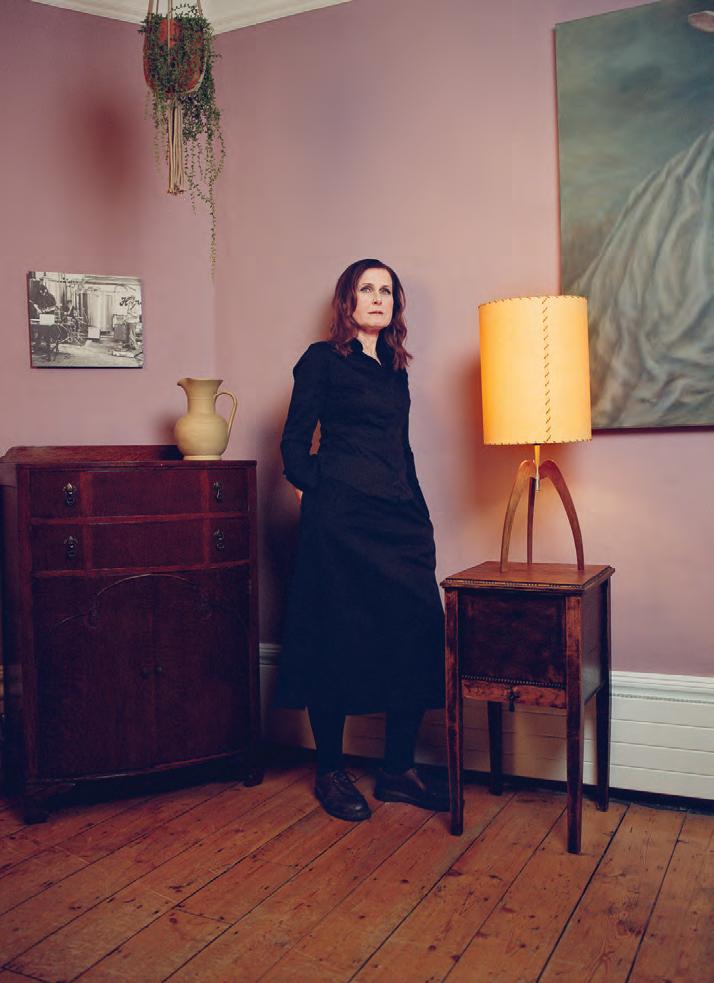
But it’s actually not as good as all that for the artist, because they also bear all the cost.
But what it does do is really align your interests with the artist. It takes away a lot of the ‘us and them’ that often happens between artists and record labels.
In the olden days, artists used to come in and go, ‘Spend more money on everything, you’re a record label’. And now the conversation is, ‘We could do this, this and this – or we can pay you some money’.
We always say, ‘These are the options, this is what we’d advise, what do you want to do?’ – and it’s fantastic to be able to give them that control. But they make the decisions – and take the consequences.
Is it difficult to step back after 40 years at Cooking Vinyl?
It depends on your team. If you’ve got a really good team and you trust them, it’s a lot easier – and I’ve got a fantastic team.
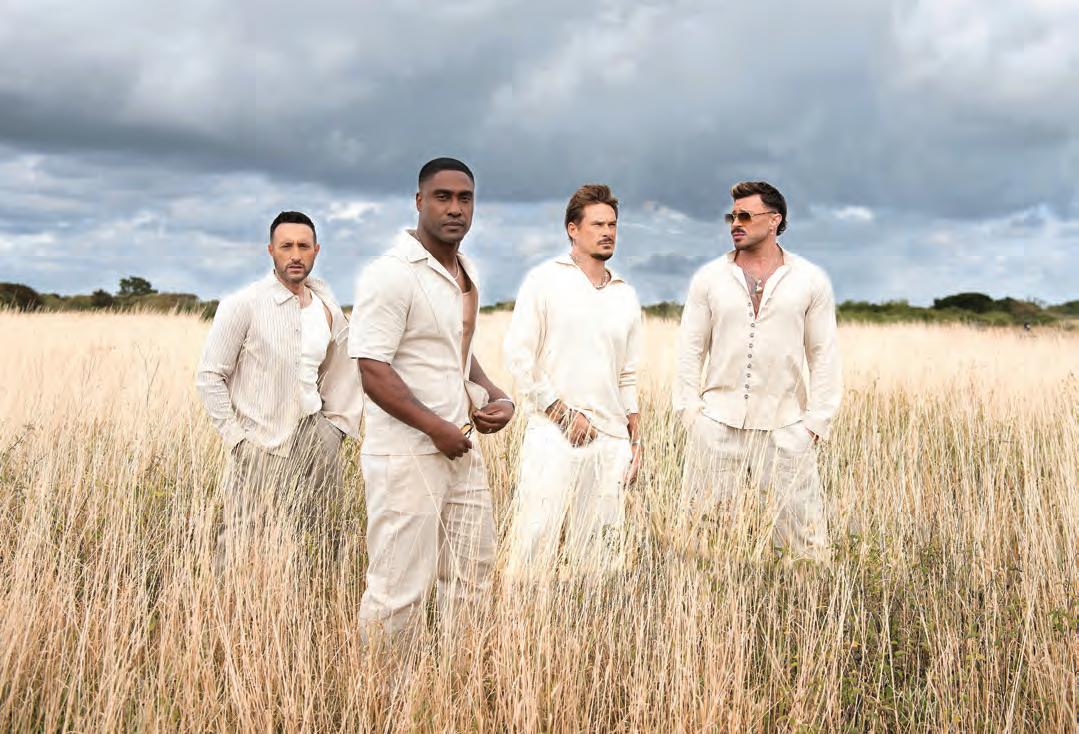
The big thing I want to say [to the wider industry] is, you’re really privileged little fuckers working in the music industry –enjoy it! Do try to work together more and have more fun. It’s such a privilege to be able to work with artists and music; enjoy the ride!
ROB COLLINS, MD
How have you managed to make Shed Seven bigger than they were in the nineties?
It was real old school: band, label, promo team – everyone just mucking in and all being on the same page. It was like the old Werner Herzog movie [Fitzcarraldo], pushing the boat over the hill.
The band have done it themselves as well, by being so true to what they do. They’re fantastic communicators. They’re geniuses at doing their own social media – they couldn’t do it for another band, it’s not like they’ve got a template we could
roll out for any other band, but the way they talk to their audience is just perfect.
They’re such an honest, hard-working bunch of guys who are really humble with it all, and so thankful they’ve been given this opportunity to come back and be probably more successful than they were back in the day, certainly in terms of selling tickets.
And the competition’s not there anymore, there’s only a few of those bands standing – and a lot of them struggle to do the numbers Shed Seven do.
You’ve done this with a few artists now – is there a formula for reviving people’s recording career?
There’s a loose template that you can apply to a lot of artists and releases, whether it’s The Darkness, who we almost got a No.1 with last year, or Blue, who we’re releasing a new record with next year.
There aren’t 10 things you need to tick that will work for every artist, because every artist is going to lean in in a different way. But to sell the numbers you need to get those Top 5/Top 3/No.1 records, so much is expected from the artist to lean in now, with signings, in-stores, signed stock, delivering on their socials… That’s the template, but it’s almost like an insurance policy when you do a deal to make sure the band is willing to do that work – or else, where are the sales going to come from?
You sell a lot of physical product, but some people in the biz seem to see that as cheating somehow…
Yeah, it’s not real, it’s rigged [laughs]. I don’t think there’s anything wrong with superfans buying the black vinyl and streaming it; or buying a super-deluxe boxset of the same record and not streaming it; or someone who’s just an avid collector and buys all

five vinyl formats because they want each different cover.
I used to buy various formats of records when they came out – the 7”, the 12”, the 2x7”, it’s not new.
I’m not dissing people who only stream, or saying they’re not real fans, but there is such a commitment when you make that purchase, in the same sense that there’s a commitment when you buy a T-shirt or a ticket. It’s at that level. Streaming is more passive.
There’s a lot of competition in the established artist area. What’s your pitch to get people to go with Cooking Vinyl?
We roll out the history – not just the recent history, but the longterm version. The other thing that persuades people is, they meet the team and feel that there’s a group of people who will be here for the foreseeable future.
It’s really stable and they’re really committed – we try and articulate that to anyone who comes in, be it a manager, artist, lawyer or accountant.
It’s about the passion you put in as well, because that can make or break a record –
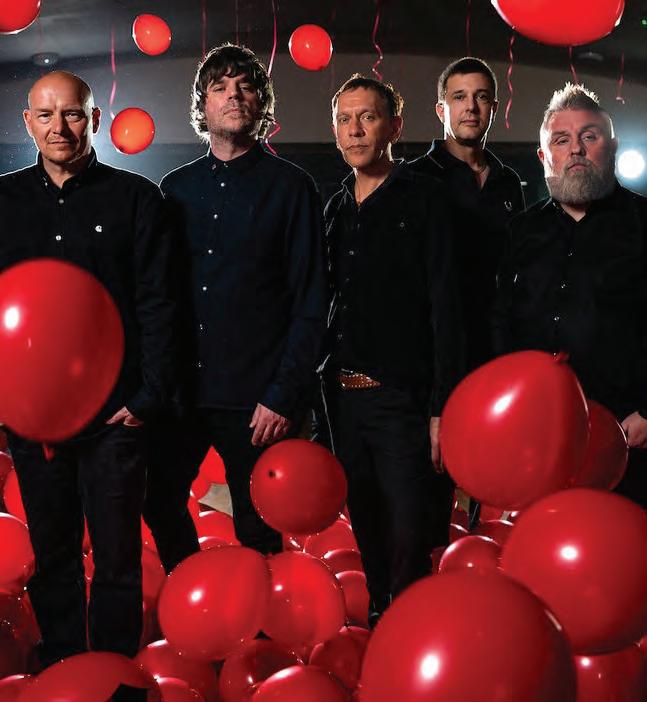
certain people can come in, the MD can sit there and do a fantastic talk but, when it gets down to the troops, they don’t know, because they’ve never met them.
We like to bring the troops out and say, ‘These are the guys you’re working with, this is the team – you’ve got total access to everybody’. And hopefully they feel something.
“We haven’t had the respect that other labels get and I’m not sure why.”
Did you really try and sign The Smiths when you were at Virgin?
Yeah, but I was pooh-poohed on that one. The people at Virgin just didn’t see it, they didn’t get the songs.
I remember having a cup of tea and fish and chips with the band and their original manager on Portobello Road. But I think
they had their hearts set on Rough Trade; Morrissey certainly did.
In the past, you’ve often described Cooking Vinyl as an underdog. Is that still the case?
I still think we are, even after 40 years. We haven’t had the respect that other labels get and I’m not sure why.
Maybe it’s because there was a phase where Cooking Vinyl wasn’t signing the most fashionable artists. There was an element of having to sign certain artists to keep going. You can only do what’s put in front of you, but some of the press was a bit mean – we used to be called ‘the label where bands go to die’.
Well, now you’re the label where bands go to come back to life… Exactly, we can re-energise, we’re like a Duracell battery.
So, can Cooking Vinyl last for another 40 years?
If the music business survives another 40 years, I don’t see why not! n
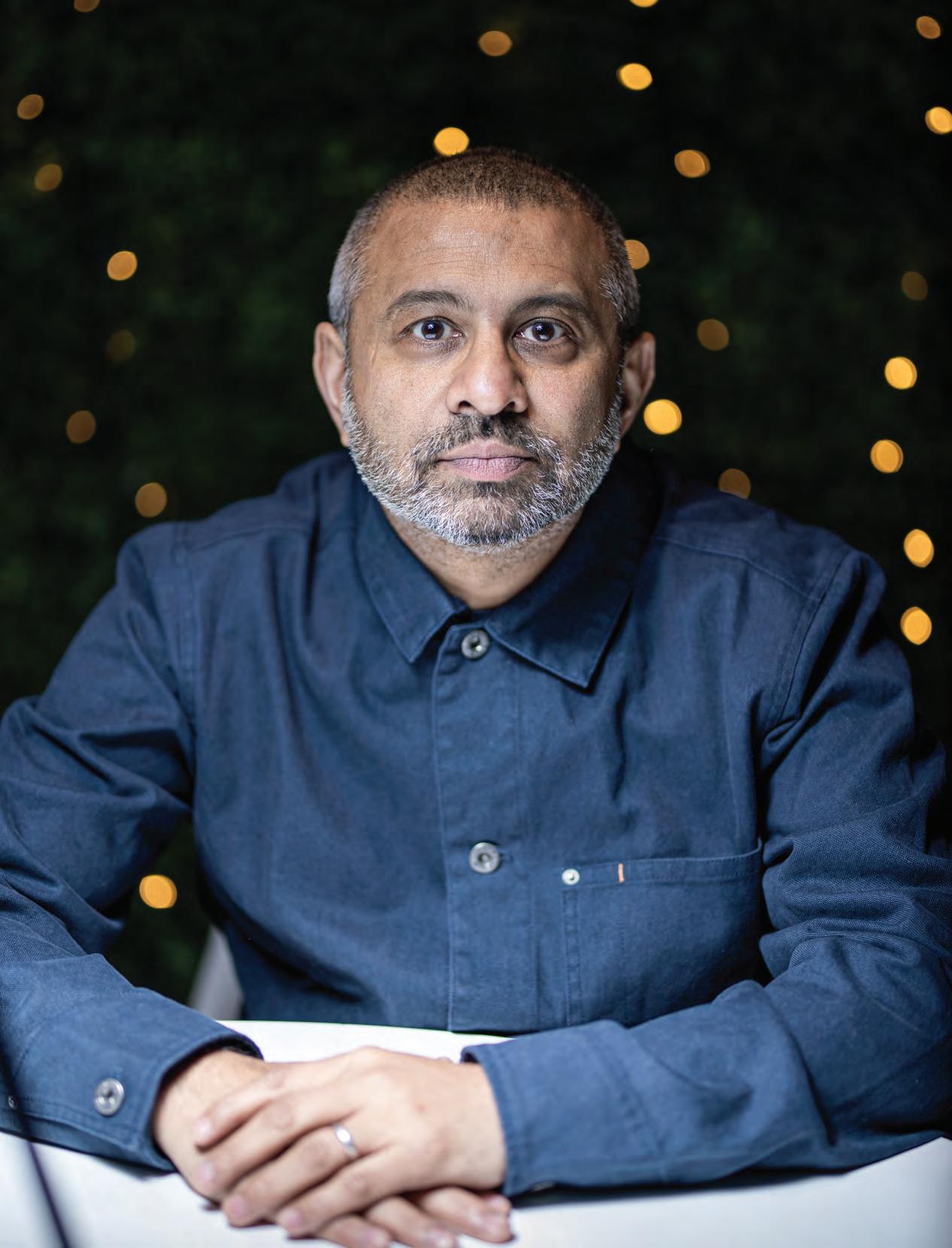
‘IT’S ABOUT BRINGING IN FRESH ENERGY – AND THAT FRESH ENERGY WILL CARRY THE WORK THROUGH’
MBUK’s regular check-in with the Did Ya Know? podcast sees Adrian Sykes talking to Ammo Talwar, a key figure in the Birmingham music scene and the Chair of UK Music’s diversity taskforce…
Agreat many lives and careers have sliding-doors moments – pivot points that can take our protagonist in one of two very different directions.
In fact, it’s a phrase and phenomenon that is so common it’s often avoided as being something of a cliché. With Ammo Talwar, however, and the leap of faith that led him into the music industry, there’s no danger of that; he just has to describe what actually happened.
Looking back to his adolescence in early-nineties Birmingham, he says: “I suppose, fundamentally, it was my brother’s fault. I actually graduated in civil engineering. I used to design highsecurity doors for prisons and hospitals. You’ll always need doors, I thought…
“My brother, meanwhile, was managing an artist called Apache Indian, touring the world with an entourage. I had a choice: keep on making doors, or take a chance on a bit of that excitement. So I started Punch Records, a shop heavily influenced by the culture around me.” A career in doors slid away, a life in music opened up.
The music in Talwar’s childhood home was “very spiritual, quite religious”. So what he listened to with his friends was “a form of rebellion”. It included the early Electro compilations, James Brown, Motown and, at school, mainly reggae.
Talwar is proud of – and inspired by – the city where he grew up and still lives. And by a handful of influential figures from the generation before him that shaped Birmingham’s (and the UK’s) Black music scene.
He says: “There was a kind of uptown/downtown split, like the difference between, say, Brixton and the West End. The uptown clubs were more commercial; the community scene was more creative. Our clubs and venues were in the communities, that’s where the new sounds were developed and celebrated.
“Then came the real heroes – the first DJs, promoters, producers and managers to really bridge those scenes. I’m thinking of guys like Mambo Sharma, Shaun Williams, Erskine Thompson and Lloyd Blake. They helped take the community vibe uptown and helped shape popular Black British music in Brum.
“Risk-takers like these gave the people cultural confidence. They gave me confidence to quit engineering and open a record shop selling only Black music.
“We couldn’t compete on the popular side, so we became specialists straight away.”
His more tangible rebellion, ditching a ‘proper’ job to open a record shop, didn’t, however, hit as hard as he expected. “Initially my parents were fine. For the first year they thought I was selling bhangra! They saw me as staying in the culture, running a business.”
Talwar grew up in Aston, a district he describes as having a similar story and cultural outlook as places like nearby Handsworth, Brixton, St Pauls, Toxteth and Chapeltown. “But Birmingham’s streets felt more mixed to us at the time. We had racism, we had oppression, but I think our generation was divided more on class rather than race or religion.
“The Asian community, the Black community, the white community; diversity just felt natural. Like the way we used to move from, I don’t know, roti to jerk chicken to fish and chips. So I suppose it was natural that we would listen to a mix of musical genres; it felt quite fluid rather than forced.”
“Remember, we were up against HMV, Our Price etc., which meant we couldn’t compete on the popular side. So what we did was become specialists straight away.
“And it was a beautiful period, that kind of new jack swing time, sort of pre-grime, all those interesting labels. At the same time, I became a promoter, putting on shows by the artists who were pioneering back then. It was an exciting time and we were at the heart of it.”
Decades later he is still at the heart of it – more so than ever, with a new record label looking to sign and develop local artists.
But alongside that, as part of UK Music, he has also become a key figure in the UK music industry’s drive for diversity and inclusion.
It is a mission he has tackled with real vigour and purpose – and one that he knows he wouldn’t have understood and appreciated without his own unique background…
Punch Records became a real hub, didn’t it?
It did, and if I had it now it would be called an art centre rather than a shop, because our space was open. We had community stalwarts, musicians, DJs, students – we didn’t say no to anybody!
And the people who came in expanded our business – with
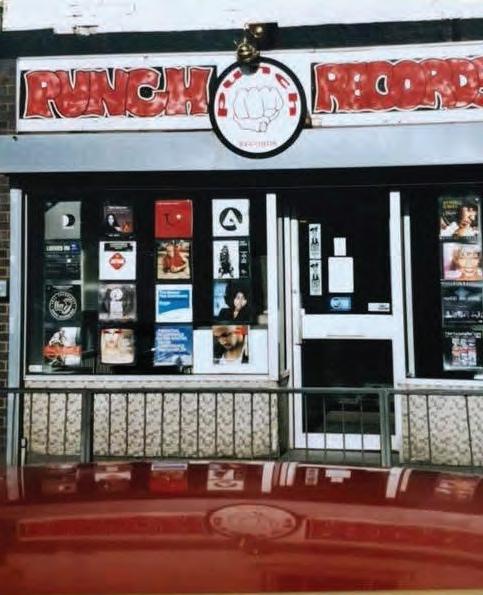
Black music always at the heart of it. But we still made no money!
In 2003 I realised I needed to do other things that supplemented the business, and at the same time Napster kind of killed us
But we were lucky, because in 2004, we pivoted into something else, which was, I suppose, the company that most people know us for in terms of touring and festivals and books and all the other bits, but with the same core values as before: openness, fairness, access.
At what point did you feel that you wanted to be more than just a business, and instead make sure you could give people a voice and a platform?
When we moved ‘uptown’ to Digbeth, we saw that, even as a Global Majority city – we are, I think, 54% non-white British – diverse artists and music still weren’t getting into those white spaces: the museums, the arts venues, the galleries. So I set up Birmingham’s first commissioning black festival, BASS, as our response.
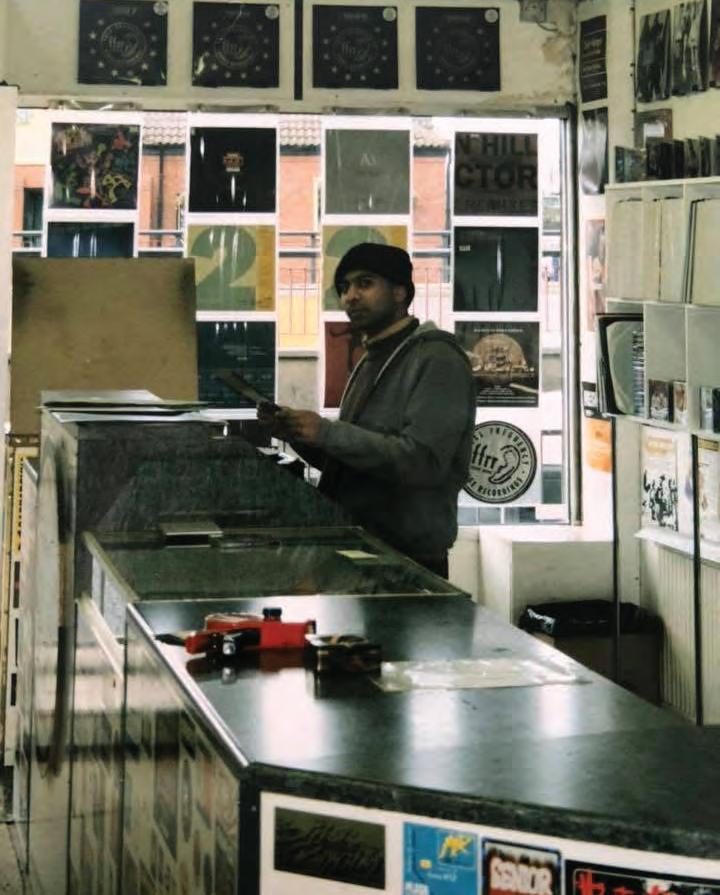
measure and evaluate the data on who was participating and who was excluded.
How did you get involved with the UK Music diversity movement?
Most of it was naturally based on the work I was already doing: wanting to make change, looking at the data. And some of it was people wanting fresh opinions – especially from outside London.
“This time around was very, very different. This time people wanted meaningful change.”
Our drive to do that, to push for equality of opportunity and access, was happening around the same time social media was giving more people a voice. Plus, the technology had arrived to
Keith Harris and Paulette Long had set the tone. This wasn’t the usual PR cycle: someone writes a report, you get a couple of quotes in the trade press and you’re good to go. This time around was very, very different. This time people wanted meaningful change.
UK Music was the only organisation that was really getting into the data around the workforce, and had done the hard work around analysing it and saying we need to do more. There’s no point in developing a report if there’s no real impact behind things that you want to do. So we set a robust plan that cut across a lot of the trade bodies, saying we need to do more; we need to be better and lead.
That became the 10-point plan which addressed language, governance, leadership and achievable targets.
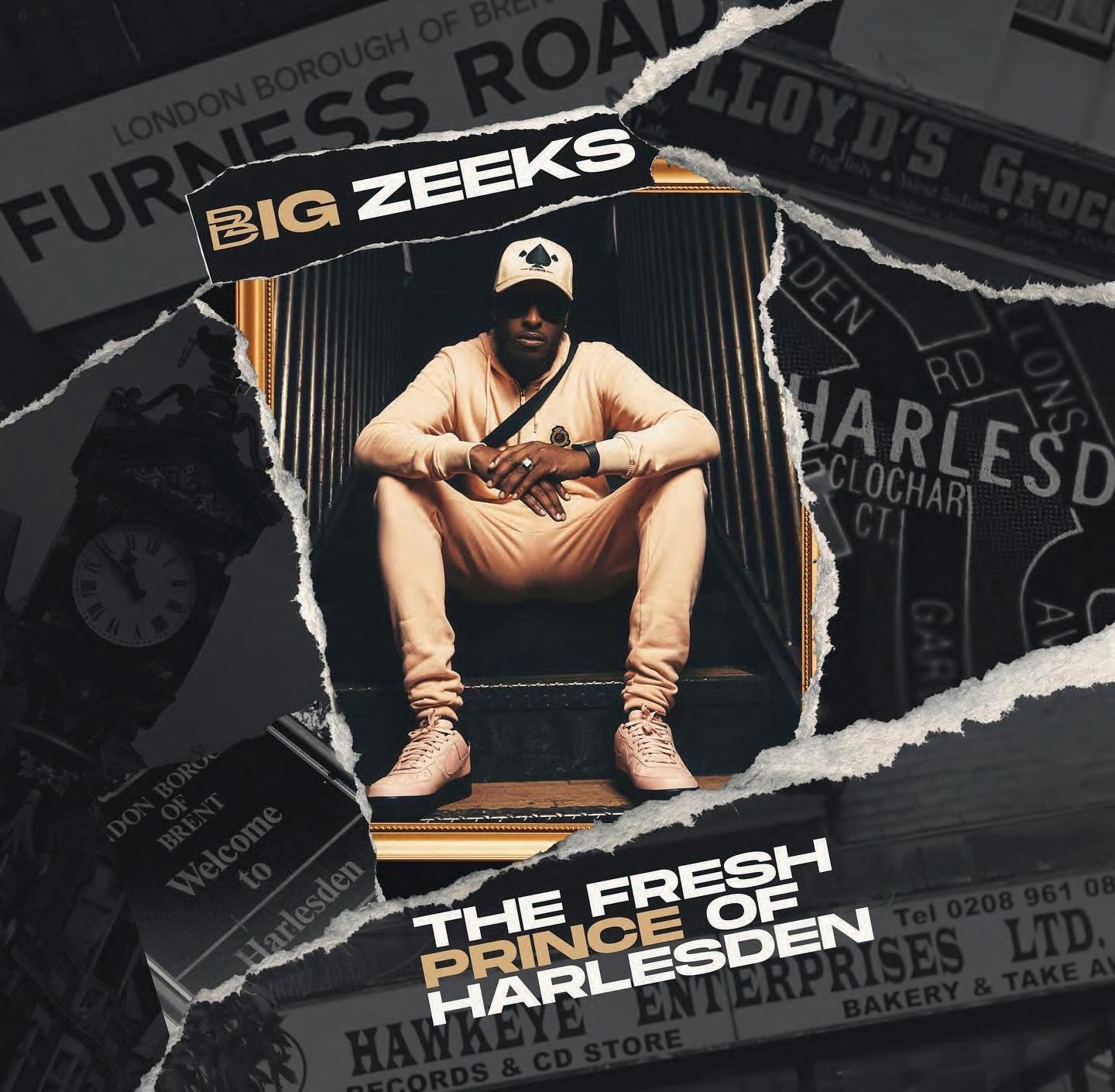
What did it specifically set out to do and how much of that has been achieved?
The 10-point plan was a series of things that the industry could do within a defined timeframe. Simple things like, get rid of the word ‘BAME’; don’t use the word ‘Urban’ – and then some tougher things. Like, maybe you need to change your governance structures and review senior leadership. This was mainly targeted at trade bodies that sit under UK Music and about 90% of that work has been completed.
We’ve had loads of wins. We’ve had staff wins, investment wins, and we’ve had organisational wins around companies
that have started looking at things that they just weren’t seeing before 2020.
Across the broader industry, some elements have been picked up, others less so. We always framed diversity as an input to growth and cultural significance rather than an end in itself. We’ve embedded some powerful green shoots that will come out further down the line.
Do you think there’s been real commitment and real change in the years since there was a lot of talk about DEI in the wake of the murder of George Floyd?
There has been some significant change across the last four years, and some companies have really leaned in. But we’ve always said this is a long-term journey and we have some way to go before we are reflective of the UK communities that we serve. The sector is moving, but we need better pace.
Our communities have changed. London is going to become a Global Majority city soon. Birmingham already is. And what we need is our industry to reflect the people that we serve. It’s that simple.
Another area that you’re working hard on is pay gaps, particularly in regard to gender and ethnicity. How do we ensure parity?
It definitely helps to have a really strong peer group in whatever part of the music industry you work in.
You need allies in your organisation to hear what you’re saying. You need to speak up to your line managers – but this can be a problem, especially when you’re junior or you’re still working up through the ranks.
We need to not only look at new recruitment, we need to look at the middle layer in terms of how we incubate talent.
And look to the executives that have done exceptionally well in the UK and globally to make a change. There are already some great initiatives; Power Up, run by the PRS Foundation, is a really good example.
You’ve talked very clearly about racism in the music industry before. Where do you think we are up to on the road to rooting that out?
Well, systemic racism is everywhere. And rooting it out of the music industry is the same as rooting it out of the education sector.
It’s a historical thing. It’s a systems-based thing. And these things take time.
The problem historically was simply that there just weren’t enough of us in those senior positions. And you can see now, slowly, there are more and more individuals that are taking up senior roles, whether it’s Austin [Daboh] at Atlantic or Alex and Alec [Boateng] at Def Jam.
These are younger people from more diverse communities, so not just traditional Caribbean, but African Caribbean backgrounds, taking up senior jobs where they will look at Black music in different ways and work in different ways to bring the right talent through.
“I’m seeing new people, I’m seeing different ways of working. Those are some direct wins.”
This isn’t about employing people because of colour or ethnicity. It’s about talent, supporting new talent and recognising talent. Because sometimes we all have our biases, and sometimes talent talks differently and acts differently to you. So, sometimes, it’s important to lean into things that you feel uncomfortable with.
What working at UK Music and being the Chair of the Task Force has taught me is that we can’t work in silos. We can’t be just in King’s Cross or SW1; we’ve got to come together better.
Ultimately, what we want is for companies to recognise these issues independently and deal with them without the need for outside prompting, right?
Ideally, yes – it would be great if companies recognised that gender and ethnic pay gaps are real problems, and addressed them in-house, and some are doing very well.
But that’s sometimes not the case and, in reality, external accountability and concerted effort speed things up, so we need to keep pushing.
What are the specific areas of progress that have given you hope?
Seeing people of colour in senior positions across various teams and companies is one. And some bodies changing their articles of association to enable more inclusive boards.
These are things that I’ve witnessed myself. I’m seeing new people, I’m seeing different ways of working. Those are some direct wins.
Don’t get me wrong, there are certain parts of the music industry that are very, very slow. Because, ultimately, it’s about booting out some of the old powers and bringing in some fresh energy. And that fresh energy is what will carry the work through.
It’s about looking left and right, and, as I said earlier, leaning into things that might not feel comfortable with, or spaces where you maybe thought you wouldn’t have ended up. Because there shouldn’t be any space you’re not comfortable with – and you never know what the outcome might be.
The DIY/independent movement is massive. But DIY doesn’t mean do it by yourself. It means do it yourself with others in your community. And those networks are going to get bigger and stronger.
What are you up to at the moment as regards your own business, outside the UK Music role?
The main thing is, I’ve set up a label, Parlay Records. I should have done this 10 years ago, but I think there was an element of fear around it.
Now, the thing that’s exciting me is, I’m getting into the heart of actually signing artists and developing talent. We have worked with Big Zeeks to launch his UK debut album, The Fresh Prince of Harlesden and some other interesting grime and rap artists. Before, we were always on the fringes. Touring is on the fringes, a festival is on the fringes, a record store is on the fringes. When you’re actually looking to sign and develop artists, you are at the heart of what this industry is really all about, and it gives you a slightly different energy.
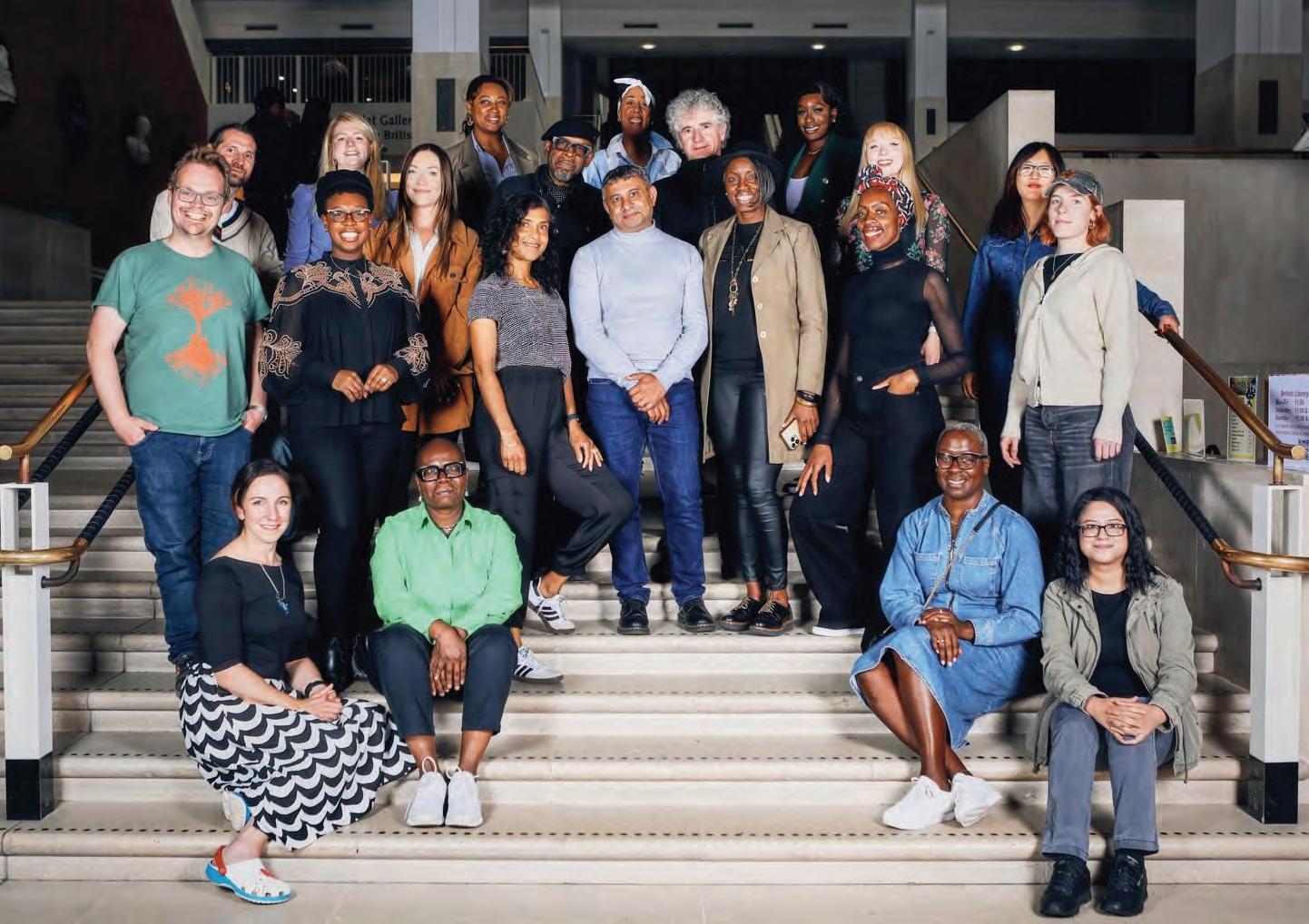
We’re signing artists, we’re looking for talent, whether it’s local or national or international. I’m very, very excited about that.
I’m also working with The KOKO Foundation, which has two main drivers: protecting the environment and developing talent around the venue. We’ve been working behind the scenes for the last few years – especially in the communities.
Camden is a very complex area – you’ve got a lot of wealth and you’ve got a lot of poverty. KOKO is a venue that does amazing work in the live sector. But they also realise they’ve got to give back to the people of Camden and those areas that are surrounding Camden. That was the driving force behind shaping the foundation with an amazing group of people.

You’ve achieved a great deal already, but what are your biggest remaining ambitions?
I just want to sign great artists to our label. I want to keep on doing things that have more of an impact, especially on my city.
If I have a legacy, I want it to be that I helped carry on the legacies of the original pioneers I mentioned earlier. They made the foundations, we’re just building on them. And I genuinely don’t know where that’s going to take us.
I don’t know where the music industry is going or how it’s going to grow and change, but I do think we’ll still be right there at the centre, in the vortex of change, supporting new talent and working with great artists. n
This interview is taken from a brilliant podcast series, Did Ya Know?, which tells the often unheard stories of key figures in the British music industry, focusing initially on pioneering executives of colour. The team behind the pod includes Stellar Songs co-founder Danny D and Decisive Management co-founder Adrian Sykes. MBUK and our sister brand, Music Business Worldwide, are proud to be partners and supporters of Did Ya Know? You can listen to it wherever you find your favourite podcasts.

KEY SONGS IN THE LIFE OF…
Andy Sloan-Vincent
The new(ish) Head of Music for Northern Europe at Spotify talks us through eight songs that have shaped his taste and influenced his career…
Before we get into it, as part of a sort of prelim chat about general current listening trends, Andy Sloan-Vincent mentions that he’s been listening to a lot of technical death metal recently. Thankfully, this is merely an observation, not a threat.
So his list of Key Songs is not packed with tracks by Disembodied Tyrant, Lorna Shore and Sylosis. (And yes, Wikipedia did have a role to play in the creation of that sentence).
Instead it’s an eclectic list that runs from pure pop to classic rock via US R&B and UK grime.
Sloan-Vincent has been at Spotify for over a decade. In 2021 he became head of Global Music Programs where he was responsible for rolling out major initiatives such as RADAR, EQUAL, GLOW and Spotify Singles. He was also involved in the execution of Spotify’s sponsorship of Barcelona, as well as delivering the annual Wrapped campaign.
Earlier this year he switched lanes to become the Head of Music for Northern Europe. He says: “The remit is a classic music industry DSP role. So I’m looking after artists and label partnerships. And then, kind of uniquely for Northern Europe, we have a full studio functionality out in Stockholm, which we’re using across the UK and Ireland as well.
“It’s about surfacing artists to our audience, helping them find new audiences. It’s what I’ve always done to be honest, but from a different angle.”
He jokingly describes the process of selecting his Key Songs as “awful” before revealing that, “to share the pain I set a bunch of my friends the task of trying to do the same thing – and they hated it too”.
He also says that, when he shared his choices with the group, he was initially concerned with the amount of replies that were variations around the question, ‘You sure?’
In the end though, he decided he was. And he certainly has no doubts about an impeccable jumping off point…
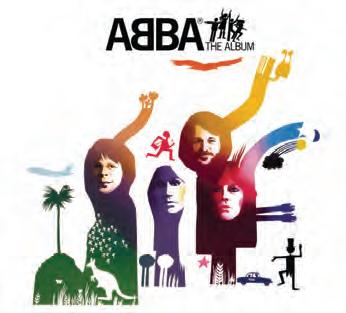
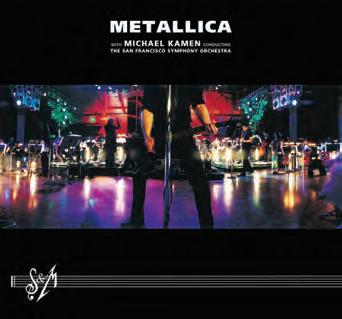


“I toured in a rock band during those years, and our van had Girls Aloud on all the time; it was the main thing we would all agree on.”
1) ABBA, The Name Of The Game (1977)
One of my earliest musical memories is of being in the car with my mum, and her just blaring ABBA songs out.
I think she probably only had one tape. So that became really informative in developing my musical brain.
Their influence on pop culture and pop songwriting is huge – and still evident today.
Even now, if you want to learn about hooks and about pop, you can just listen to ABBA Gold; it’s all in there.
I’ll be honest, I very nearly chose Heaven by Bryan Adams in this slot – which is not quite the same. But they’ve both got huge hooks and they’re both songs where, when they come on, you’re surprised to find you know every single word. You might not have realised you do, but you just do.
2) Metallica, Nothing Else Matters (1991/1999)
I’m leaping forward 14 years here – more in fact. Because I’m talking specifically about the S&M [Symphony & Metallica] version.
My brother had it on video, and we watched it a lot together. I had listened to rock music through the nineties, to the extent that this list could have been allmetal, but I don’t think I’d ever watched any of the big orchestral projects. And suddenly it was like watching really heavy music with this huge symphonic sound behind, and it just swells.
It was also probably the first time I’d heard a whole crowd sing and chant back to the band on stage. And for me that’s still powerful now, whether it’s a big sporting event or at a music festival, it just makes you feel something.
We’ve been seeing it recently with Oasis. I was at their first London show and probably the best thing about being there was watching – and hearing – 70,000 people having the best night of their lives.
3) Dog Eat Dog, No Fronts (Jam Master Jay Remix) (1994)
This was originally released on Roadrunner, but as a British kid in the nineties, I discovered it through The Zig And Zag Show
As a band, they definitely had a niche, which was kind of hip-hop meets midnineties punk/hardcore. With a saxophone.
I pretty much grew up in punk and hardcore, and that’s definitely what I was into through college and uni.
This was quite early in the formative process that would eventually lead to bands like Rage Against The Machine.
I obviously played it while I was pulling this list together, and you know what, I still love it.
4) Reuben, Shambles (2001)
Reuben were local to me. I grew up in a town called Fleet, in Hampshire, and they were sort of Aldershot/Camberley way, which is a handful of miles down the road. They’re probably the band I’ve seen live most in my life – I’d say more than 30 times. They were managed by one of the nicest people in music, Barney Jeavons, who is very much still kicking around in the business.
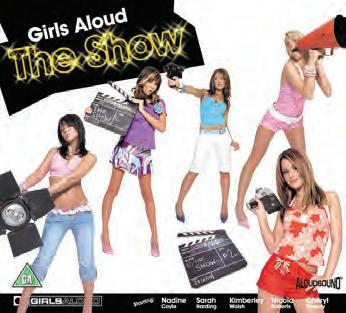

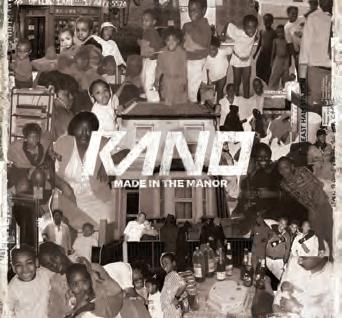
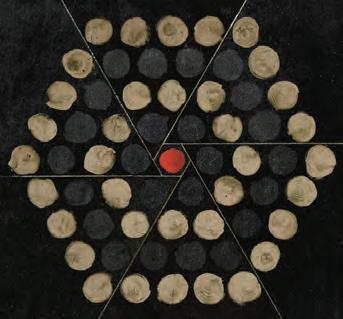
I think the first time I saw them was in a tent in the middle of a field between Farnborough and Aldershot. They were the first band on. The second band were Hundred Reasons, who went on to do far bigger things.
In fact both bands went on to have very strong British touring lives, and I probably could have switched Reuben out for Hundred Reasons – or Biffy Clyro, or Hell Is For Heroes, or Vex Red.
There was a very clear moment in 2001/2, where a bunch of British bands broke out, or almost broke out. And Biffy have obviously gone on to be massive.
But, yeah, Reuben are in the mould of a classic British underdog story. They toured relentlessly, they released three albums, and then they put out a compilation called We Should Have Gone To University. Which I think proves they never took themselves too seriously.
5) Girls Aloud, The Show (2004)
Maybe ABBA was a prelude to this, but I think Girls Aloud were the band that taught me pop music could appeal to people who listen to punk records.
Xenomania had this talent for creating almost progressive pop that was really smart. And I’m sure it also helped that the band themselves were really cool.
I toured in a band during those years, a rock band, and our van had Girls Aloud on all the time; it was the main thing we would all agree on.
Like most things they did, The Show is just really, really great pop music – and is also a pretty good signpost towards the sort of brilliant pop label Polydor would become.
6) Jhené Aiko, Bed Peace (2013)
This is about the continuing evolution of my musical brain.
I didn’t grow up listening to a lot of R&B, I wasn’t really exposed to it very much and the local scene certainly wasn’t focused on R&B.
But thankfully my work has given me the opportunity to hear so many different genres, from all over the world.
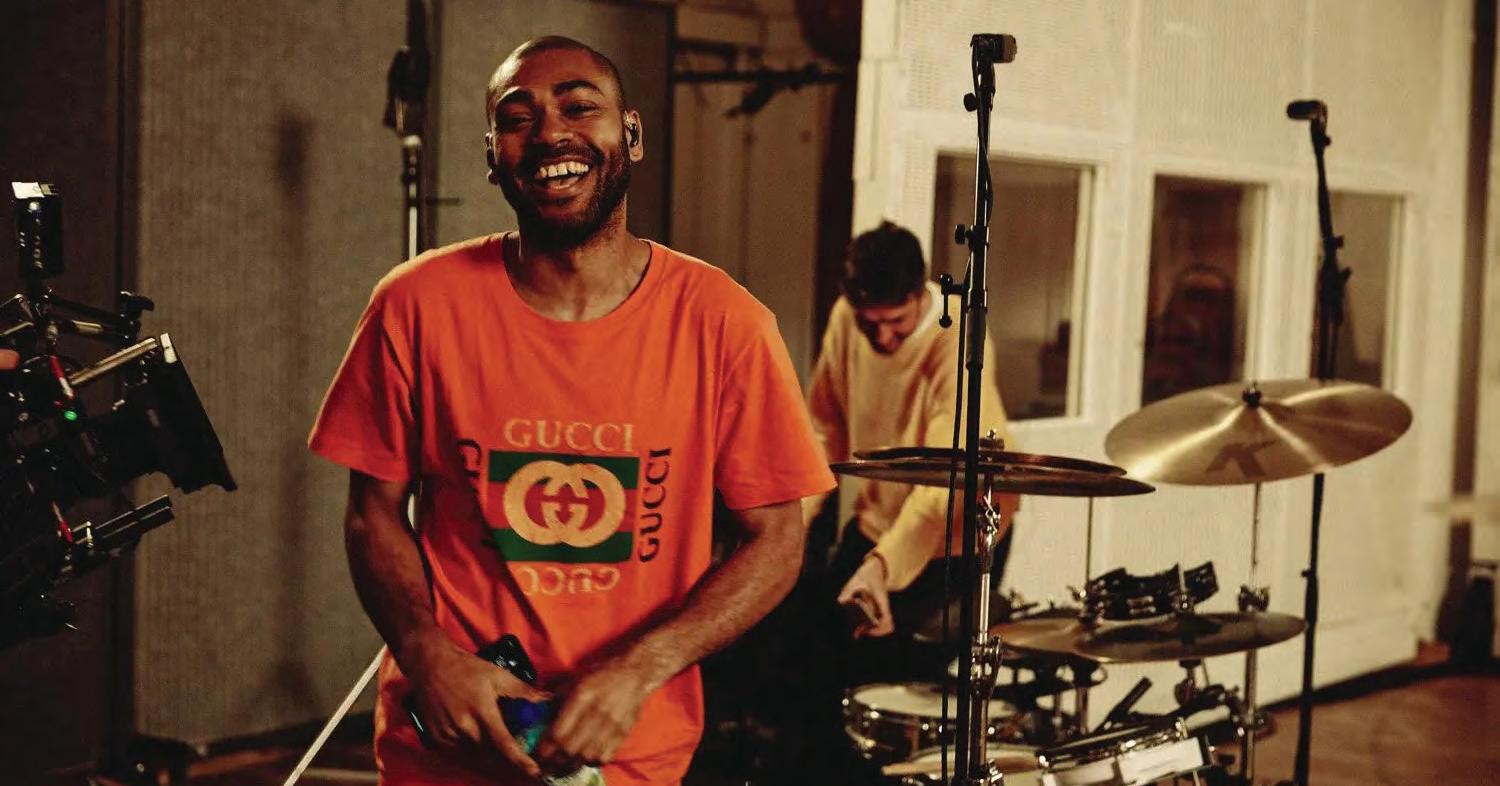
In this case, what’s significant is that when people hear what I do they often ask, ‘Who’s the coolest person you’ve met?’ And Jhené Aiko is definitely up there. She’s just so confident in who she is, she’s laid back and, yeah, cool as fuck.
And then Bed Peace as a track represents some of the best elements of R&B in the modern era, I just love it.
7) Kano, 3 Wheel-Ups (2016)
Again, I didn’t grow up in a grime or hiphop space, and I probably came to it later than I should have.
Kano has been an icon in that scene for over two decades and is one of the first amazing grime artists that I became aware of.
I had a bit of a career highlight with him six years ago now, maybe even longer. We had him into Abbey Road to record a Spotify Singles session. He brought a full steel band with him, and it was just such a fucking cool day; one of those days you occasionally need to remind yourself that working in music is a privilege.
He was unbelievable, and an absolute pro. He didn’t need a second run at anything. He took a couple of goes just
“It was just such a fucking cool day; one of those days you occasionally need to remind yourself that working in music is a privilege.”
because he could. But in actual fact, the first take was perfect every time.
8) Thrice, Beyond The Pines (2018)
Thrice started out as a punk/hardcore band, and they’ve evolved across 25+ years, becoming more mature, more progressive, influenced by bands like Radiohead. At the same time, the vocalist, Dustin [Kensrue]’s voice has become awesome and gravelly and dusty.
In 2018 they put out an album called Palms, which was probably one of their softer records. It closes out with a track called Beyond The Pines, which is a beautiful ballad. It’s about seeing someone after life; it’s just gorgeous.
They’re another band that have a really fervent following, and can tour through the US with huge audiences at every venue.
In the UK, the size of the venues varies, but it always sells out and it will always be the same people that I see there. They’re a band that have become a lifetime relationship and I love every single thing they’ve ever put out. n
IT TAKES AN ARBITRATION WITH MILLIONS TO HELP US BACK: GETTING MUSICIANS & FANS TO WORK THROUGH THEIR DIFFERENCES
Eamonn Forde suggests that mediation could heal the rift between warring band members before (or after) they split up – especially as they almost always seem to fall out over the
Musicians fall out with each other all the time. Of course, it’s always musical differences and never anything to do with fragile egos, greed, envy, politics, revenge or sheer pettiness.
Time is a great healer. Greater still is a cheque so big it can blot out the sun. Just ask [REDACTED] and [ALSO REDACTED] as they hoover up bales of cash faster than they used to hoover up lines of [missing font] that were thicker than Popeye’s arm.
Sometimes, however, things curdle so badly that there is no way back as a creative unit. Yet the members have to find a way back as a business unit.
As far as rancorous feuds go, the one between Daryl Hall and John Oates was a doozy. In 2023, Hall accused Oates of deep betrayal, while Oates accused Hall of “inflammatory, outlandish, and inaccurate statements”. It went so acidic that a judge had to pause the sale of Oates’ stake in Whole Oats Enterprises (covering big money-spinners like record royalties, trademarks, social media assets, and name and likeness rights) to Primary Wave until their impasse was resolved.
In August, court filings showed they had reached some sort of resolution. This was down, in a large part, to arbitration and mediation. I would not want to even dare suggest that many, many musicians are emotionally stunted and brattish tyrants who have been overindulged for far too long and permitted to get away with behaviour than even a toddler, midtantrum as their feet threaten to kick holes clean through the floor, might think is too much. But sometimes they need a grown-up to come
same 10 things…

“Sometimes artists need a grown-up to come in, take control and stop them pulling each other limb from limb.”
in, take control of things and stop them pulling each other limb from limb. Bandmates can help. Managers can, too. As can family. But when all that fails, it is time to call in the professionals.
Mediation comes in many shapes and, at its best, can be the cool topography between two emotional volcanoes, finding ways to solve what were seemingly insurmountable problems. That can be between musicians and other musicians. Between musicians and managers. Between musicians and record labels. Between musicians and music publishers. Mediation can avoid the headlong race into mutually assured destruction. This has all been applied to component parts of the business, but no one has looked at how mediation can, and should, be brought to bear on the relationship between musicians and fans if things start to unravel.
How could that work? Let’s look at the main reasons why relationships break down and then consider what could be done to repair or rebuild them. Or just admit defeat.
Reason #1: the spark has gone
The excitement of the new can give way to routine biting hard. Recapturing that initial spark is impossible and trying to change completely in the hope of time travelling is a fool’s errand.
Mediation can explain why comfort is an underrated virtue and might actually be the peak of something rather than its desiccation. Or it can explain why separating will not negate those earlier, happier, memories.
Reason #2: there’s someone else
The person being left or cheated on will often look internally and blame themselves for not being enough. Yet music has always been polyamorous. Artists have lots of fans. And people like more than one artist. Mediation can be used to explain why having your head turned by something in the short term is never the same as loving something in the long term.
Reason #3: one side is overly demanding
Envy and frustration can creep in if one party feels the other is slacking or shirking their responsibilities. One side might expect new music every year and a new tour every 18 months.
In the white heat early years, that might be possible, but it needs to be carefully explained that everyone needs some “me time” every now and again. Equally, constantly asking for money – like on the anniversary of when they last did something great – or serving up the same dish on 15 different plate “variants” and expecting them all to be scooped up is unviable indefinitely.
Reason #4: it doesn’t make me happy anymore
“It’s not you, it’s me,” is the great platitude that everyone knows is actually a hammer to the head. Instead, focus on the past (more joyous) times. The happiness was real. Just because it dissolved does not cancel out its existence. Accept that happiness cannot be fully recaptured. Equally, do not use its absence as a weapon or as a shield.
Reason #5: being taken for granted
This is basically reason #3 viewed from the other side of the bridge. The trick is in ensuring each side does its fair share of the heavy lifting. That works until it doesn’t. Being self-critical and selfaware enough to know you are taking someone for granted is a rare skill; but if someone points it out to you, at least listen and honestly ask yourself why they would think that.
Reason #6: we no longer have the same expectations
Calmly outline what you expected at the start and how you believe things have diverged since then. Expectations might never be perfectly aligned again, but talking through what they were and how you think they have changed will make it clear if there can ever be a path to resolution.
“The excitement of the new can give way to routine biting hard. Recapturing that spark is impossible.”
Reason #7: habits and tics, once endearing, have become annoying
No one wants to be told they are irritating; but, equally, not telling someone that what they do, while previously considered charming, is now irritating will only end up rotting the relationship from one end. A voice that initially marked them out as unique now makes them sound unhinged or embarrassing. If the sound of grinding teeth drowns out everything else, maybe retreating into mutual silence is the only solution.
Reason #8: you are no longer supportive
Abandonment issues can send the brain spinning in strange and dangerous directions. It can also be an effective early warning sign. Is everything you do and everything you make worthy of an equal (or snowballing) level of support? To expect unwavering support for everything you do is a doomed enterprise. Uncritical acceptance and unquestioning cheerleading has another, much less savoury name: a cult.
Reason #9: it’s like you’ve given up
At the start of a relationship you always want to present the idealised version of yourself. But the intensity of maintaining that is unsustainable. Slowing down is one thing; grinding to a halt and just sitting there, creatively and emotionally atrophying, is another thing entirely. Talk about why the inertia happened and you might still be able to apply jump leads to get things moving again, albeit not at the same rapid speeds.
Reason #10: we don’t communicate the way we used to
“Communication breakdown,” screeched Led Zeppelin’s Robert Plant back in 1969. “It’s always the same.” But is it though, Robert? Is it really? There can be no communication. Or there can be too much communication. Maybe they are communicating with someone else. It does not follow that they will never talk to you again.
“It’s so funny,” asserted Cliff Richard, a decade after Plant’s caterwauling, “how we don’t talk anymore.” If it’s “funny peculiar” then at least you have started to address the possible reasons as to why. If it’s “funny haha”, then pack up your stuff and go home. As Roy Orbison mewled, “It’s over.”

‘IN THAT VOID WHERE COMMERCE AND INDUSTRY HAVE FALLEN, CULTURE IS LIKE THE WEEDS THAT GROW AROUND THE MARGINS’
Jon McClure, frontman of Reverend And The Makers and Sheffield music scene royalty, reflects on his chaotic time at the heart of the early 2000s indie boom, and explains how his new venture, Day Fever, is changing the UK’s clubbing culture…
Backstage at the Wembley Stadium
Oasis concert, two brothers come to blows.
But it’s not the Gallagher brothers brawling, it’s Jon McClure – frontman of Reverend And The Makers – and his brother Chris. It’s 2009, and their fight in the England dressing room eventually has to be broken up by Noel Gallagher himself – a man whose tolerance of sibling bustups is presumably quite high.
“That fight was the nadir,” says Jon McClure, ruefully. “I know I’ve got a good 10 to 20 years in front of me because I’m doing some amazing things. But I do look back and think, ‘If I could just have got my shit together a little bit earlier’. We look back on it now and laugh…”
Indeed, 16 years later, Oasis are back at Wembley, the McClure brothers are back in arms, and Jon is enjoying a remarkable multi-faceted career resurgence. His band are on a roll, scoring their first Top 10 album in 16 years with 2023’s Heatwave In The Cold North and playing their biggest ever headline show at Sheffield Don Valley Bowl this summer.
Day Fever began in early 2024 in Sheffield, when McClure, his brother (who starred on the cover of Arctic Monkeys’ debut album and is now better known for his social media Sunday league football coach character, Steve Bracknall), Line Of Duty actress Vicky McClure (no relation), film-maker Jonny Owen and festival promoter James O’Hara decided to launch a feelgood club experience that contained all the elements of a big night out, but that would see everyone safe at home long before most traditional nightclubs have even got started.
the floor. The drinks prices are cheap, we pick venues that people actually want to go to. I can have a dance, see a few mates and I’m home watching Match Of the Day, I’ve had five pints and I’m thinking, ‘I’m winning at life here’.”
“I look back and think, ‘If I could just have got my shit together a little earlier...’”
Day Fever now hosts dozens of events a year and, this summer, the brand hit festivals including Glastonbury (Day Fever has recently joined forces with Coalition Presents for festival takeovers, one-off special events and corporate bookings), attracting many celebrity guest PAs along the way, from Anton Du Beke to Chris Waddle. And, with a huge mailing list and an ambitious expansion strategy, the brand wants to work more closely with the music industry, with plans to go international, launch compilation albums and even its own record label all in the works.
But it’s his other, perhaps even more successful venture that he’s chatting to MBUK about today. Because McClure is also the CEO of Day Fever, a daytime club brand that is revitalising the UK’s ailing nightclub scene by reinventing going ‘outout’ for older demographics, tapping into the same lingering desire for communal, IRL experiences that has powered McClure’s old mates’ reunion tour to 2025 cultural ubiquity.
The first event at Sheffield City Hall ballroom sold out instantly, as did another in Vicky’s hometown of Nottingham. But as events in Manchester, Glasgow, Newcastle and London all swiftly followed suit, they realised Day Fever’s popularity was not just linked to its creators’ local celebrity, but was tapping into something much more fundamental.
“We got the offering right,” says McClure. “We were determined not to rip people off; it was a tenner, it’s now £11. We have people dancing on stage, which is reminiscent of Top Of The Pops, TFI Friday and The Word, and breaks the division between what’s happening on the stage and
It’s a long way from the noughties UK indie rock scene, where McClure was a key figure. A former flatmate of the Arctic Monkeys’ Alex Turner, he freely admits to embracing the fast-living lifestyle of the time.
“I cocked it up, if I’m honest, in the Noughties and 2010s,” he says. “I was too hedonistic, too stubborn and principled. My band could have been a lot more successful than they were.”
In 2013, he watched as the stage his band were due to play on at a small festival blew away in a storm and thought, “Oh God, it’s all over”.
But now, the stages are getting bigger again and he’s making up for lost time. Starting by finding a quiet corner at his
brother’s chaotic ‘Royal Oak FC’ kit launch at Meadowhall in Sheffield in order to talk MBUK through indie sleaze, social media and the difference between muggles and magicians…
Given how cheap the tickets are, does Day Fever actually make money?
We make a lot of money! But that’s due to the popularity rather than the ticket price.
Jonny Owen and Vicky’s USP is to be connected to people, working class people in particular, because we all come from very working class backgrounds. We didn’t want it to be a bougie event, we wanted it to be accessible to all.
People romanticise the past and make out they were going to warehouse raves when, in actuality, they were probably in
their local disco, drinking cheap ale and dancing to whatever was in the charts. It’s trying to summon up a bit of that energy, when everyone you knew went to that same nightclub.
We’re tapping into that quite kitsch, nostalgic silliness. Without hammering the point, the world needs a bit of that. I know, because I was a very angry young man and I don’t feel angry anymore. There’s a lot of agg around and it’s nice to do something that’s just simple and joyful.
What’s your music policy?

There’s something for everybody, because our age range is really wide – it’s knowingly a little bit cheesy at times, which is wonderful because, in the past, I’ve taken myself incredibly seriously. In terms of serious artistry, I’ve got Reverend And The Makers for that; I don’t need to repeat the trick with Day Fever.
What can you tell us about the international expansion plans?
I’m NDA-ed at the minute so I can’t be specific about it, but we’ve partnered with a massive international celebrity who’s
Good music from the sixties up to the noughties. I’ve curated the music so that there’s 1000 songs. It starts in a Motown and northern soul way, moves through the best bits of disco and gay culture and eighties and nineties pop. There’s a big nineties dance section that people go nuts for, there’s a Britpop singalong bit and we have a slow ballads thing at the end. We always finish on New York, New York.
going to be a brand ambassador, and we’re going to piggyback the infrastructure of a big international organisation to roll it out around the world.
The other thing we’ve done is collect a very large database which gives us the power to sell products using the mailing list and at our events.
On a good week, it’s possible we can put people halfway to No.1, particularly in the album charts. Not necessarily for new artists, but for heritage artists who’ve been around a while and maybe struggle to access that demographic, despite the fact they have huge name recognition. We can be really useful to those people.
So, if you’re a certain kind of artist and you know who your fanbase is, we’re the people to partner with. You’re better being
on Day Fever Records than doing it in the traditional way. We can do activations, bring the talent in, do meet-and-greets, vocal PAs, sell product through that mailing list.
Richard Russell from XL told me a few years ago, ‘Music used to be the shoe and it’s now only the laces’. Music has a different function in society, but older people still attach huge importance to clubs and music, while the kids are disengaged from it. Online and esports have become much more the drivers of youth culture. But people in their thirties, forties and fifties still want to go to gigs and drink a lot of beer.
Is that why traditional nightclubs are in crisis?
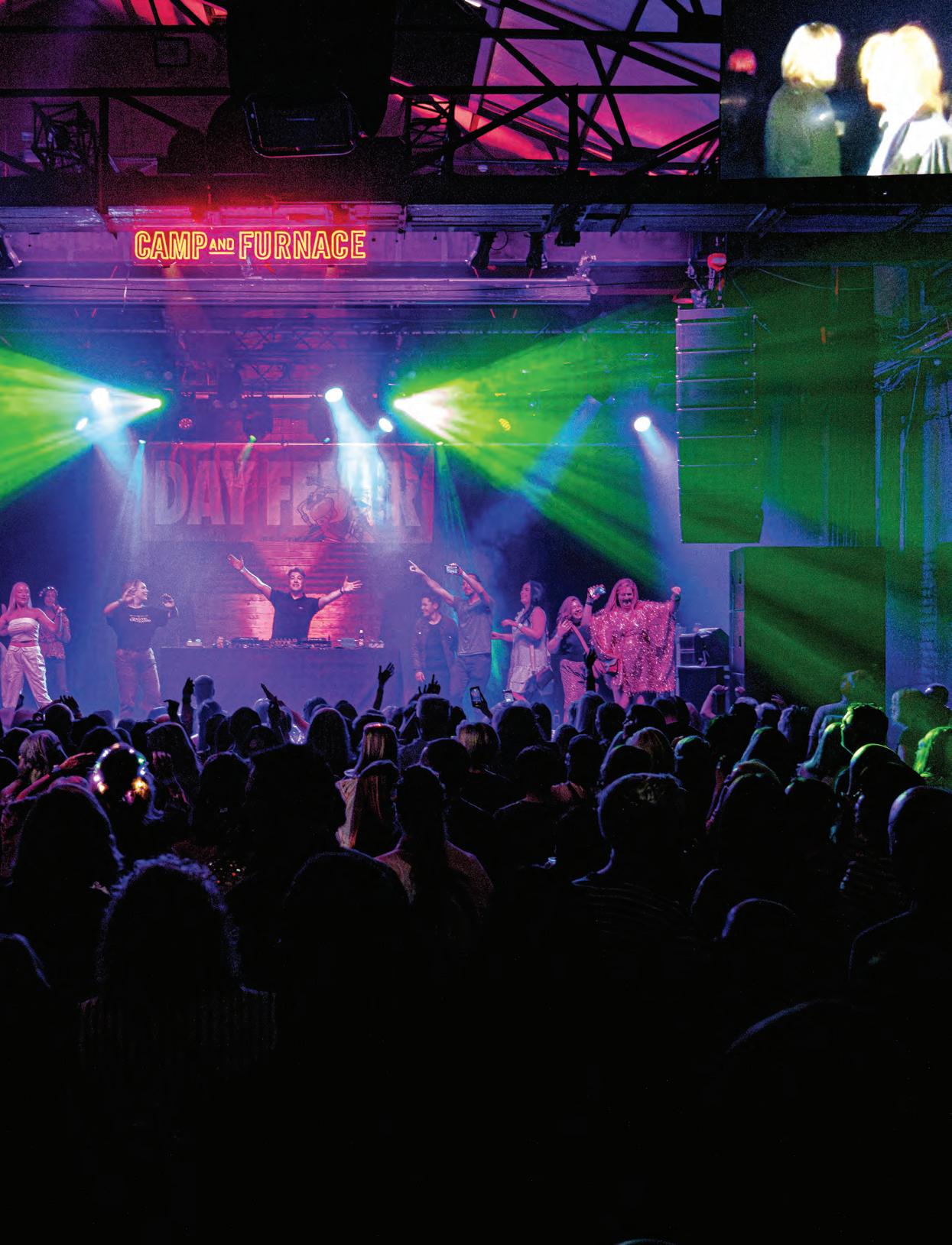
There’s a variety of factors. The youth are a lot more health conscious; if I was targeting young people, I’d rather own a gym than a nightclub. There’s the move towards online, there’s a cost-of-living crisis that shouldn’t be ignored.
It’s a perfect storm to send music venues and nightclubs into decline, and the daytime economy is in the ascendancy, by contrast.
If I go down to Sheffield city centre on a Saturday afternoon, the whole place is rammed – and not with people shopping, but with people eating food, drinking, going to Day Fever.
Day Fever is symptomatic of a wider shift in city centres away from retail and the nighttime economy, towards a more experiential, daytime thing.
How do traditional nightclubs feel about Day Fever?
They love it. We use a lot of their nightclubs at a time when it’s dead stock.
We went to see Denis Desmond and Andy Copping at Live Nation, because we have a deal to use a lot of their venues and we had a very candid conversation. I said, ‘Denis, we aim to fill those places that are sat empty during the daytime’ and it was music to their ears. They’re smart people and they’re tuned into the trends of where things are going.
We’re not the only ones; there are competitors and people offering different things during the daytime. We’re the canary in the coalmine; we were one of the first to cotton on to this daytime economy thing, but that’s the direction of travel.
And I find that exciting – in a place like Sheffield, where people see industrial decline and decay, I see opportunity. I’m looking around thinking, what other businesses can we do? The landscape out here is changing, but that doesn’t mean it’s dying.
Can anything be done to save traditional nightclubs?
Yeah, but you’ve got to engage. This is where city councils and the music industry go wrong – you’ve got to engage people who operate in the space between commerce and creativity.
I’m lucky that in the last five or six years, since I stopped being a nutcase, I’ve been able to seed into business, but also [find] creative solutions to things.
Sometimes, you get muggles trying to be magicians and it doesn’t work. We’ve only got one straight businessman in our crew, the rest of us are creatives. And it’s about engaging those people and saying, ‘What do you think we can do here? What works?’
The things that fail are where you’ve got councillors or politicians trying to inject culture into things. I grew up in 1980s Sheffield and I can’t begin to tell you what that was like: it was like the end of the earth. Steel’s gone, the pits have gone, and we’ve managed to replace that with culture.
Vicky McClure and Jonny Owen
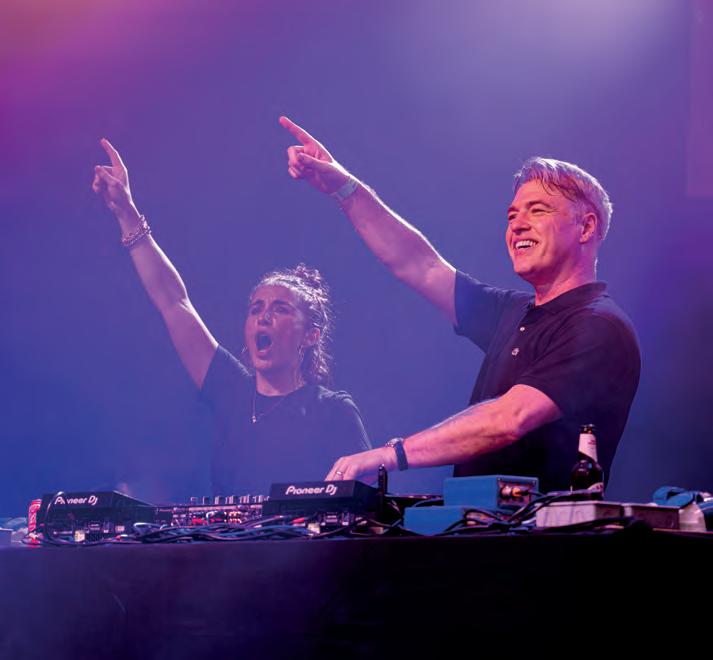
Culture is the thing that Sheffield does best – we’ve got Self Esteem, The Reytons, Pulp, Arctic Monkeys, Bring Me The Horizon… In that void where commerce and industry have fallen on their arse,
“I don’t want to be raging against the dying of the light; you’ve got to adapt.”
culture is like the weeds that grow around the margins. It’s about empowering people to enact their ideas.
The music industry is a very different place to when Reverend And The Makers started… It is different, but I don’t want to be one of those guys raging against the dying of the light; you’ve got to adapt. You’ve got
to learn and realise what your errors are. The amount of mistakes I make is small now; I used to make huge, catastrophic errors constantly.
If I was doing it now, I’d have a social media content creator in the band. Damon Albarn, when he left Blur the first time, he got Jamie Hewlett in [for Gorillaz] and, although social media content wasn’t really a thing at the time, Damon was early to the idea of, ‘If I make all this crazy, mad content, it’s like a calling card for my band’.
You still have these artists who think, ‘My music’s brilliant, so why aren’t I a megastar?’ That’s not how it works anymore. If a 17-year-old Bob Dylan comes around, a songwriting genius but awful at social media and painfully shy, you’re not going to get anywhere, whereas in the sixties you’d have been a megastar. The whole thing’s geared towards people who are gregarious, entrepreneurial and understand tech.
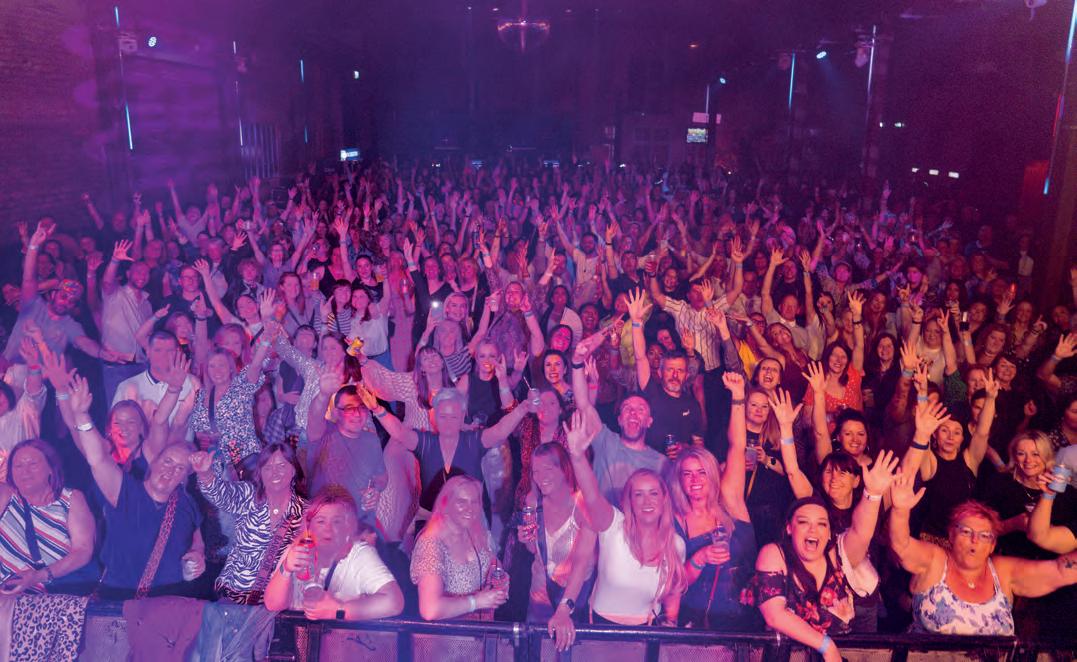
How do you feel about the shift to streaming?
The economy of scale is bad, and it does feel a little bit rapacious on behalf of the streaming platforms. But what you’re not going to do is put Pandora back in the box. Governments have to legislate against this stuff – there’s only so many battles you can fight.
I have a contrary view on AI. Everybody’s like, ‘Ban it, ban it’. But when did rock’n’roll and the counterculture become the voice of banning things? It’s a really weird space to be in as a creative. We used to be the thing that got banned, not did the banning!
Robert [Del Naja] from Massive Attack said we should think of AI less as something that’s come to replace us, and more as the fifth Beatle. We should use it as a tool rather than a scary ‘robots have come to replace us’ thing.
I know some of my musical contemporaries would think I was a heathen and a sellout for saying that, but I
wonder if AI, by having some sort of happy accident, would help reinvent some sort of musical future, because there are only so many notes and beats.
What I would hope to happen is a Giorgio Moroder-style, ‘We’ve accidentally created techno’ – maybe the AI algorithm will glitch and do something we’ve never heard before. That could be really exciting.
How do you look back at the Noughties scene?
It was wonderful. But a lot of those bands have either given up making records or are making bad rehashes of their debut. I don’t think that’s the way forward.
If you go back, Day Fever being an example of that, you’ve got to do it in a different way. My thing has always been to relentlessly go forward and, now I’m sober and focused on the business, my last two records are up there with the best I’ve ever made.
I know Alex [Turner] takes a lot of pelters for changing the style of the Arctic Monkeys’ records, but I really respect him
for that. There’s something to be said for following your nous, being an artist and going forwards. But also there’s loads of up-and-coming stuff that’s super-cool and maybe doesn’t enjoy the popularity because everything’s become so atomised now.
We used to have the monoculture, which was Top Of The Pops, Radio 1, the NME –those were the three pipelines and if wasn’t in there, it wasn’t a thing. And [the] Oasis [reunion tour] is people almost yearning for the monoculture and shared experience.
There are very few things that do that now because we live in divisive times but, if there’s an artist out there who can summon up some of that spirit, they’ll do bloody well.
Where do you want Day Fever to be in five years’ time?
Still making people happy! A woman said to me, ‘I used to only see my mates at weddings and funerals. Now every month I buy a frock, meet all my pals and we go dancing’. It doesn’t have to be any more complex than that. n
Numbers you need to know 5
From Tencent Music’s ‘Super VIP’ subscriber milestone to K-pop touring triumphs and megahit streaming records, here are five numbers from Q3 that you need to know about the global music business...
466.3%: JYP Entertainment’s operating profit surge.
In August, JYP Entertainment, the K-pop agency behind Stray Kids, TWICE, and DAY6, reported blockbuster quarterly earnings for Q2 (the three months ended June 30). The company posted operating profit of KRW 52.9 billion ($37.7 million), up by a whopping 466.3% YoY in the quarter. Meanwhile, revenue soared 125.5% YoY to KRW 215.8 billion ($154 million). A major part of that growth came from the company’s concert segment, which saw revenues grow 342% YoY to KRW 62.0 billion ($44.2 million). JYP singled out
Stray Kids’ recently completed world tour as a major contributor to that number. The group performed 54 shows in 23 cities across Asia, Oceania, Latin America, North America and Europe. According to Live Nation, Stray Kids’ Dominate World Tour became the highestgrossing and best-selling tour ever by a K-pop act in North America, Latin America and Europe. The tours by JYP artists also boosted the company’s merch sales, which jumped 355.9% YoY to KRW 66.9 billion ($47.7 million).
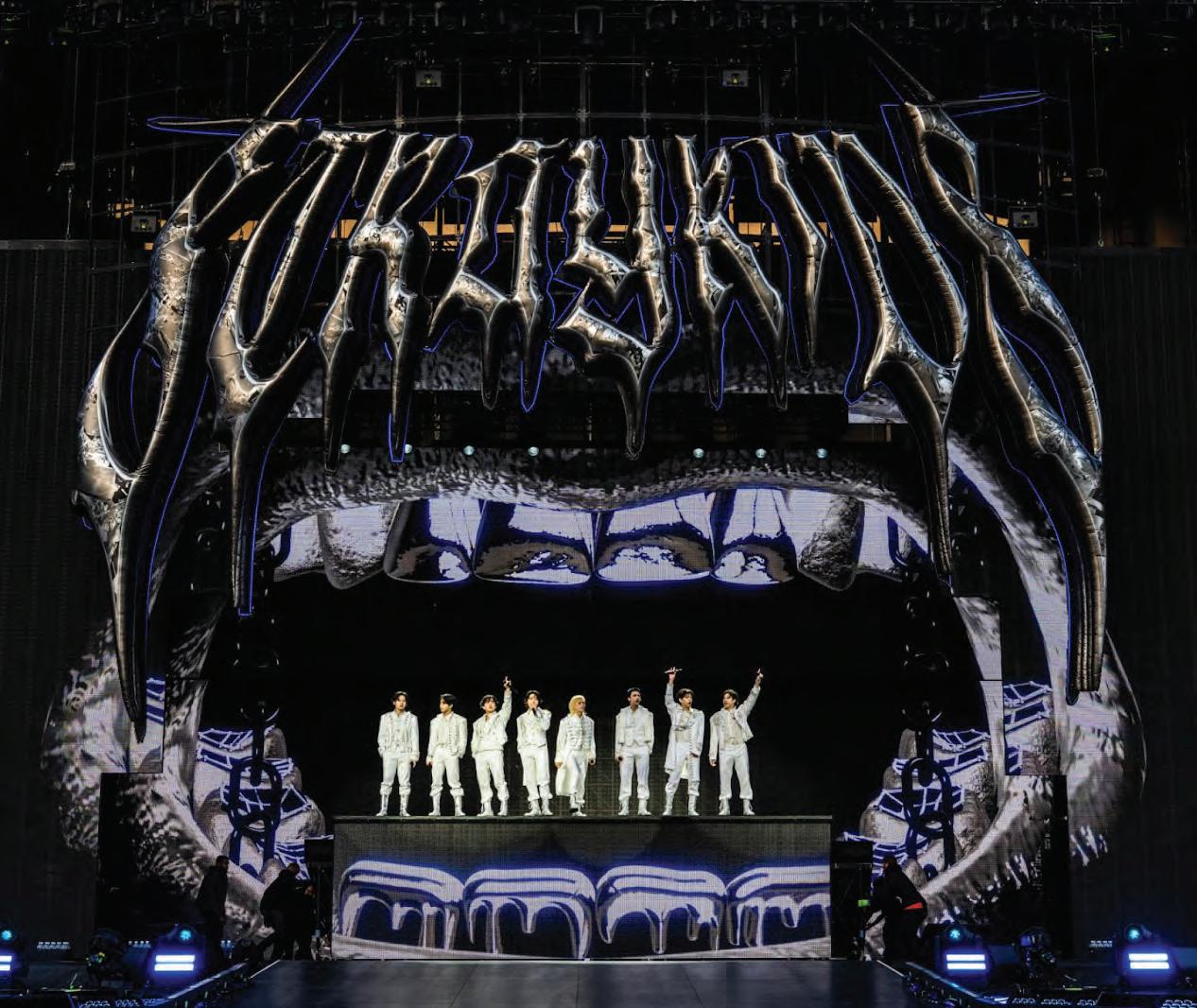
200 million: TikTok’s
European userbase.
In September, ByteDanceowned social media platform TikTok revealed that it had hit a significant milestone in Europe, reaching more than 200 million monthly users in the region. That’s up from 175 million people last year, and approaching a third of the population of the continent across the EEA and UK, the company noted. According to TikTok, 32 countries are included in this ‘Monthly Active Recipients (MAR) figure’ of 200 million users. They include: Austria, Belgium, Bulgaria, Croatia, Cyprus, Czech Republic, Denmark, Estonia, Finland, France, Germany, Greece, Hungary, Iceland, Ireland, Italy, Latvia, Liechtenstein, Lithuania, Luxembourg, Malta, Netherlands,
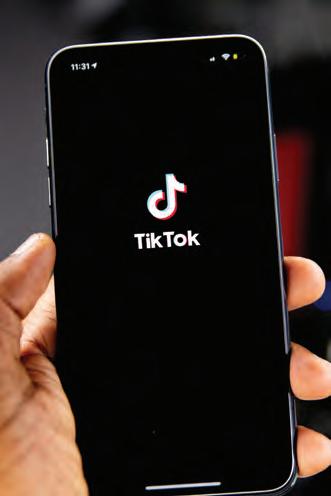
15 Million:

Norway, Poland, Portugal, Romania, Slovakia, Slovenia, Spain, Sweden, Switzerland and the UK.
“Our European community goes from strength-to-strength, with more than 200 million people now regularly coming to TikTok to be entertained, learn new hobbies or skills and make a living,” said Marlene Masure, General Manager, Content Operations, for EMEA. “As our community grows, so does the economic, cultural and societal impact that TikTok adds to Europe’s rich ecosystem. From bringing the arts to new audiences, to inspiring a new generation of readers and seeing small businesses flourish and create growth and jobs, TikTok has helped contribute positively to so many stories.”
China-based music streaming company Tencent Music
Entertainment revealed in August that its higher-priced ‘Super VIP’ (SVIP) membership programme surpassed 15 million subscribers as of the end of Q2. This means that around 12% of TME’s total 124.4 million streaming music subscribers as of the end of the second quarter were on the SVIP tier, compared to 8% as recently as September 2024. TME SVIP subscribers pay approximately RMB 40 ($5.58) per month compared to the standard RMB 8 ($1.12) subscription, meaning these premium users generate five times the revenue of regular subscribers. Premium sound quality “remains the most popular SVIP membership benefit,” said TME, while “artist-centric privileges have become increasingly effective at boosting SVIP adoptions.” In Q2, these privileges included: (i) exclusive/timedexclusive digital albums with standout releases like Hold Me Close by JJ Lin & A-Lin and Pleasure by Jolin Cai; (ii) priority access to concert tickets for in-demand events by G-Dragon and BLACKPINK; and (iii) a collectible ‘star card’ series in collaboration with artists such as JC-T, Silence Wang and aespa.
5 billion:
The Weeknd’s Blinding Lights smashes Spotify record.
The Weeknd’s synth-pop megahit Blinding Lights shattered a major streaming record in August. Spotify confirmed that the song became the first on its platform to cross the five billion streams mark, achieving the feat as of August 31. The latest milestone arrived over a year after Blinding Lights made history by becoming the first to hit four billion streams on the platform. Blinding Lights is the second single from The Weeknd’s fourth studio album, After Hours. Following its November 2019 release, the track dominated the Billboard Hot 100 chart for four straight weeks. It was the first song to stay in the chart’s Top 10 for an entire year. Swedish musicians Max Martin and Oscar Holter co-produced the song alongside The Weeknd and Canadian musicians Belly and DaHeala. At the time of writing, the official music video for Blinding Lights on YouTube has garnered 964 million views since it premiered in January 2020.
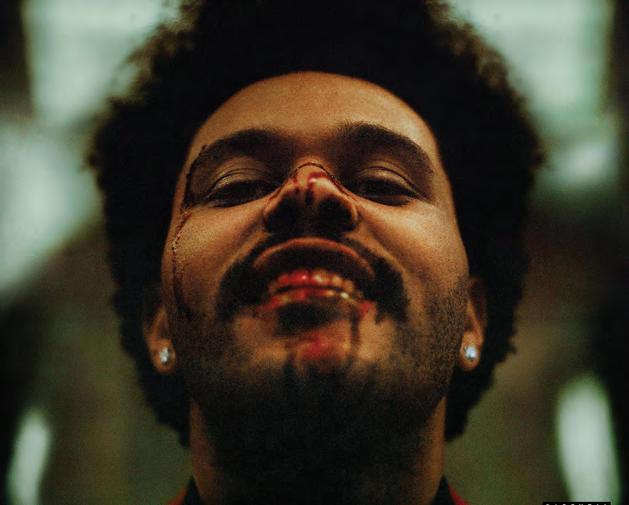
19%:
Live Nation Entertainment’s Concerts segment generated $5.946 billion in the three months ending June 30, up 19% YoY – representing its highest Q2 revenue on record. What made the company’s Q2 revenue growth especially impressive, however, was that Live Nation actually promoted fewer events overall in the period versus Q2 2024, signalling a strategic shift towards larger, higher-value events outside North America. SEC filings showed that Live Nation’s Concerts division promoted 14,292 events globally in the three months to end of June – down from 14,678 in the same quarter last year. Yet despite fewer total shows, global attendance at Live Nation concerts surged 14% YoY to 44.1 million fans in Q2.
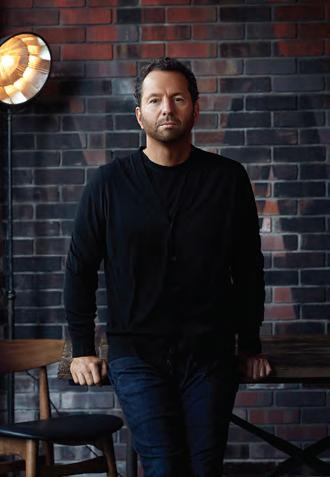
Internationally (ex-North America), attendance exploded, up 33% YoY to 20.9 million. Tellingly, global stadium attendance of Live Nation shows tripled YoY, while attendance of international concerts at arenas increased 20% YoY. Discussing the Q2 results on August 8, Live Nation President & CEO, Michael Rapino, maintained his outlook that 2025 will be a “historic year for live music”. Said Rapino: “Global expansion continues to drive touring growth, with fan attendance hitting new highs and ticket buying strong at every price point from VIP to the back row. To meet this momentum, we’re expanding our global venue portfolio and investing in the artists who make it all possible.”
‘SETLIST REPORTING ISN’T AN OPTIONAL EXTRA – IT’S A FUNDAMENTAL PART OF THE LIVE MUSIC ECONOMY’
Crispin Hunt, President of the PRS Members’ Council, says that submitting a setlist for every gig should be as standard as a soundcheck – and argues that it is a collective responsibility…
With summer and the festival season now drawn to a close, we have once again seen that the appetite for live music is greater than ever.
The LIVE Annual Report, using our setlist data, shows there was one gig every 137 seconds across the UK in 2024. In the same year, PRS for Music paid out 20% more in live royalties, the strongest growth we’ve seen in years, led mostly by large stadium and arena tours. A massive £68.5m was paid to more than 39,000 songwriters whose works were performed live.
We’re hugely proud of this. We want to ensure that every creator is being paid their royalties as quickly and as accurately as possible, reinforcing our long-term commitment to greater transparency.
But we know there is also an opportunity to do more. There are still unclaimed royalties that we need to get to the songwriters who have earned them. Some are still waiting on royalties not because the performances didn’t happen, or because the music wasn’t loved by an audience, but because the most basic step in the process was never completed: too many setlists are simply not being submitted.
I’ve spent enough time in this business to know that paperwork is never seen as the glamorous part of music. The magic happens on stage, in the studio, and in the moments where a song connects with someone for the first time. But the reality is this: every setlist is a financial record. It is the mechanism that turns a live performance into a royalty payment.
We have a duty to provide the education and the tools to make setlist reporting easy, that’s why we’ve created AI tools that automatically turn photos of handwritten setlists – which are

“I’ve spent enough time in this business to know that paperwork is not the glamorous part.”
a common submission – into readable text.
That’s why we communicate to members time and time again, reminding them of distribution dates and encouraging them to submit their information.
However, here’s the point I want to say plainly and publicly: the responsibility for sourcing this missing element cannot sit with PRS or its members alone.
There needs to be a culture shift. While the obligation to report setlists ultimately lies with venues and festivals, promoters, managers, agents and the artists themselves all have their part to play in ensuring the accuracy of these setlists.
The same professionalism that ensures the lights go up on time, the sound is checked, the box office is reconciled, and the crew are paid should extend to making sure the setlist is submitted. If the soundcheck is non-negotiable, submitting the setlist should be too.
There’s a persistent myth in some corners of the industry that PRS withholds money – that if a setlist goes missing, the royalties just sit somewhere unclaimed. Let’s be clear: all Tariff LP (Live Performance) royalties are paid out. PRS does not withhold money from songwriters and performers.
Here’s how it works: PRS collects licence fees from venues and promoters under the Tariff LP for the performance of music at concerts and festivals. We pay out that money to PRS members and rights-holders four times a year, based on the performance data we have.
If a setlist has been submitted for a show, we know exactly what was played and can allocate royalties directly to the right songwriters and
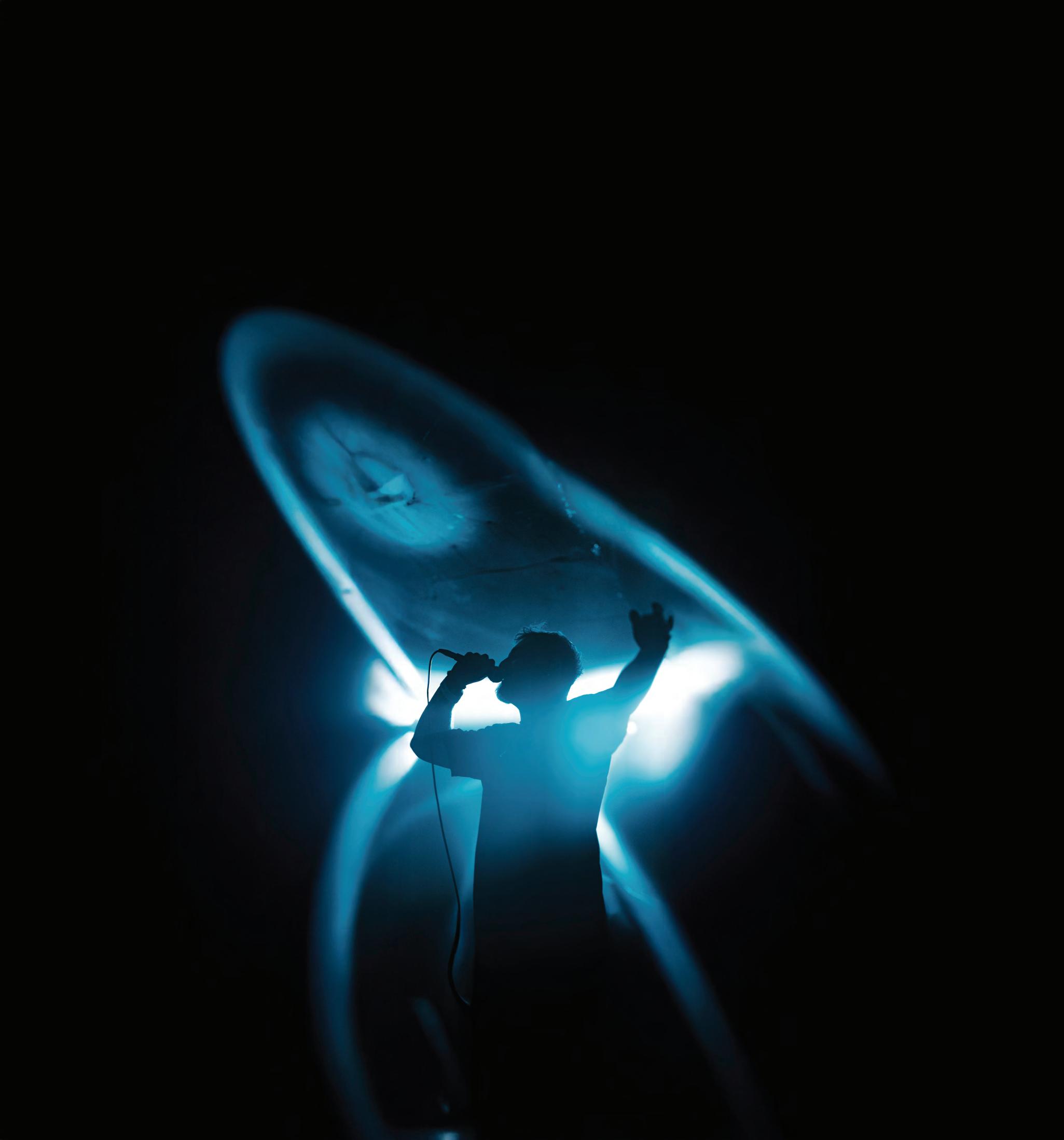
Live music is a collective experience, driven by collective e ort.
Live royalties flowing to songwriters powers careers.
their publishers. If you ask some artists, they’ll know that sometimes it’s even members of the PRS team, running around venues and festivals collecting setlists themselves.
If no setlist is submitted, we can’t include that performance in the allocation – we don’t know who to pay because we don’t know what music was played. Any unallocated revenue is paid out every year, proportionately, to the creators whose works were reported from other live performances that year.
If your performance data (setlist) isn’t submitted, you won’t see your royalty share this time around. The good news is that under Tariff LP, you have three years to submit a setlist for a past performance (seven years for classical music). So, if you realise you’ve missed out, there’s still time to put it right and get paid.
At PRS, we’ve invested heavily in making the process as seamless as possible. You can file a setlist from your phone backstage or from your laptop over breakfast the next morning. We’ve embedded the tools into member portals, improved the user experience, and made the reporting process quicker.
Our next few months will be dedicated to launching more educational initiatives, partnering with promoters to prompt submissions at the right moment and taking the message to venues, conferences and rehearsal rooms. But technology and education will only get us so far if we don’t also change the culture.
That cultural change starts with recognising that setlist reporting isn’t an optional extra – it’s a fundamental part of the live music economy. If you care about creators being paid, it should be as much a part of your routine as loading in your gear.
And for the industry, it should be built into every contract, every promoter agreement, every standard operating procedure. Our live tariffs even offer incentives for those who provide setlists. The truth is, we can’t pay what we can’t see.
I’ve seen first-hand the difference it makes when the system works. There’s the emerging songwriter who played a handful of support slots at small theatres and received a live performance royalty payment that helped invest in their next work or went towards the costs to hire a studio.
There’s the veteran writer who co-wrote a track a decade ago and still receives payments
“What we need is the will to embed setlist reporting into the DNA of live music.”
because younger artists are covering the song on tour. Every single one of those performances was captured in a setlist. These aren’t abstract transactions; they’re moments where the system proves its worth, where the rights of creators are respected in a tangible way.
I’ve also seen the flipside: the performance that’s never recorded, the missing setlist that means the money hasn’t flowed through yet. This is where the mistrust starts to creep in. When people don’t understand why they haven’t been paid, myths fill the gaps and confidence in the system is undermined. We must tackle that head-on, with facts, transparency, and a collective, industry-wide commitment to do better.
It’s time to reframe the conversation. Live royalties are not a mysterious process that happens behind closed doors, delivered by bots. They’re the result of a chain of actions, from the writing, then performance of a work, the licensing of the venue and prompt payment of the invoice, to the setlist submission and the payment of royalties to the songwriters. Every link in that chain matters.
The solution lies in shared responsibility. Promoters should make setlist submission a standard part of their settlement process. Venues should provide a clear and easy way for performers to submit before they leave the building. And artists, whether playing The O2 arena or the back room of a pub, must see providing the venue with a setlist as part of their professional practice.
The live music sector is one of the most collaborative parts of our industry – it works because everyone pulls in the same direction to make the show happen.
Paying songwriters for that performance should be no different, and our collective priority should be making sure the people who create the music that fills our venues are recognised and rewarded.
What we need is the will to embed setlist reporting into the DNA of live music. Live music is a collective triumph and paying the people whose songs the audience come to sing along to should be celebrated too.
The gap between the two is smaller than you might think — sometimes, it’s as small as a single unfiled setlist. Let’s build a live music economy that works for everyone.
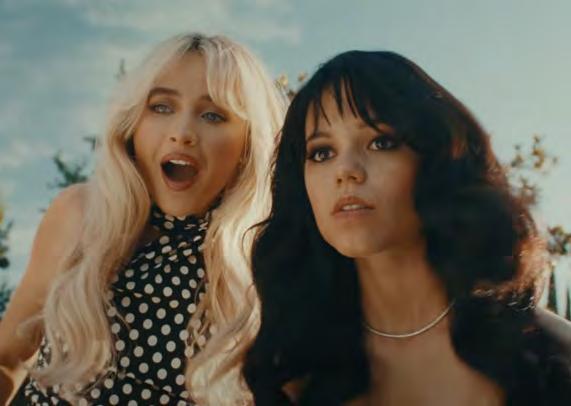

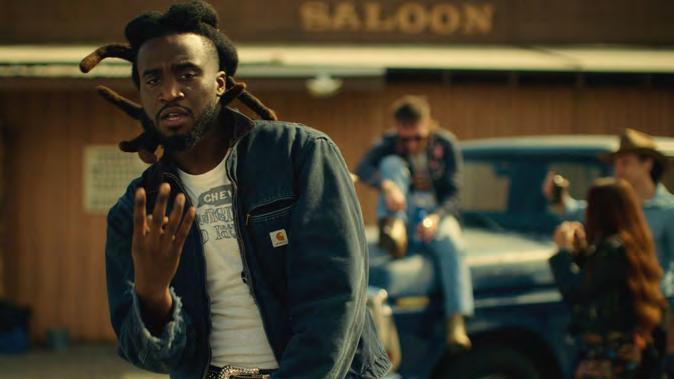
Take a look at Vevo for Artists
‘METADATA IS THE INDUSTRY’S WEAK SPOT; IN THE AGE OF AI,
THE COST OF HALFMEASURES IS FAR HIGHER’
AI might be sending seismic tremors through the music industry, but, says Sammy Andrews, it is also exposing some pretty severe fault lines that already existed…
Not a day goes by without me having several conversations about AI in music.
I recently travelled to the (most excellent) Bogotá Music Market in Colombia and was fascinated to hear in person the global conversations, whilst being acutely aware of the, at times, hyperlocal potential legislation.
You can be sure that no matter where you are in the world, managers, labels, DSPs, publishers, artists, songwriters, marketers, finance teams and societies all have views, but increasingly they are rarely aligned in an impactful way.
Some see AI as a genuinely useful creative and operational tool. Others see it as a siphon on royalties and rights. Both perspectives have merit.
The challenge for the industry worldwide right now is to move beyond competing opinions and start building systems that actually work, whilst not stifling governments’ tech potential for their nations.
The first step is to abandon the false blackand-white narrative and look more carefully and considerately at how AI is actually used. When it assists in a human-led production, generating stems, cleaning up a vocal, or handling mastering, authorship remains human.
The questions then become about inputs and disclosure: Were likeness rights cleared? Was the training data lawfully sourced? Was the AI’s role declared?
Some platforms have already made this mandatory. YouTube requires creators to flag realistic synthetic content. TikTok has started embedding content credentials that travel with audio. Meta labels synthetic media across its services. Disclosure is no longer a matter of branding; it has become compliance.
Fully AI-native output is a different matter. In the US, works without human authorship are not copyrightable, which removes statutory royalties
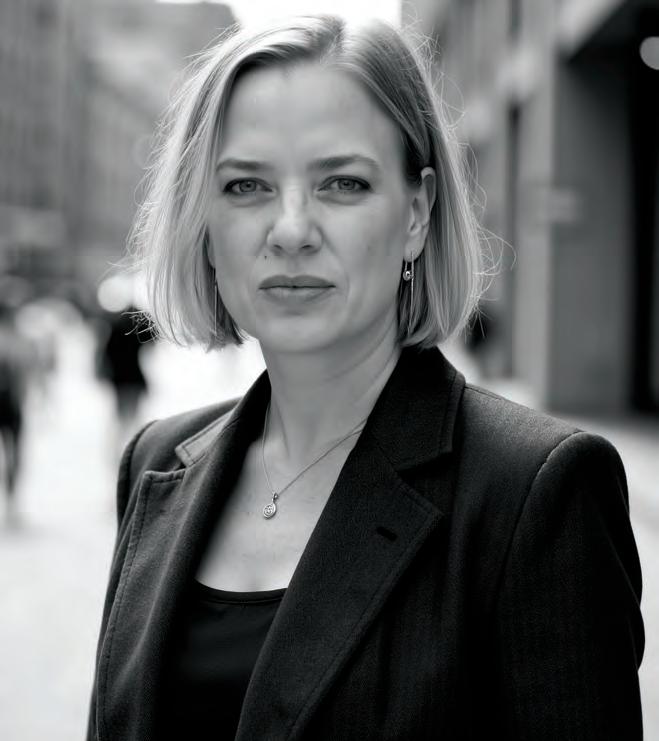
and exclusivity. Rights can only be claimed through contracts, trademarks, or platform terms.
China has recognised some AI outputs where human input is deemed creative, while simultaneously imposing binding labelling rules on developers and distributors.
The UK still clings to an outdated “computergenerated works” clause that does little to address today’s realities.
Japan and Singapore permit broad text-anddata-mining exceptions for training, but they remain unclear on how outputs are treated.
The result is a patchwork of legal regimes in which the same track may be protected in one country and fall into the public domain in another.
DSPs are responding, but painfully slowly. One of the largest has removed tens of millions of tracks over the past year for suspected fraud or manipulation. It is now preparing stricter rules on impersonation, spam filters to choke off mass duplicate uploads, and AI disclosures carried through DDEX metadata.
These steps recognise the scale of the problem, but their effectiveness will depend entirely on execution. Filters must block manipulation without penalising legitimate artists, and disclosures must travel consistently across the chain. Without that, the appearance of progress risks becoming little more than window dressing.
The more complicated and unresolved issue is what counts as “human enough.” A rapper over AI-generated beats, a band using AI for mixing, a vocal polished with generative tools; each involves different levels of machine input.
Right now, there is no universally or even nationally accepted threshold. Leaving platforms to define this independently risks a fragmented environment where rules shift from service to service. What the industry needs is a shared framework, developed with rights-holders, creators, and regulators, that can be applied consistently across societies, DSPs, and licensing.
Verification is another weak link. PRS has introduced “know your customer” checks, but most distributors have not. Without consistent onboarding standards, fraudulent actors can migrate freely between services.
Preferred-partner schemes and verification marks look credible but mean little without genuine due diligence and consequences for those that enable spam.
This weakness helps explain why Deezer now reports over 30,000 fully AI-generated tracks every single day, almost a third of all new uploads, with up to 70% of streams of those flagged tracks identified as fraudulent.
Those uploads don’t just clutter platforms, they distort royalty pools. Other services have remained quiet, and that lack of transparency is itself a problem. If streams are being siphoned, rightsholders need to know the scale in order to conduct business accordingly.

“AI is global, but the systems for governing it are fragmented.”
The impact is not confined to Europe or North America. In Latin America, musicians are protesting against what they describe as an AI flood, complaining that their catalogues are being buried under synthetic tracks on Spotify, Deezer, and YouTube Music.
Beyond royalties, they are facing impersonation and the erosion of visibility. The lesson is obvious: AI is global, but the systems for governing it are fragmented, and artists in developing markets often face the sharpest edge of the disruption.
Metadata offers some partial answers. ISRC remains process-neutral and should not, in my opinion, be split into “human” and “AI” codes, but it does not capture provenance. DDEX has attempted to address this with ERN v4.3.1, which introduces optional flags to show when a recording or contribution was made fully or partly with generative AI.
This integrates disclosure into the same supply chain that already governs release data, rights and pricing. On the content side, C2PA credentials allow provenance to be embedded in audio files, while ISCC creates fingerprints that help detect duplicates and manage fraud.
These are useful tools, but they are incomplete. The DDEX fields are optional, they don’t require disclosure of the specific model or vendor, and they leave the term “partially” undefined.
Some momentum is building. Universal Music Group and Beggars Group have committed to using these standards, and distributors are starting to follow. In May this year, SonoSuite upgraded its Spotify feeds to ERN 4.3 as part of its Preferred Provider status. In June, Revelator did the same.
Implementation is beginning but, until adoption is universal, the benefits will remain limited. Metadata has always been the industry’s weak spot; in the age of AI the cost of halfmeasures is far higher.
Policy responses diverge. The EU’s AI Act is now in force, with transparency obligations to be fleshed out through delegated acts later this year.
The US Copyright Office has held firm on human authorship, while lawsuits against AI developers pile up, creating settlements that provide partial guardrails but little true clarity.
The UK has floated a training exception with a rights-holder opt-out, but without mandatory dataset transparency the opt-out is effectively unenforceable.
Resistance is building. In September, the Musicians’ Union passed a motion at the Trades Union Congress demanding an AI bill with stronger copyright protections and fair remuneration for creators.
China has already imposed binding rules requiring both visible and embedded labelling of synthetic content. WIPO, despite years of consultation, has failed to deliver enforceable standards.
Meanwhile, courts across the US and Europe are still wrestling with the fundamental question: is training on copyrighted works without consent an infringement, or not?
Licensing training data remains the structural gap. One-to-one deals cannot scale. Collective licensing is the only workable model, yet most societies have hesitated and left publishers to litigate and labels to strike bilateral agreements.
Sweden’s STIM has broken ground with a collective AI licence for creators who opt in,
“Before anyone rushes to legislate or rewrite contracts, the industry should ask whether it is ready to throw stones from glass houses.”
requiring attribution technology such as Sureel to track how works influence outputs and making revenue flows auditable in real time. It may become a blueprint for others.
At the same time, the arrival of enterprisefocused models like Stability AI’s Stable Audio 2.5 shows that robust licensing frameworks are not a theoretical need, but a commercial necessity.
It is worth remembering that AI is not only a disruptor, it is also being used to fix the industry’s existing weaknesses. BMG, working with Google Cloud, has launched StreamSight, a tool designed to accelerate royalty forecasting and make payment processes more transparent.
This illustrates the double edge of AI: the same technology that threatens to swamp the system is also being deployed to modernise it.
AI is now part of music creation. Sometimes it is a studio tool, sometimes a collaborator, sometimes the principal composer. The task is not to reject it but to integrate it into systems that protect attribution and value. That requires clear disclosure, stronger verification, effective fraud control and scalable licensing.
The real risk is not that AI overwhelms the industry. The real risk is that the systems underpinning recorded music remain fragmented. Standards exist but are inconsistently applied. Laws are advancing but not aligned. Platforms are taking action but are still reluctant to publish the data that would prove effectiveness.
And before anyone rushes to legislate, label, or rewrite contracts, the industry should ask whether it is ready to throw stones from glass houses. Catalogues are already riddled with inconsistent metadata, missing credits, and in some cases tracks that carry AI fingerprints no one has admitted to – and in places I suspect legislation would disproportionately impact some genres, such as electronic.
Companies like Uhmbrella are now offering the ability to audit entire catalogues, scanning recordings for AI involvement, metadata gaps, or unlabelled generative content. If labels, publishers and distributors do not first clean their own shelves, they risk building new rules on shaky ground.
Trying to impose order while ignoring what is already in the system is an invitation to misallocated royalties, hidden liabilities and unnecessary fights with artists.
Unless those gaps are confronted head-on, confidence in streaming will weaken further, and AI will continue to expose just how fragile the foundations of this industry already were.
